Gallery (Click on titles!)
-
Lurgashall walk on 18th January 2023
The 5.3 mile walk was led by Sally with expert pre walk preparation from Lurgashall. The name Lurgashall means Hall of Leotegar. Leotegar was a Saxon who settled on the site in around 495 AD. His descendants built St Laurence’s Church, which is beside where we started the walk. There had been a heavy frost during the night with all walkers prepared for some good scenery and the odd bit of impromptu skating. Starting at The Noah’s Ark Inn, which is said to have acquired its unusual name because patrons crossing the pond outside the door gave the impression of animals crossing into the Ark. The pond is long gone so we walked on terra firma across the green, past the village shop and down Mill Lane when we took a short cut across some meadows. This meadow was the site of our first synchronised slips, but both participants bravely returned to the fray. Returning to Mill Lane, a right turn took us to Mill Pond where we were impressed by the ducks swimming around the ice, and a natural ice stalactite sculpture. At Mill Farm we crossed fields towards Lickfold but turned north west before we got there so we could see if The Three Horse Shoes (aka The Lickfold Inn) would tempt us to stop. It was too early to succumb so we skated across the ice on the road on Lickfold Road. A left turn took us east across fields, woods and across a stream eventually arriving at Hoewyck Farm and onto the Lickfold Road again where Kathryn demonstrated her Dancing on Ice moves with a terrific recovery. We stopped for a coffee break at a thoughtfully placed bench and table on Upperfold Farm where the generous owner had given Sally her permission to stop there. After coffee we headed north east across meadows, through woods, across streams to the edge of The Blackdown Estate down to Jobsons Lane by the site of what had been the Lurgashall Winery. We stopped and talked with a local tree surgeon and wood sculptor who was sculpting a family crest by eye out of an old ash tree stump. Heading west across Windfallwood Common we turned south through Spring Coppice to view the spire of St Laurence’s Church and into The Noah’s Ark for a well earned and delicious lunch and banter.
.png)
All checks complete, and we’re off
.png)
Enjoying the sunshine and frost
.png)
Crossing the meadow
.png)
So this is the mounting block but where is the horse?
.png)
The intrepid team
.png)
Swimming around the ice.
.png)
The ice sculpture Sally prepared earlier for us
.png)
Clear blue sunny sky and hard frost
.png)
OK, we're going that way
.png)
Walk on the edge or break the ice?
.png)
Dancing on Ice, and now for the triple somersault
.png)
Coffee break
.png)
It’s easier getting on a horse I can assure you
.png)
The home straight with St Laurence’s spire over the apple orchard
.png)
Lunch at The Noah’s Ark
.png)
About 5.3 miles
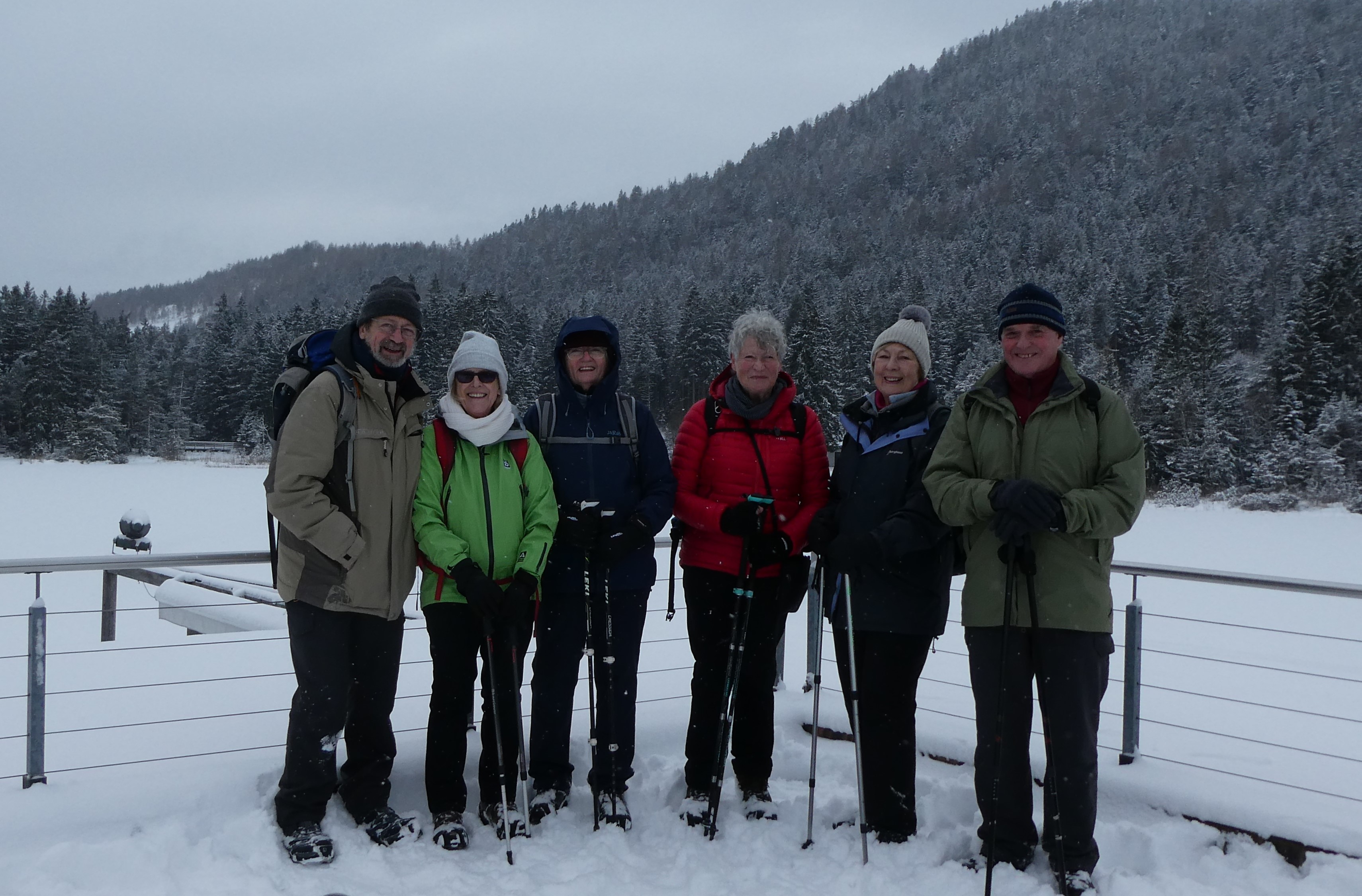
Unfortunately some walkers were unable to get to the Noah's Ark in time.
Stedham walk on 11th January 2023
The year has certainly got off to a wet start. Pauline's walk was mostly on sandy terrain but that didn't mean we didn't have to do some puddle jumping. After meeting in Stedham at the Hamilton Arms we set off to cross the A272 to reach Stedham Commom where we joined the Serpent Trail for a short distance. We left the Serpent trail where it crosses a Roman Road - however, the lack of chariots meant we were quite oblivious to this piece of history. Fitzhall Heath and Plantation were followed by Fitzhall itself, which consists of 2 or 3 cottages in amongst some farmland. Shortly after we passed the remains of a giant sandpit, not visible at all but in any case we were busy navigating a long stretch of waterlogged path, fortunately bordered by some dense rhododendron with dry tunnels amongst the foliage. Our route then meandered through the Severals before crossing the A272 once again and then onto the Polo Field constructed by Kerry Packer. Through the village and we were once again at the Hamilton Arms where we enjoyed some very good Thai food.
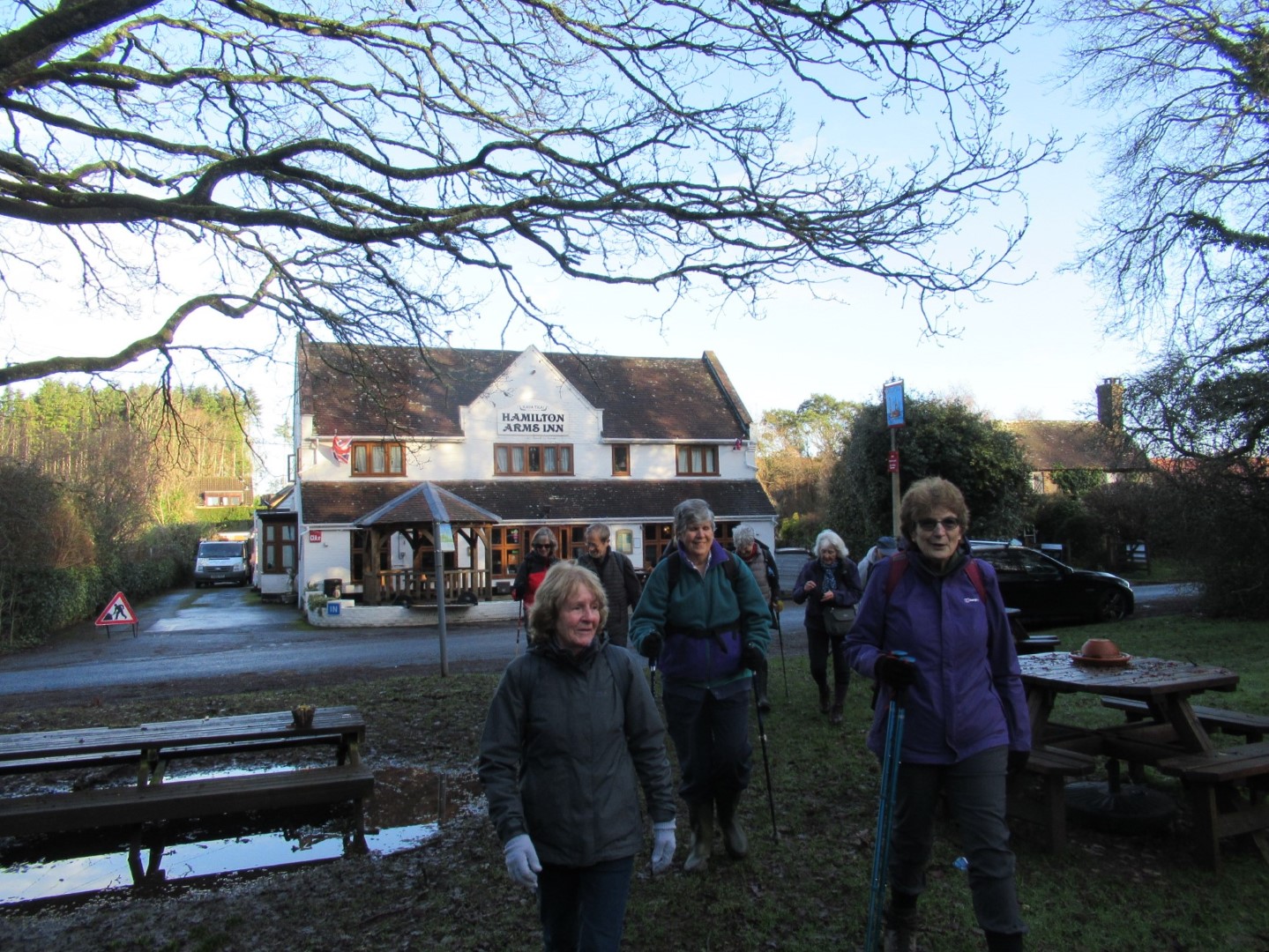
Setting out
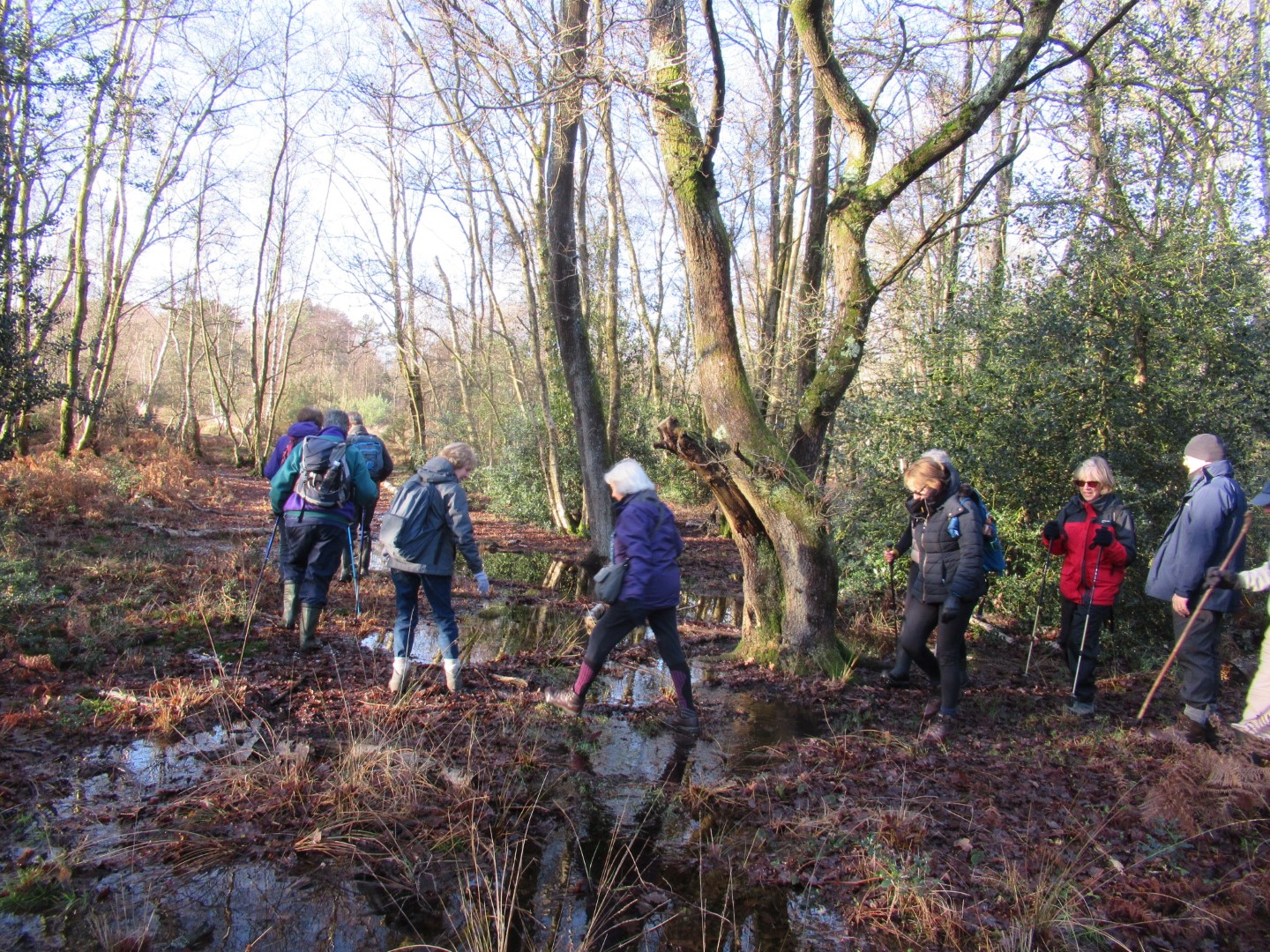
Stedham Common proved challenging in places
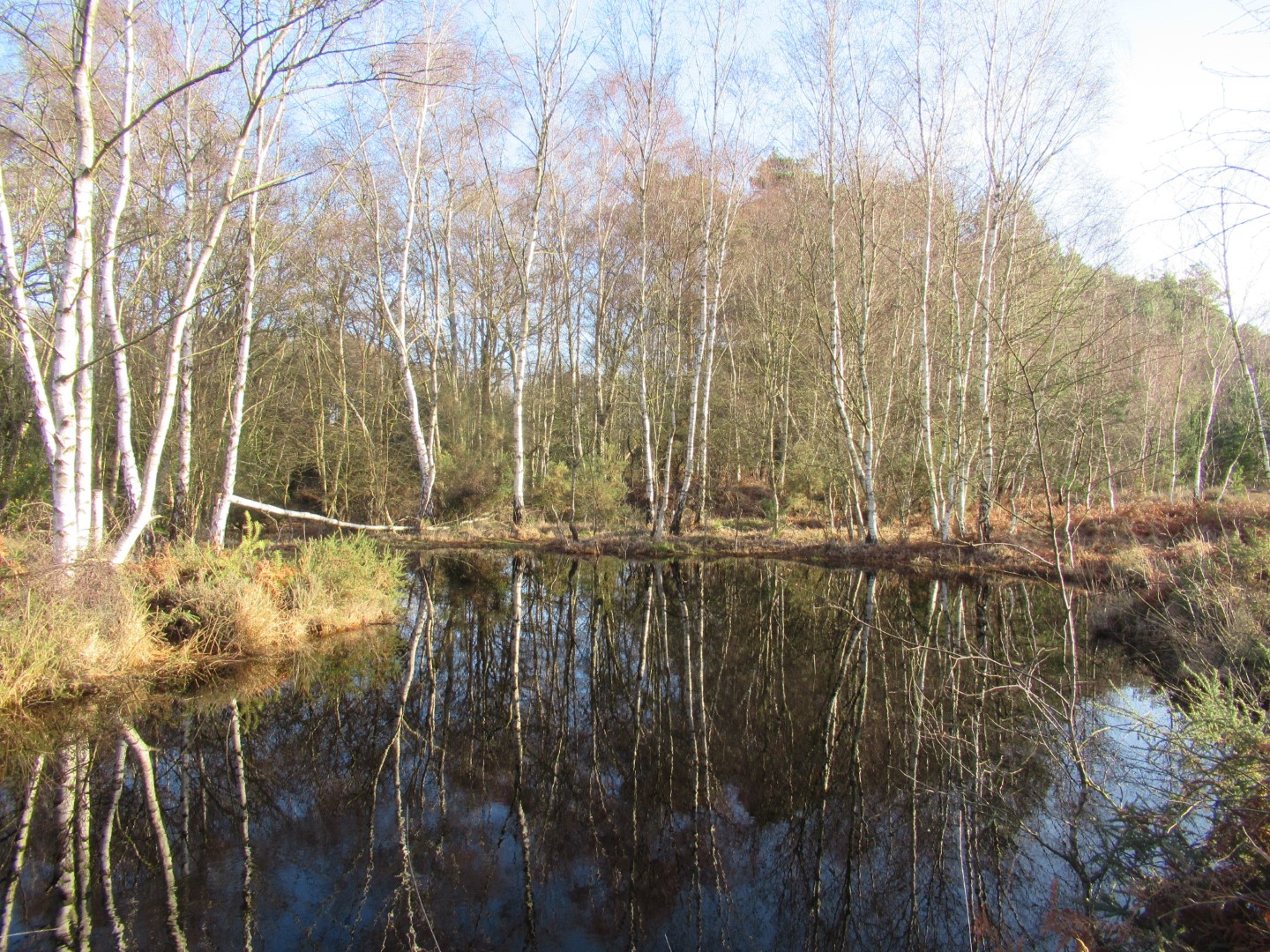
Luckily this wasn't the path
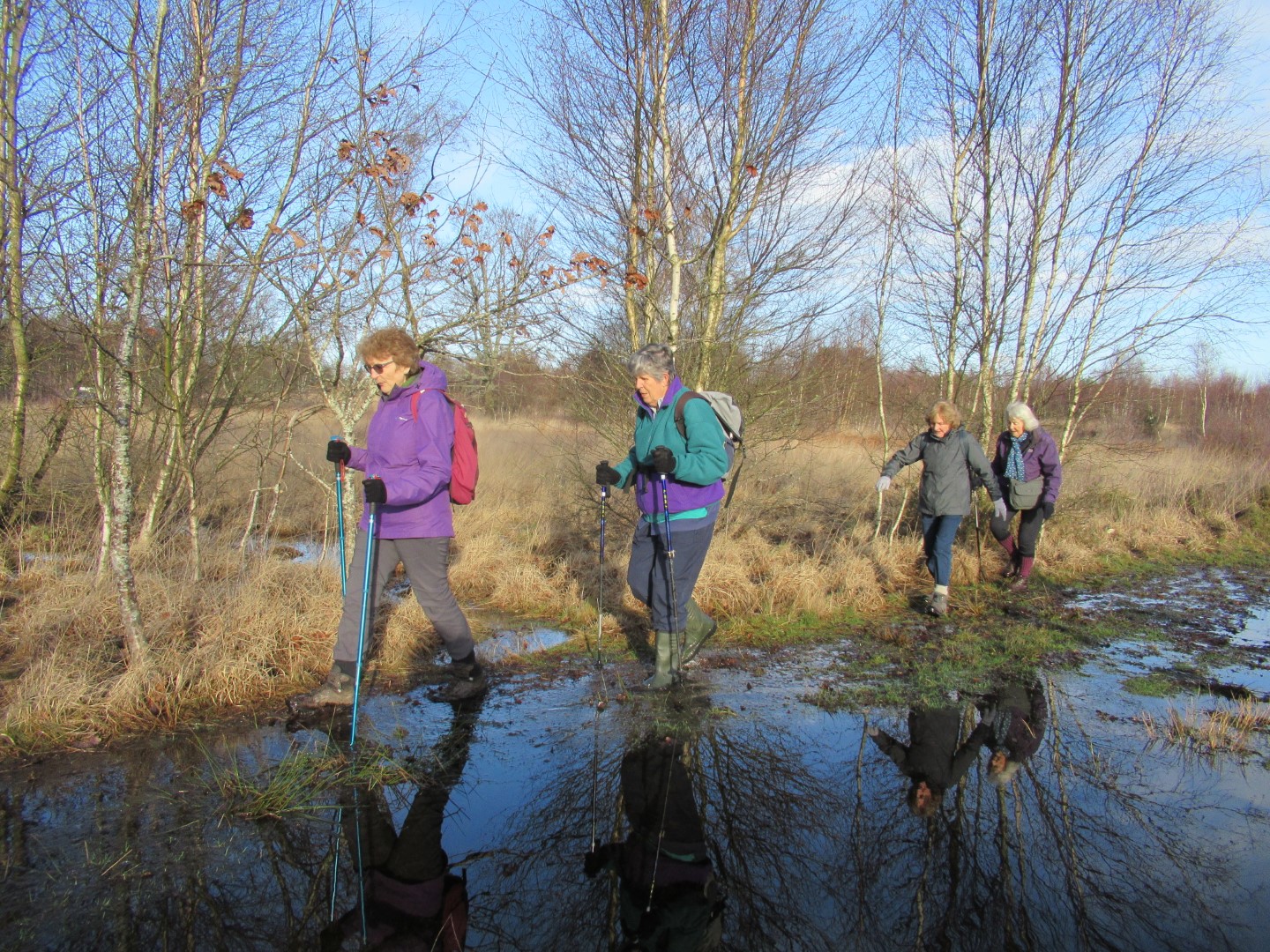
Some boots are made for walking, especially wellingtons!
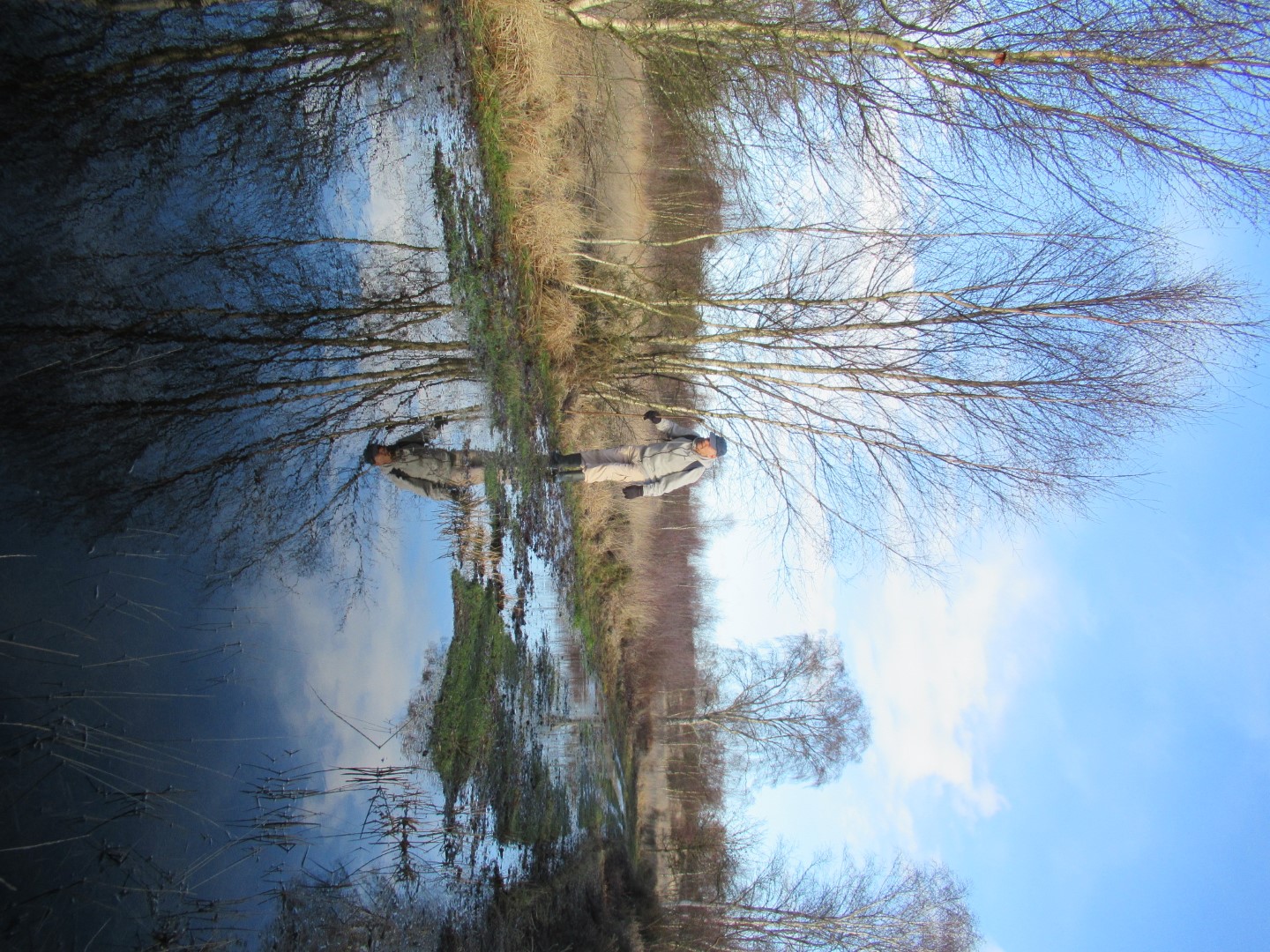
Fitzhall Heath

Thank goodness, no water here.
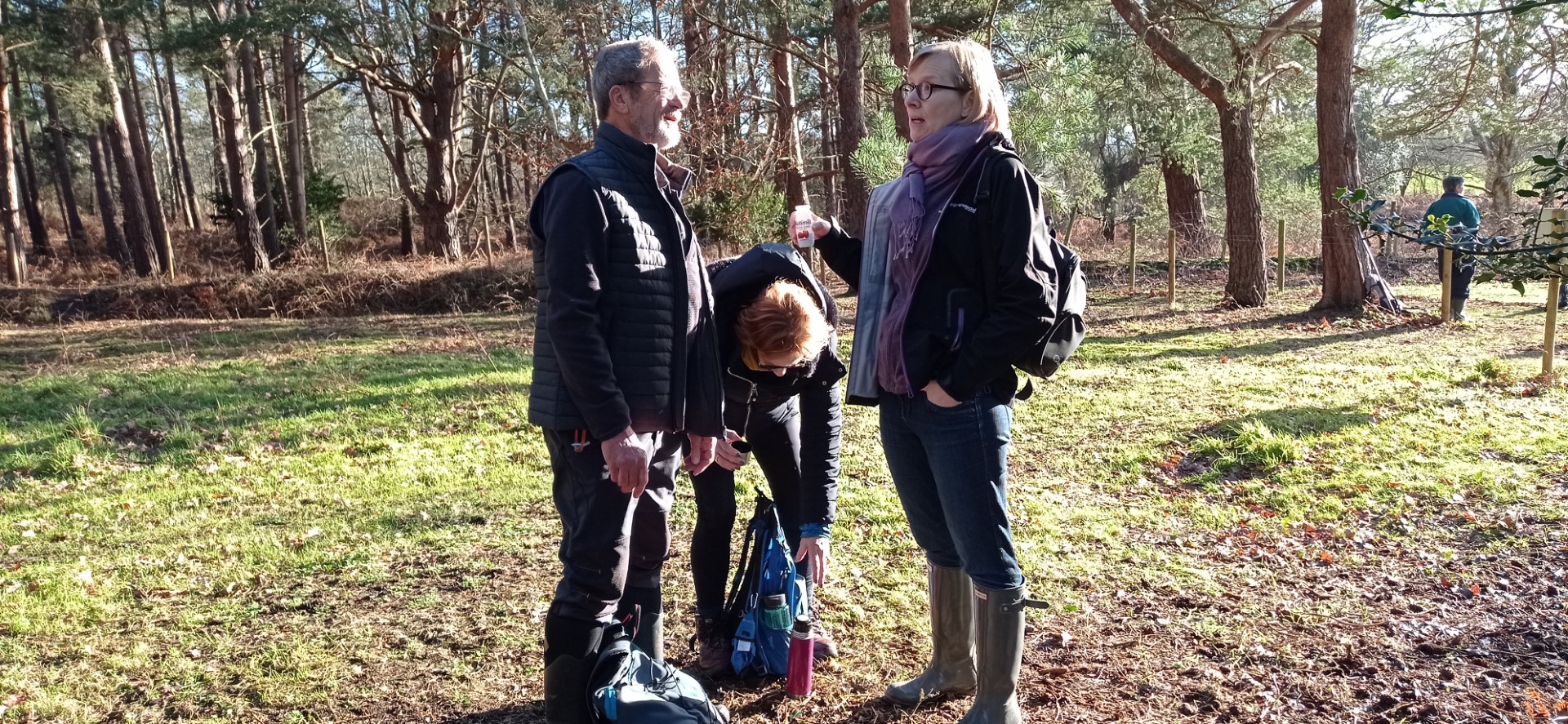
Coffee stop, let's find some biscuits

A Rother contributory needed crossing
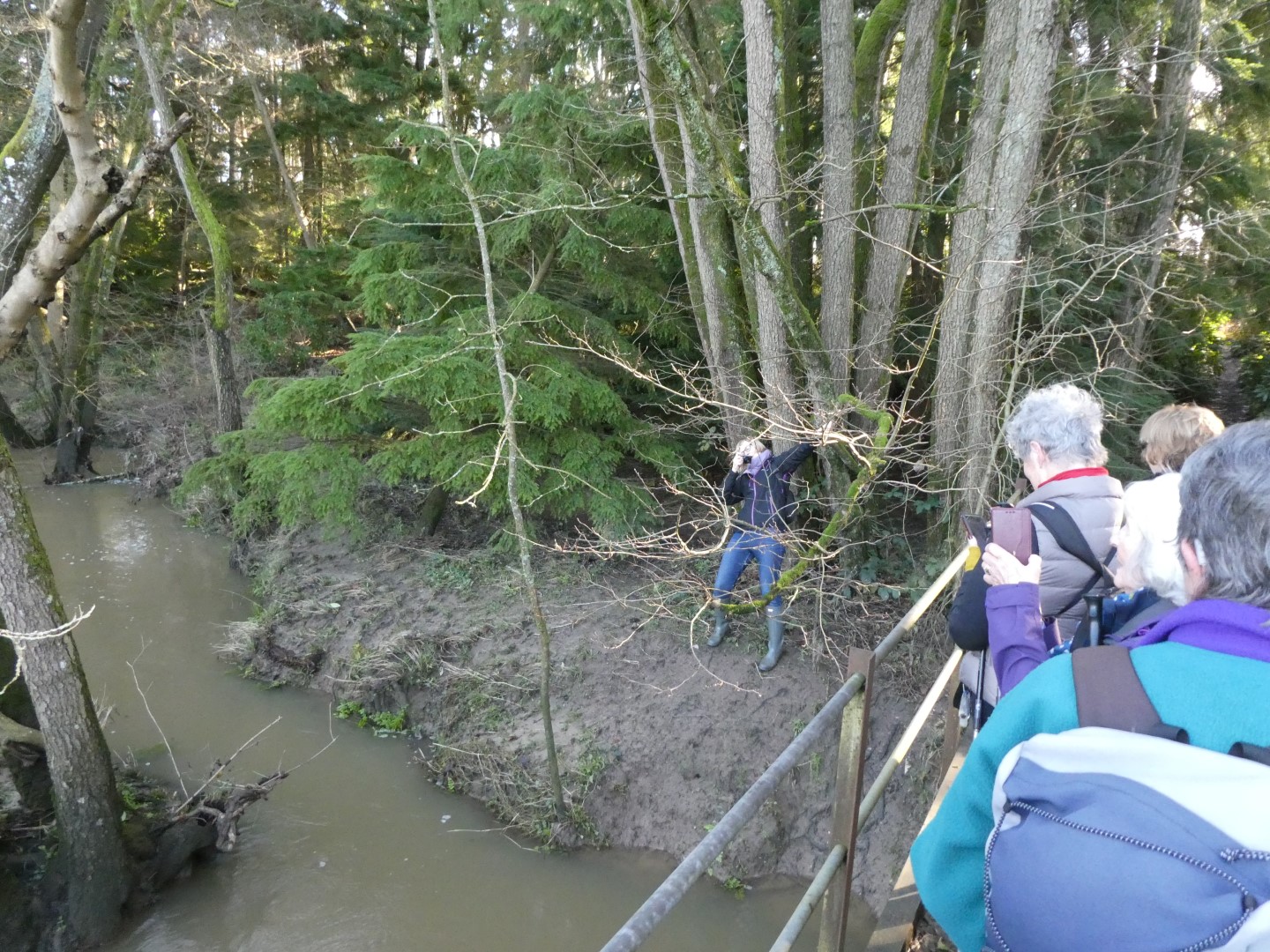
Splendid effort to get a good spot for a shot
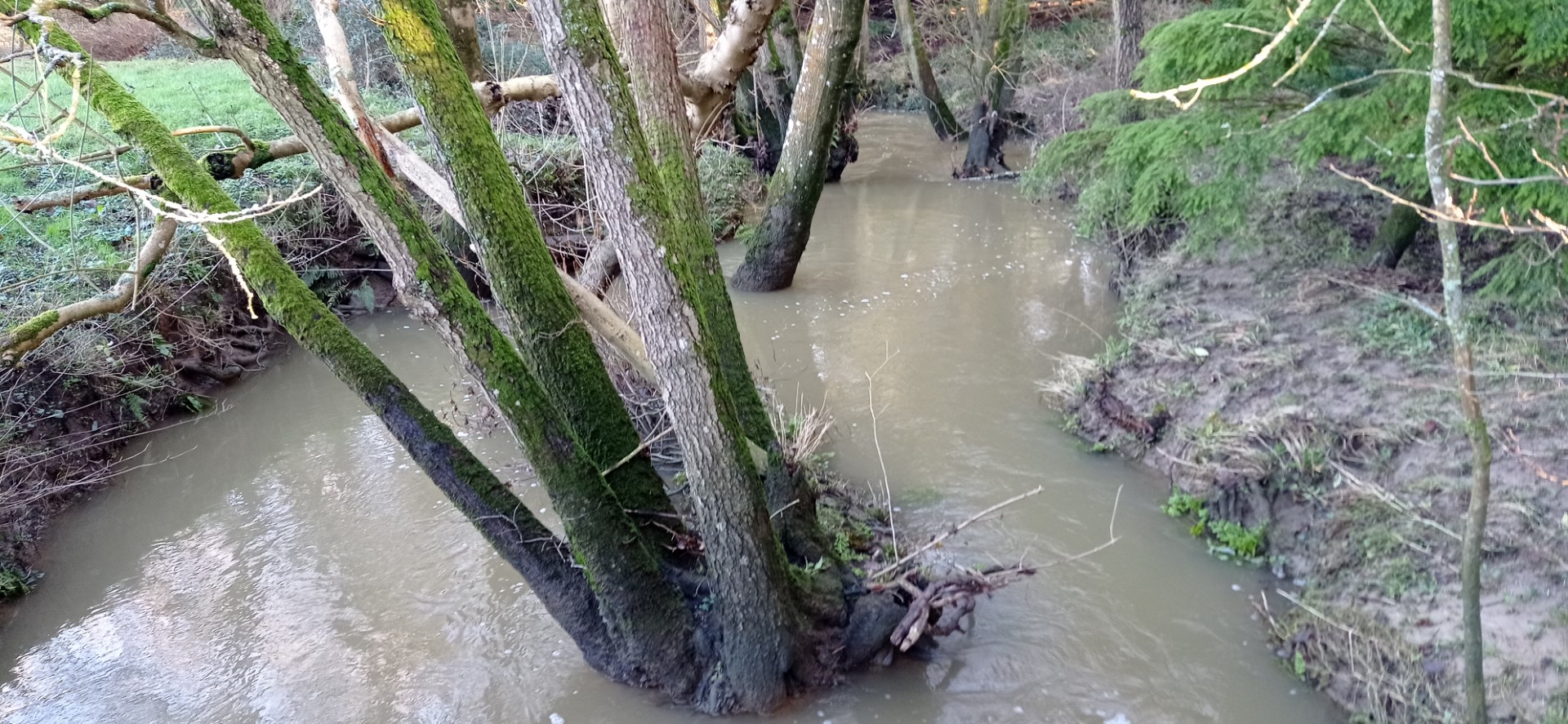
But not a good spot for a swim
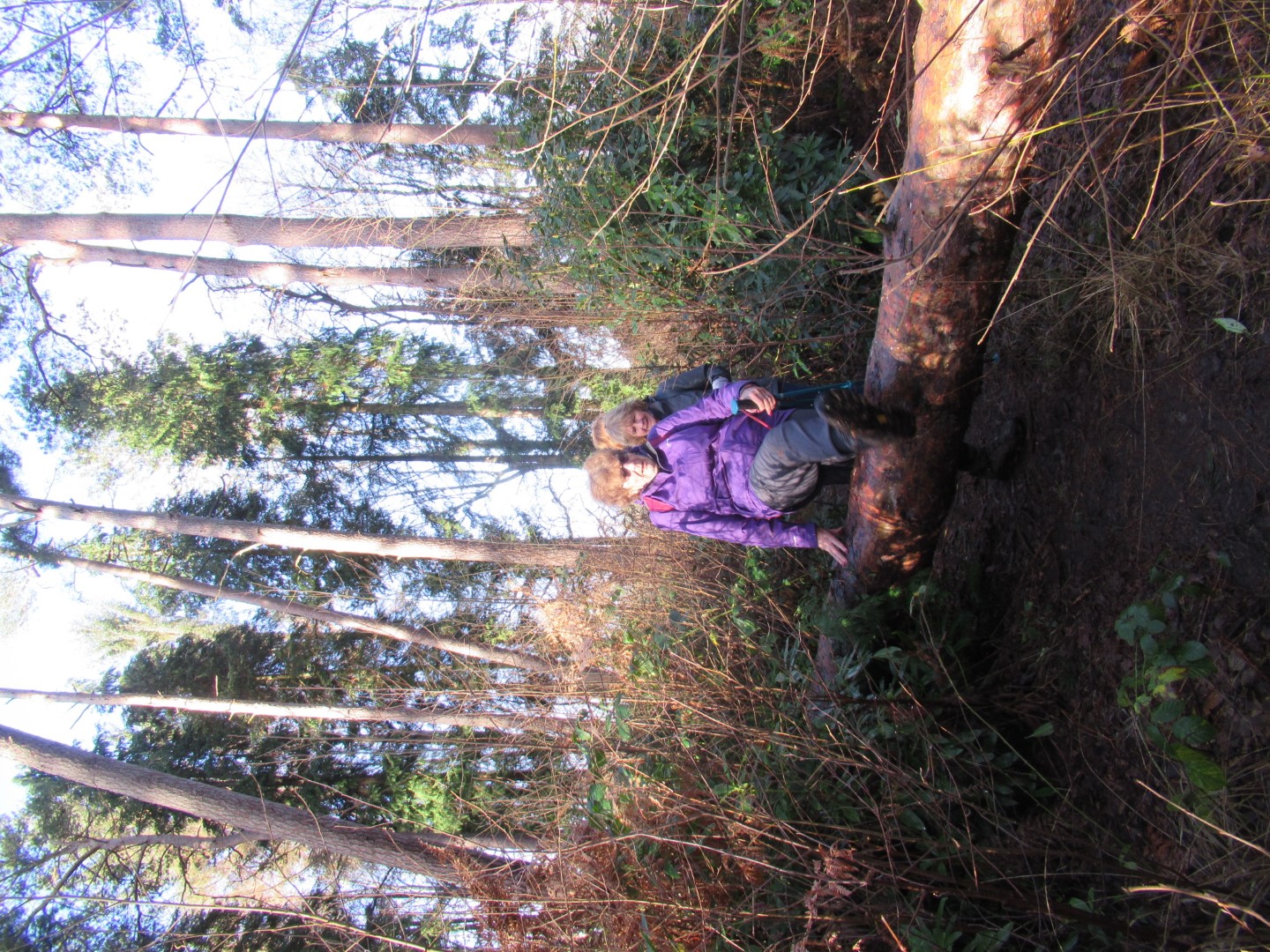
The Warren proved even more testing for those of a shorter stature
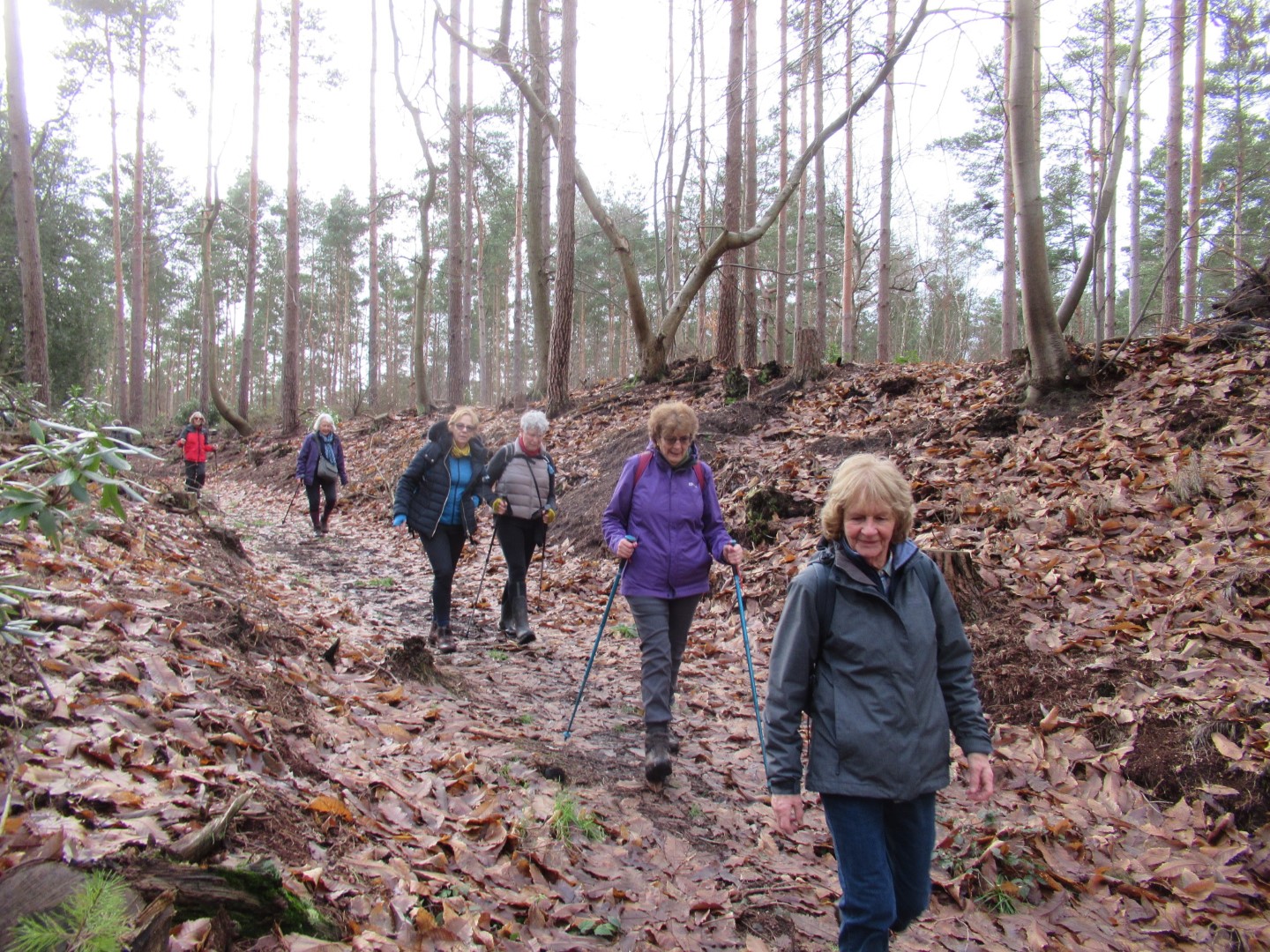
"What's going on down there?"
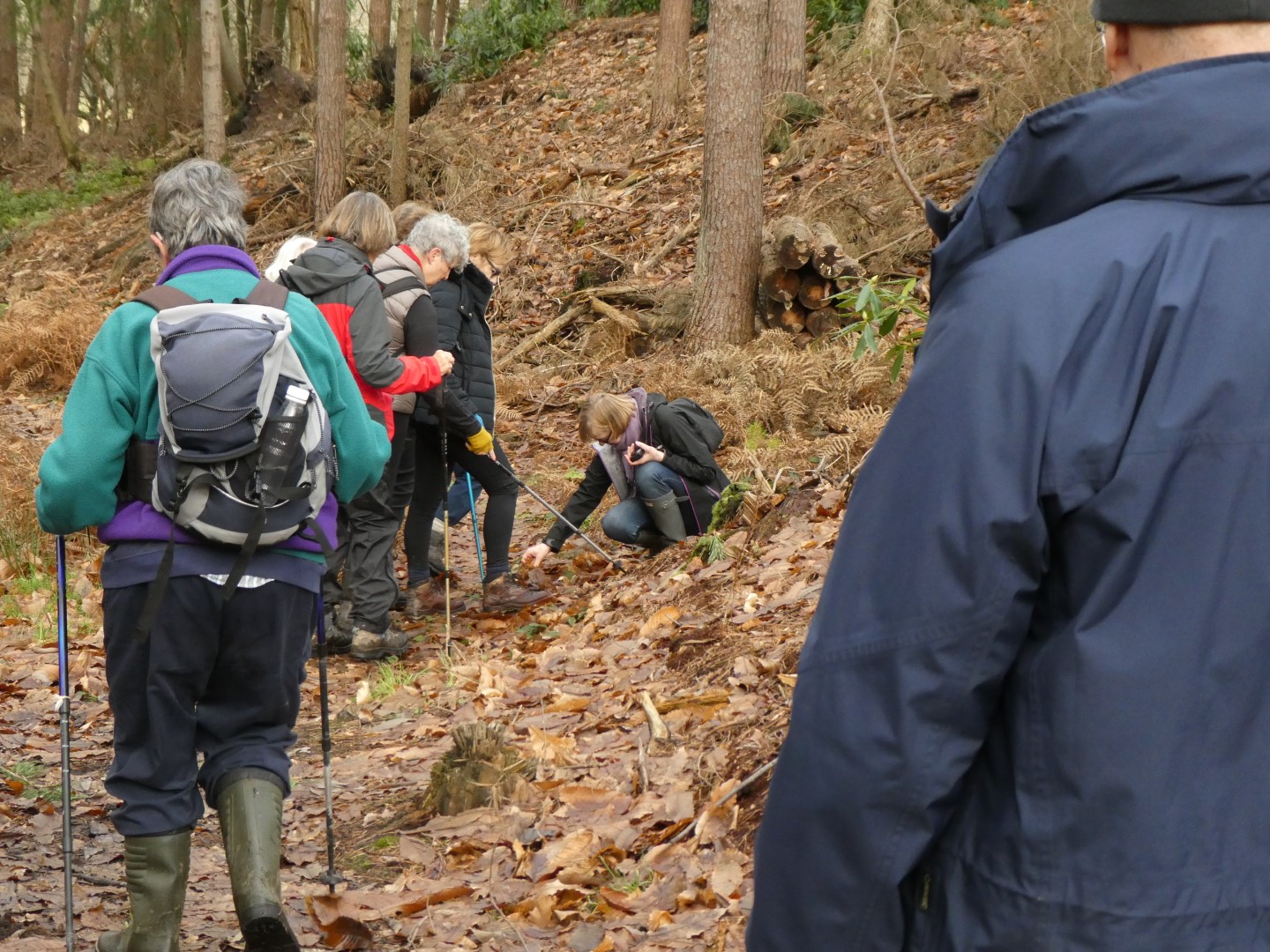
What is it?
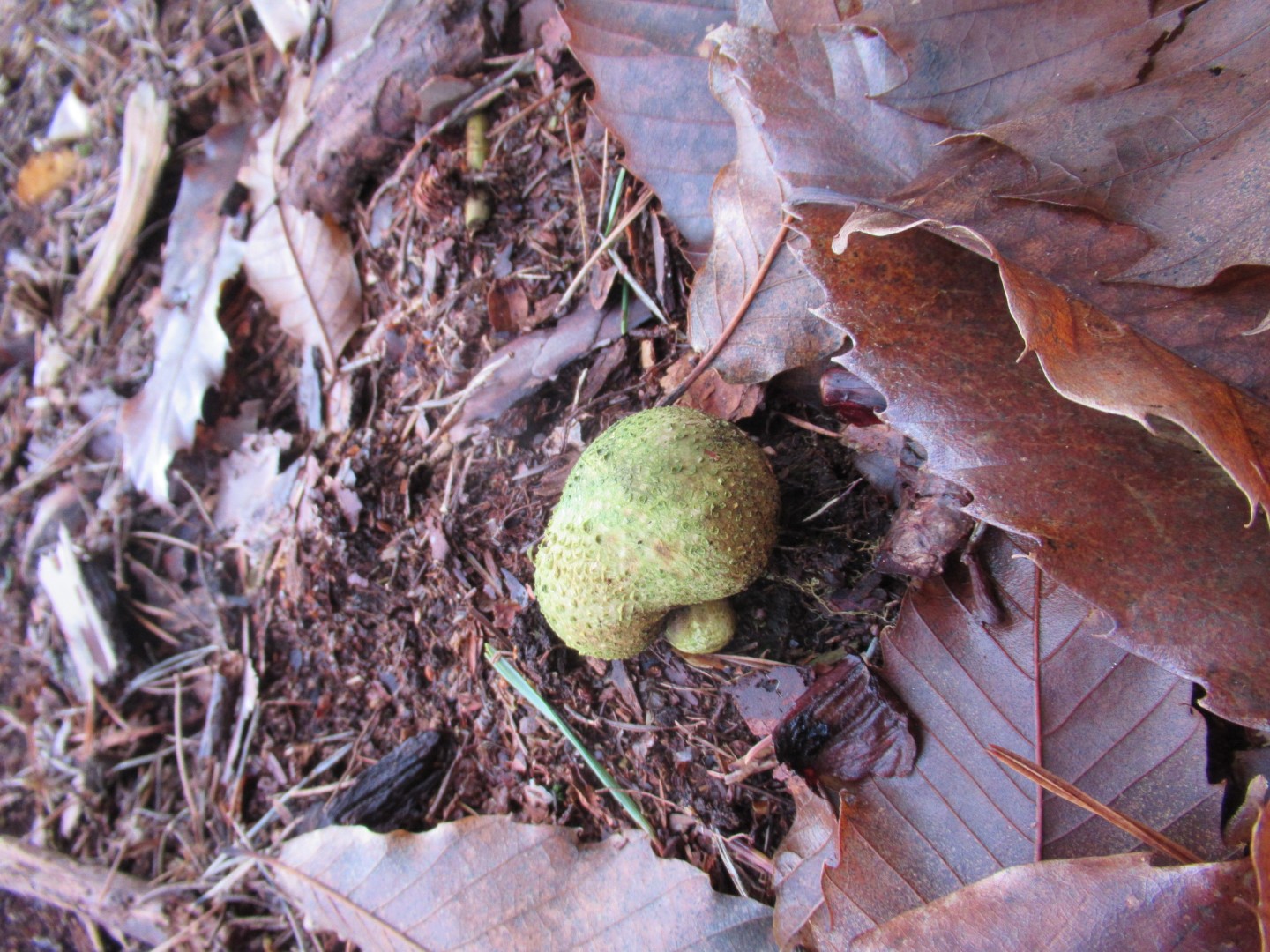
Probably an Earthball and very poisonous!
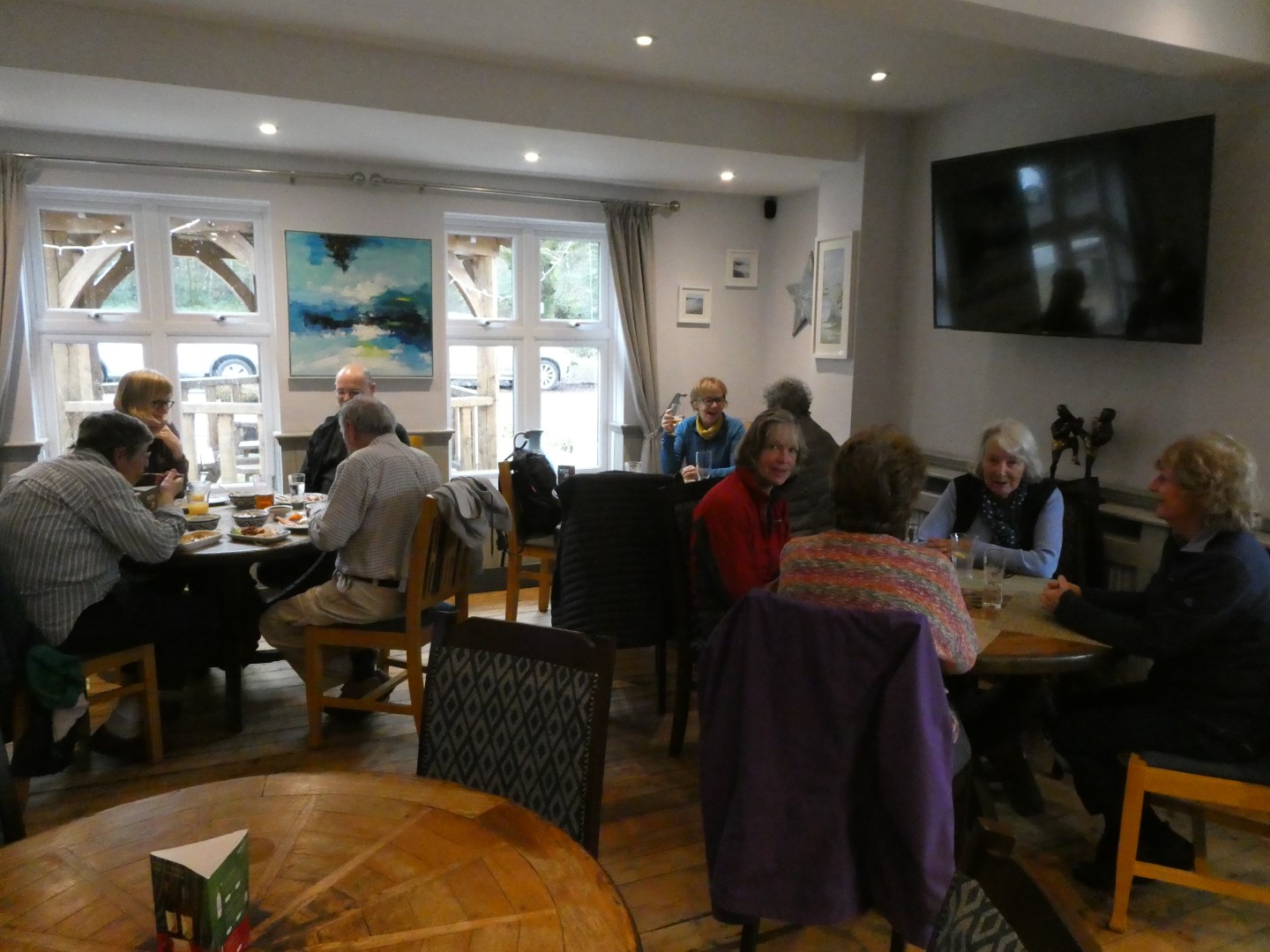
Nothing poisonous in here - back in The Hamilton Arms
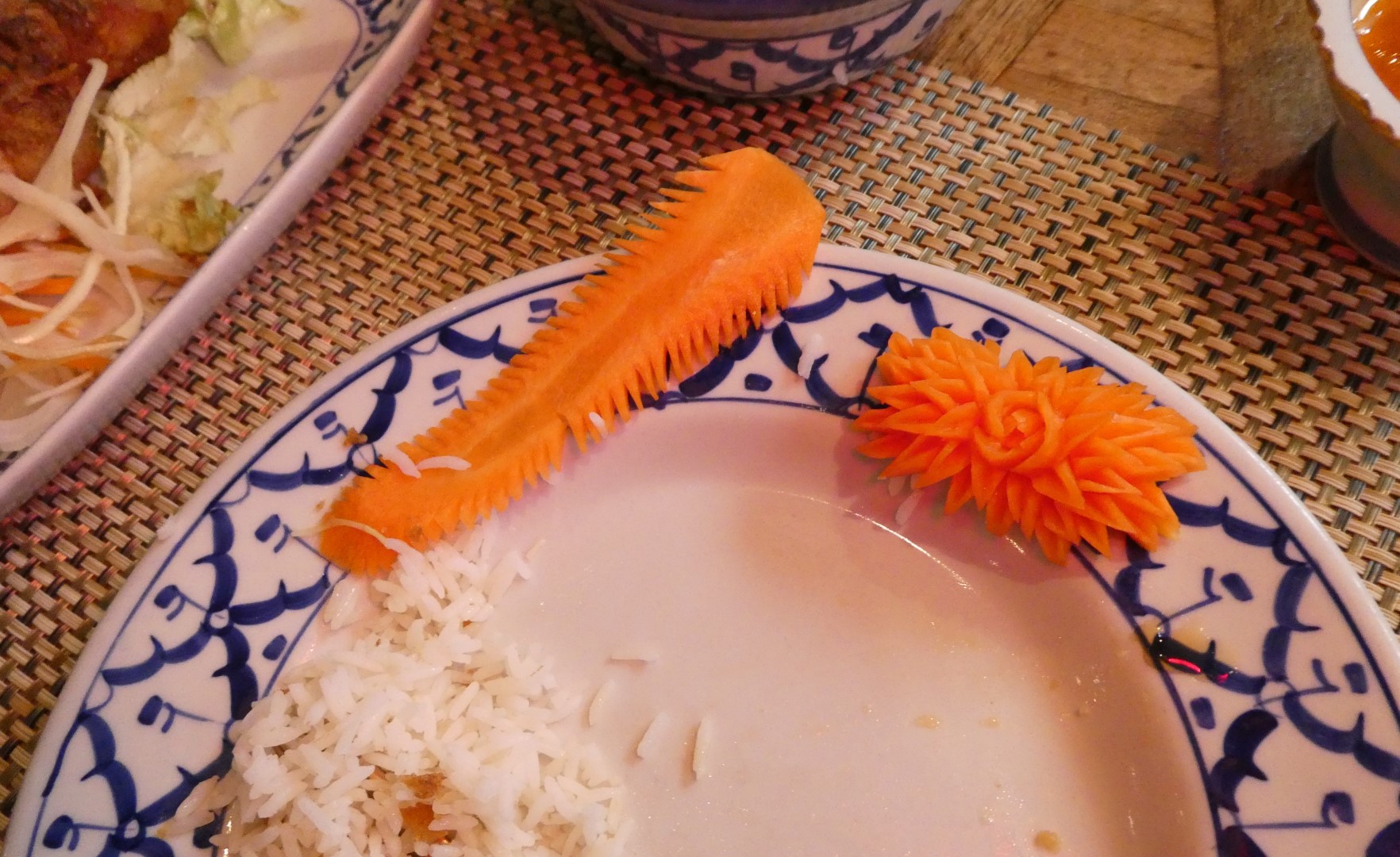
Nice carrot - far too nice to eat.

About 5 miles.
Hawkley walk on 4th January 2023
Conditions were damp underfoot in places but the weather was good for Jay's amble around Hawkley. The walk started out heading roughly north to reach Standfast Lane and then on to the scattered houses of Empshott (in the fifteenth century it was ascertained by an inquisition taken in 1428 that Empshott was one of the Hampshire parishes in which there were not ten in-habitants holding houses Feud. Aids, ii, 342 - nothing much has changed since then!). The old church there, the Church of the Holy Rood dates from 12th century and has had many rebuilds ever since. It is unusual in having a leaded glass belltower and inside are two bells dating from 1627 and 1897. After having a drinks break in the churchyard we walked on to the Hangers Way in the shadow of Noah Hill before turning south to return to Hawkley village. An enjoyable lunch followed in the Hawkley Inn. The walk was just below 5.1/2 miles.
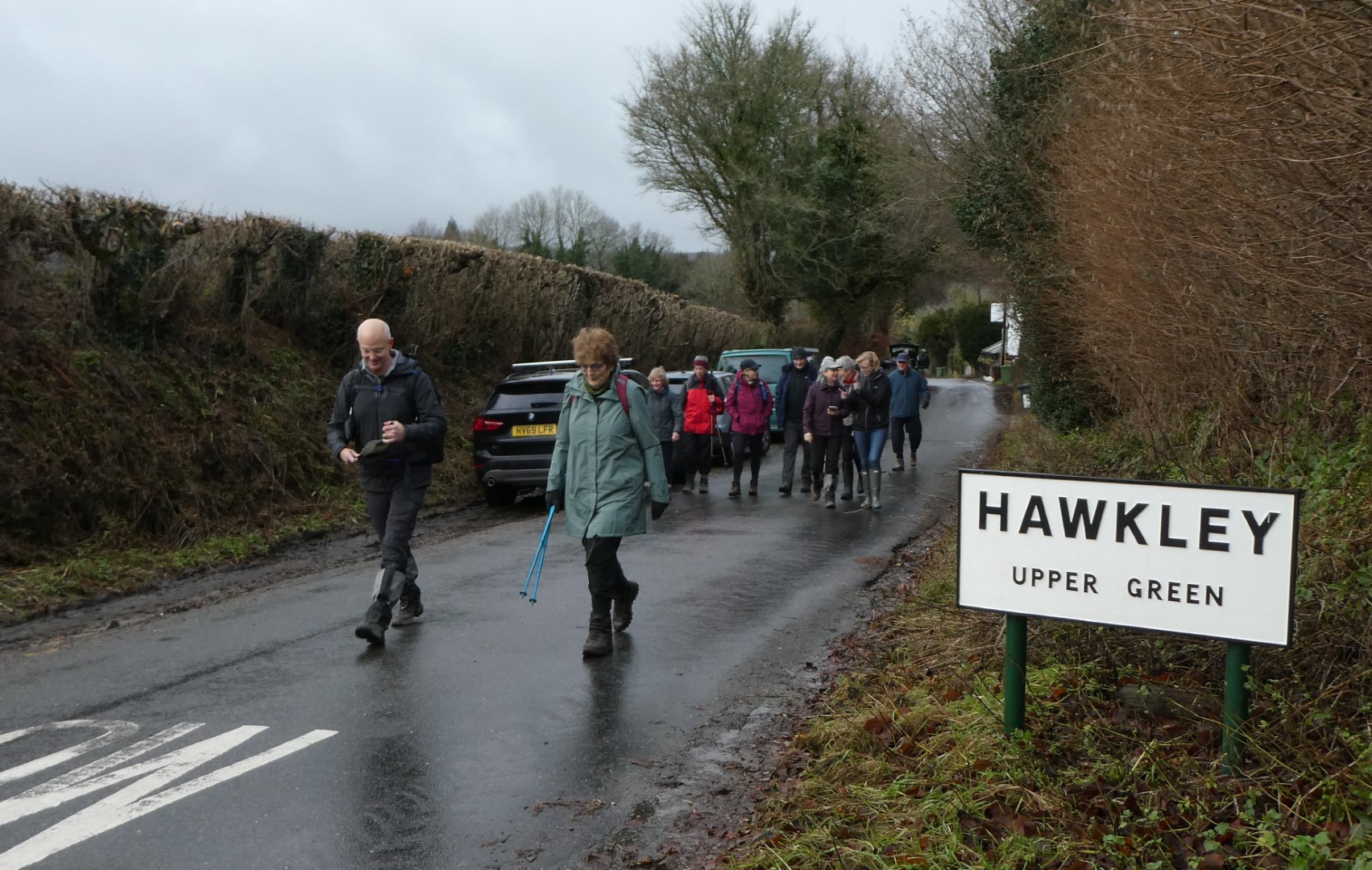
Starting out.

Maybe a little water still around?
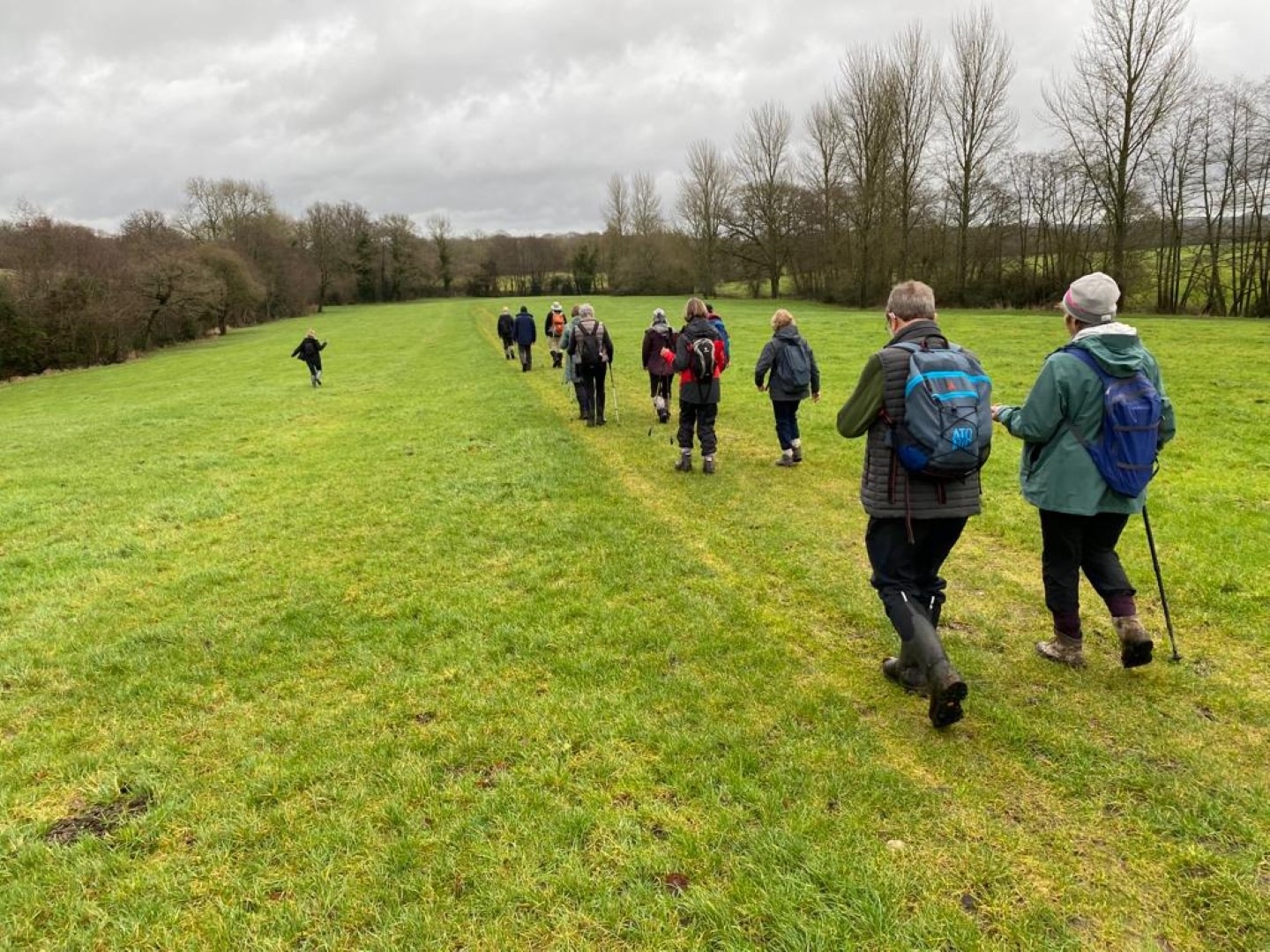
This is very pleasant
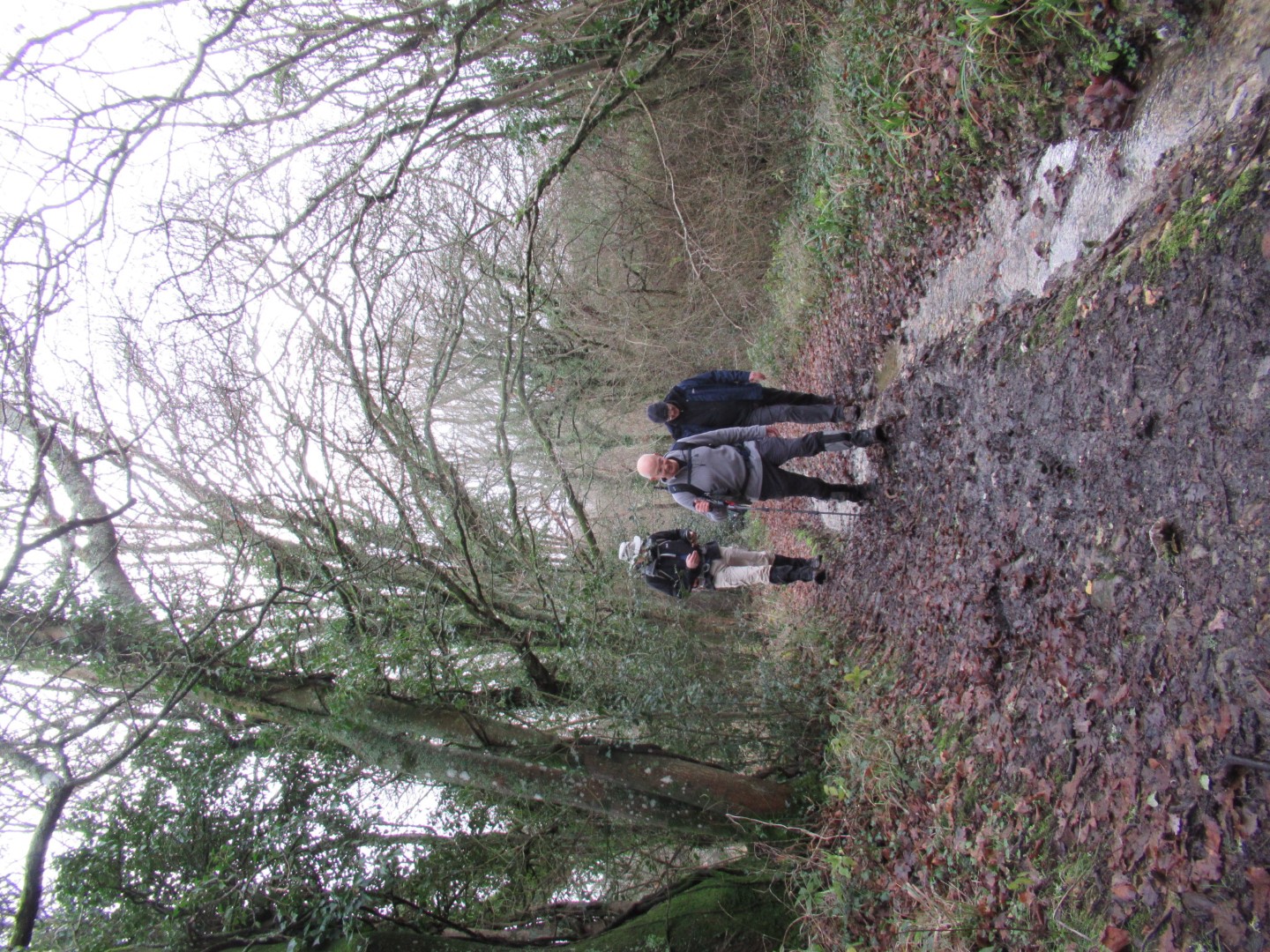
Just a small river to navigate
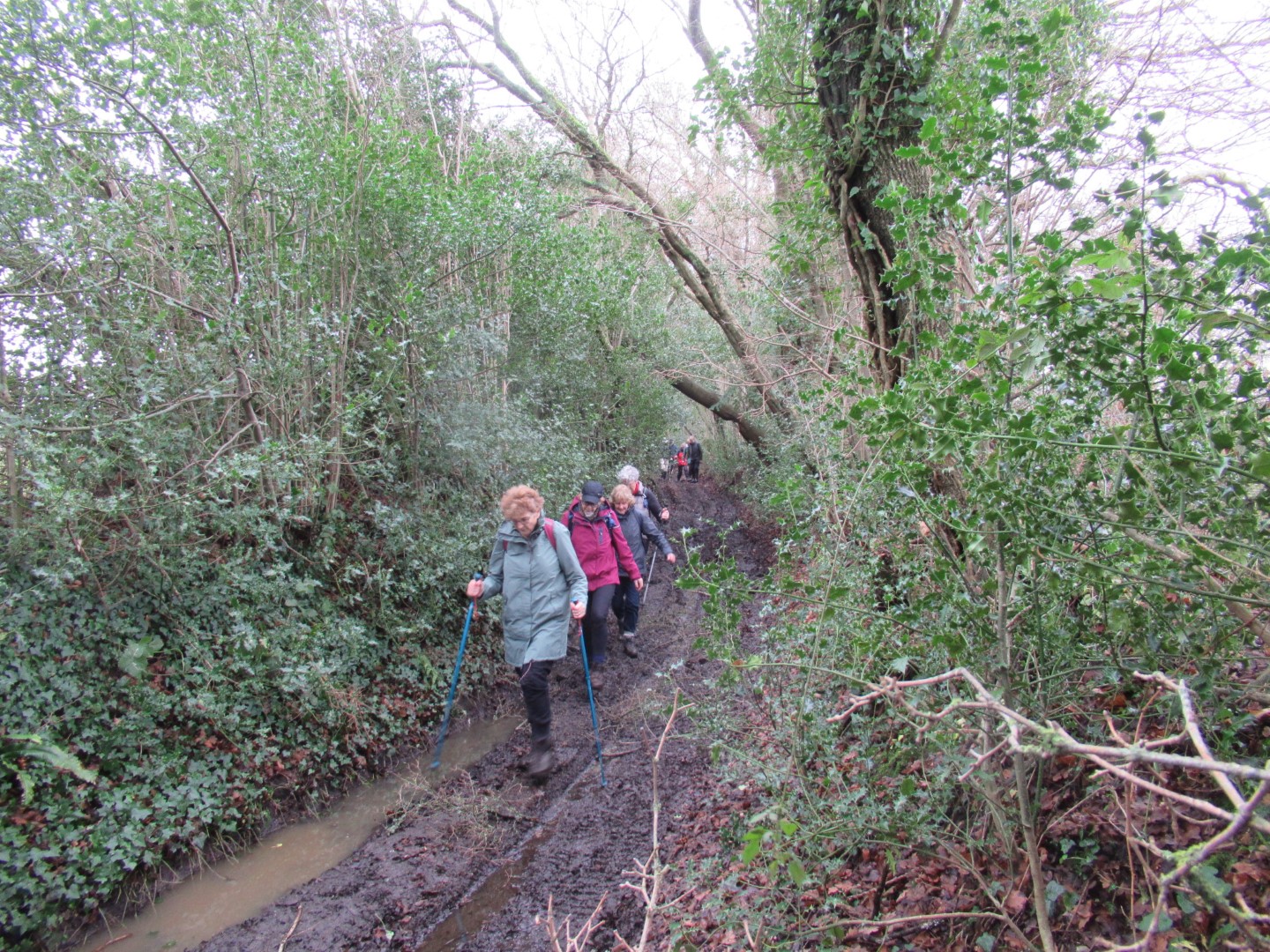
Balancing does tone up muscles, or so they say.....
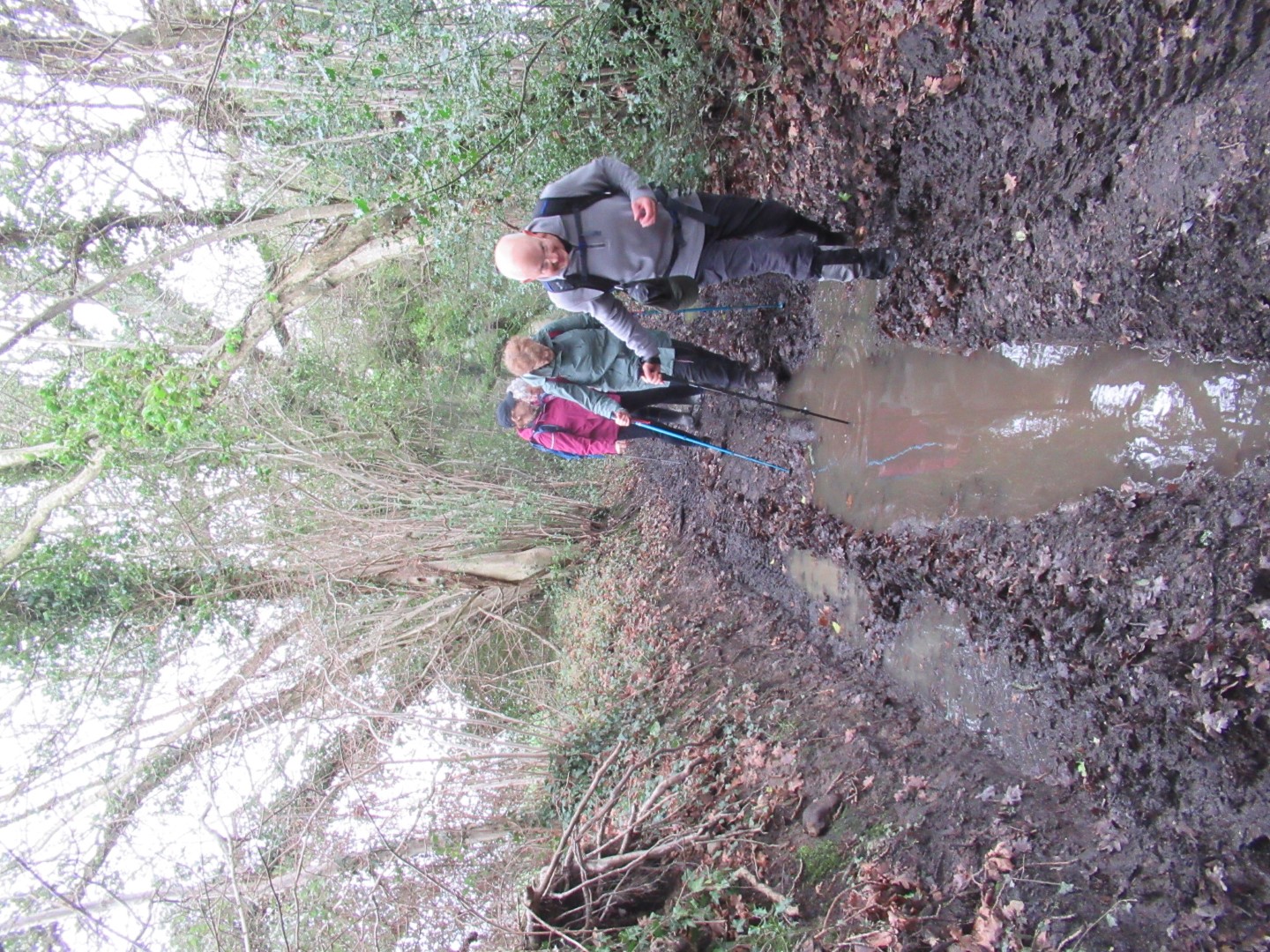
More balancing
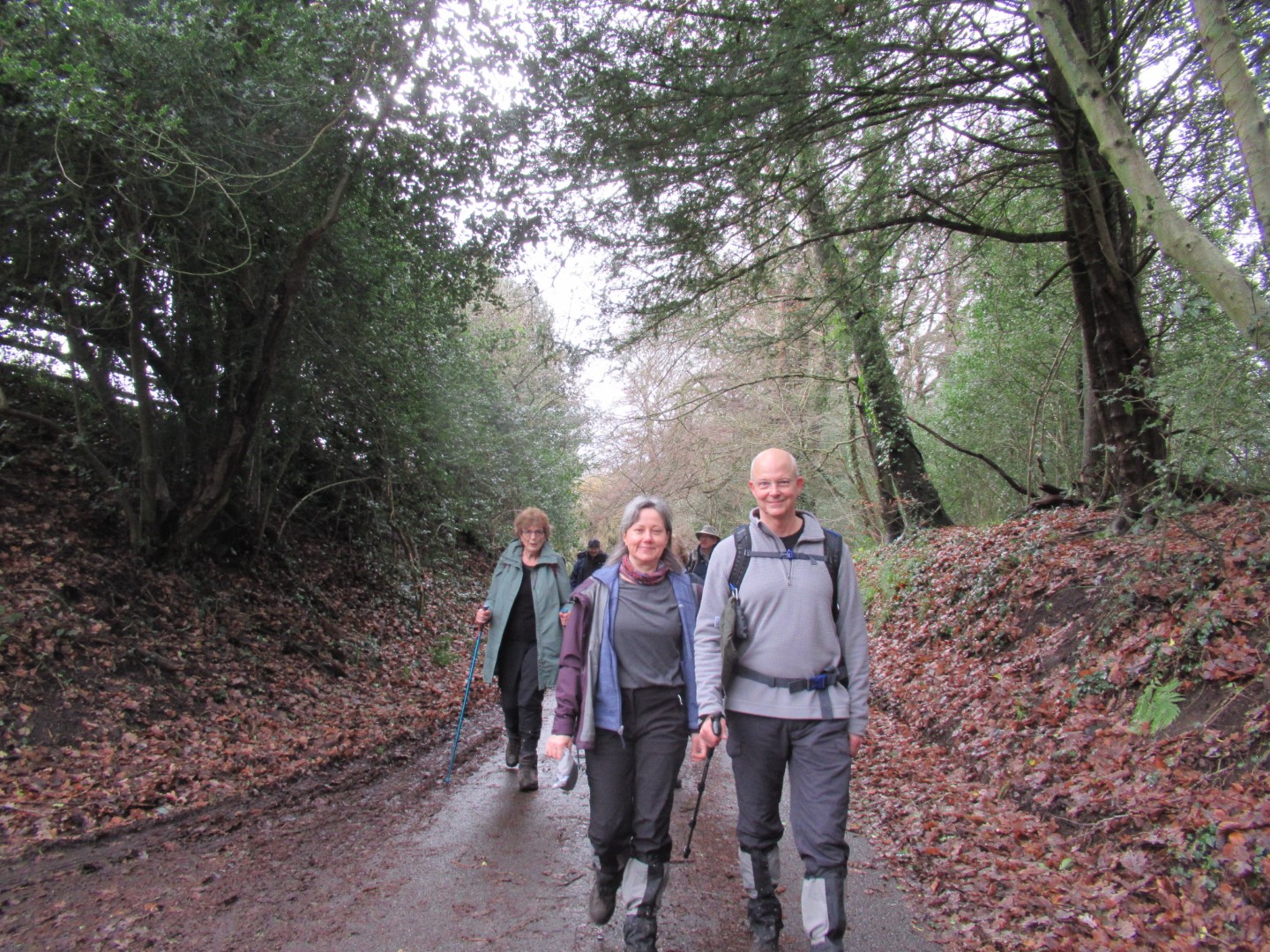
Aha, a road at last
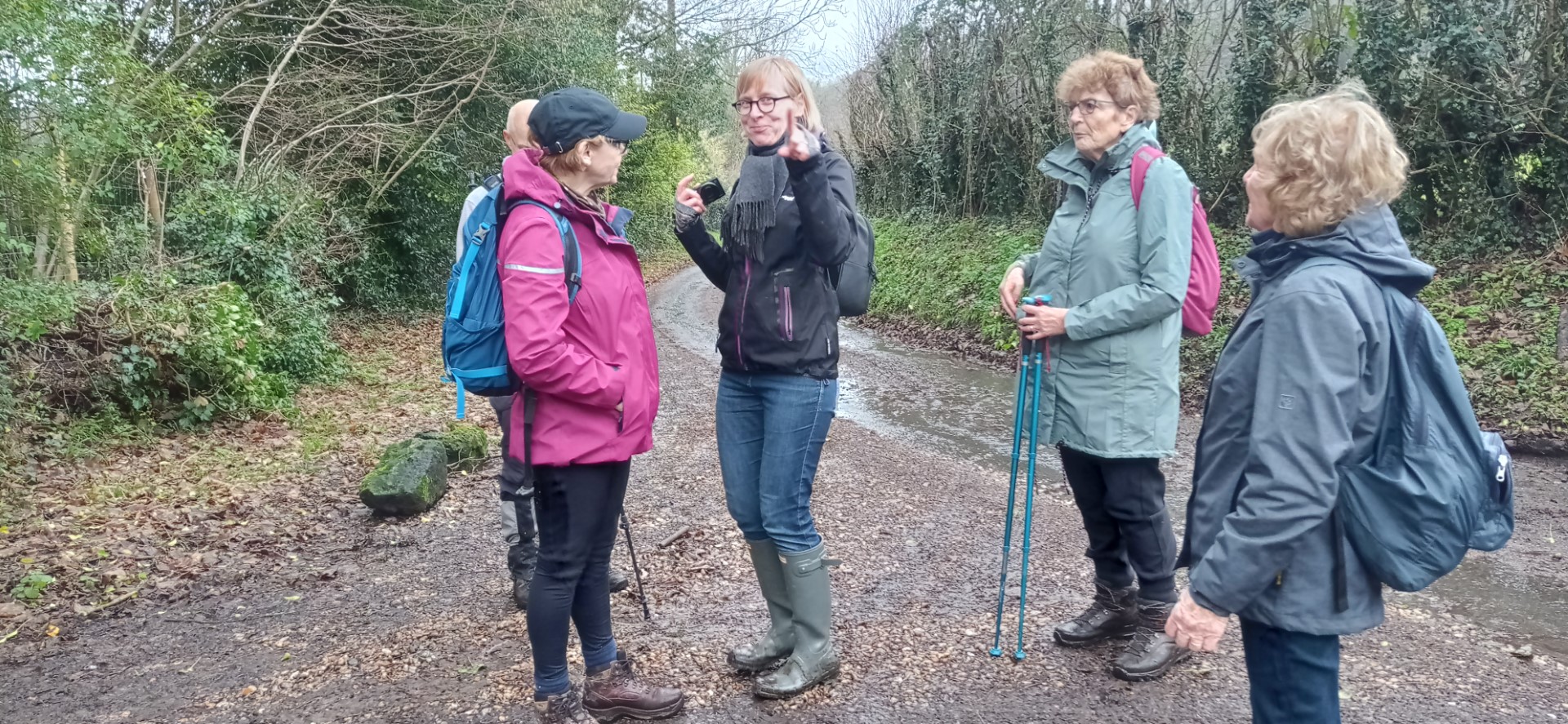
"I know what you're doing!"
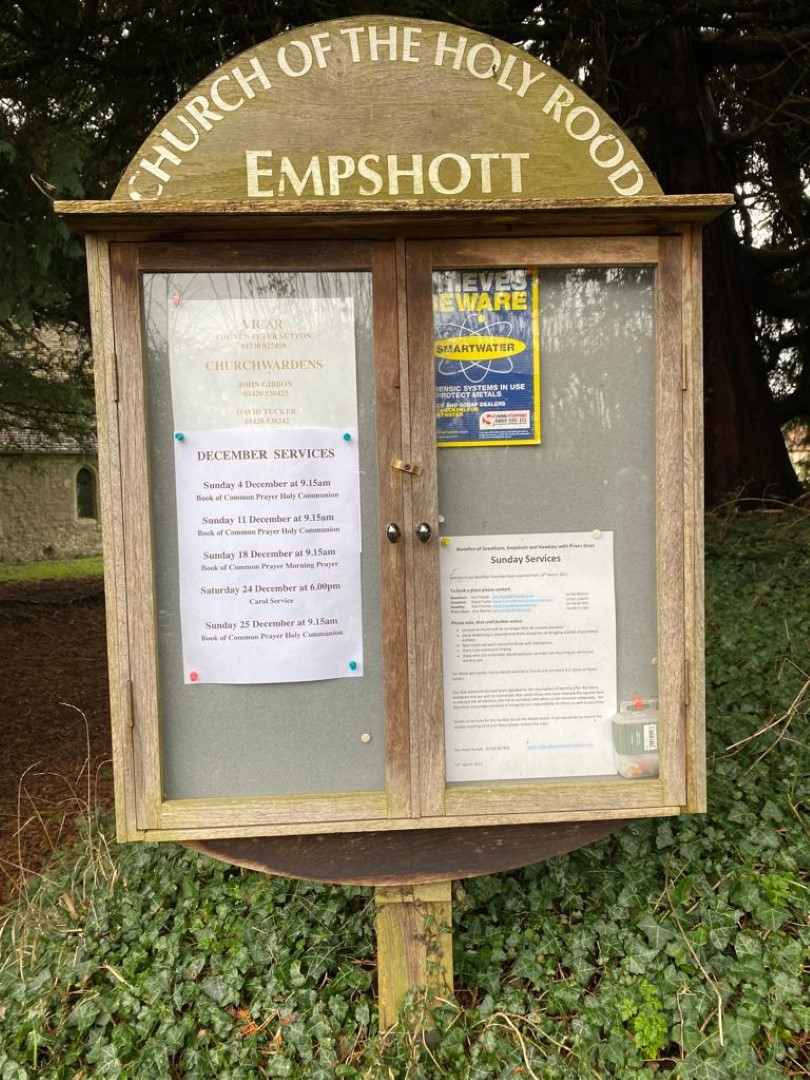
Well worth a visit
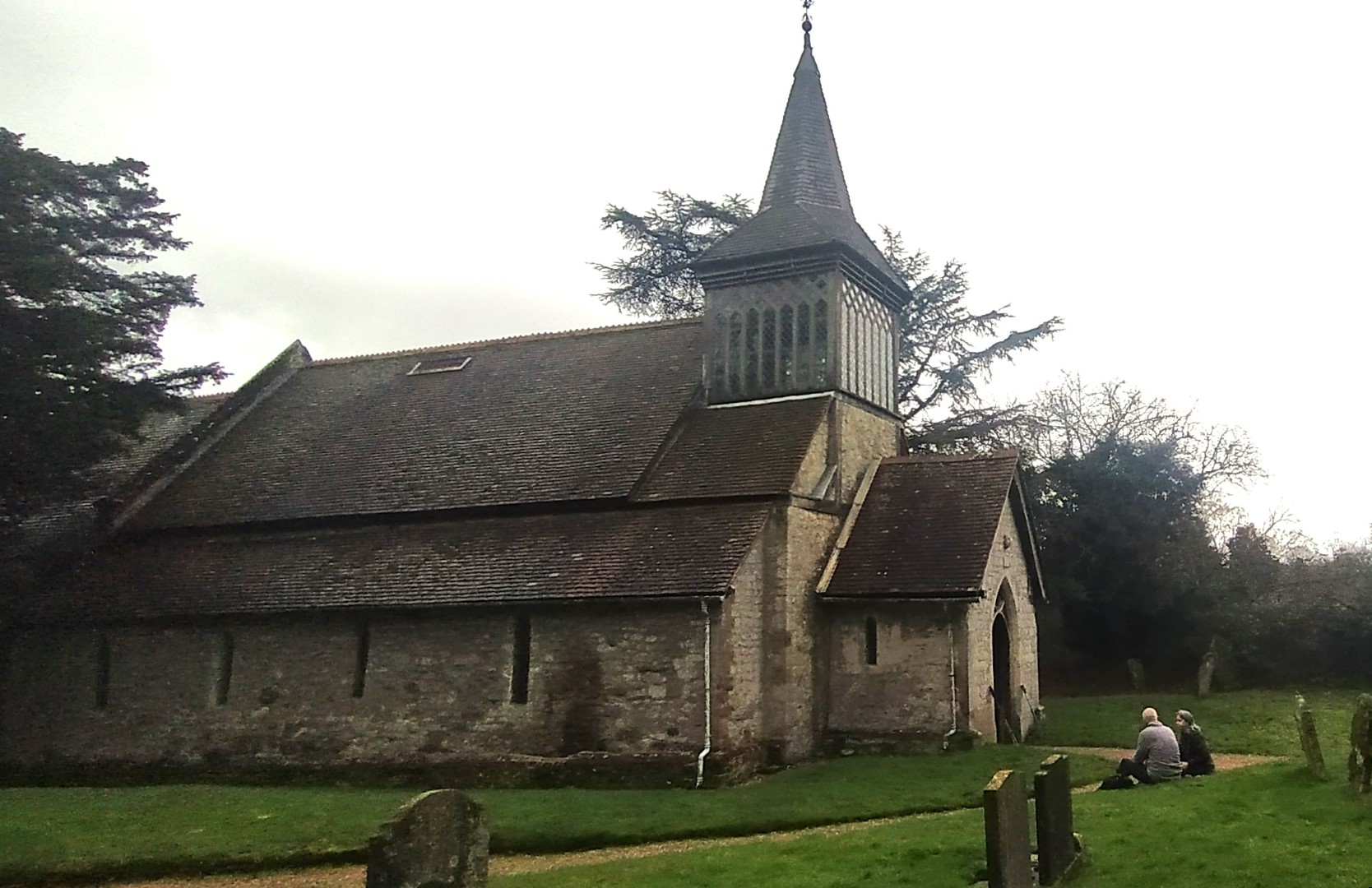
Nice place for a rest
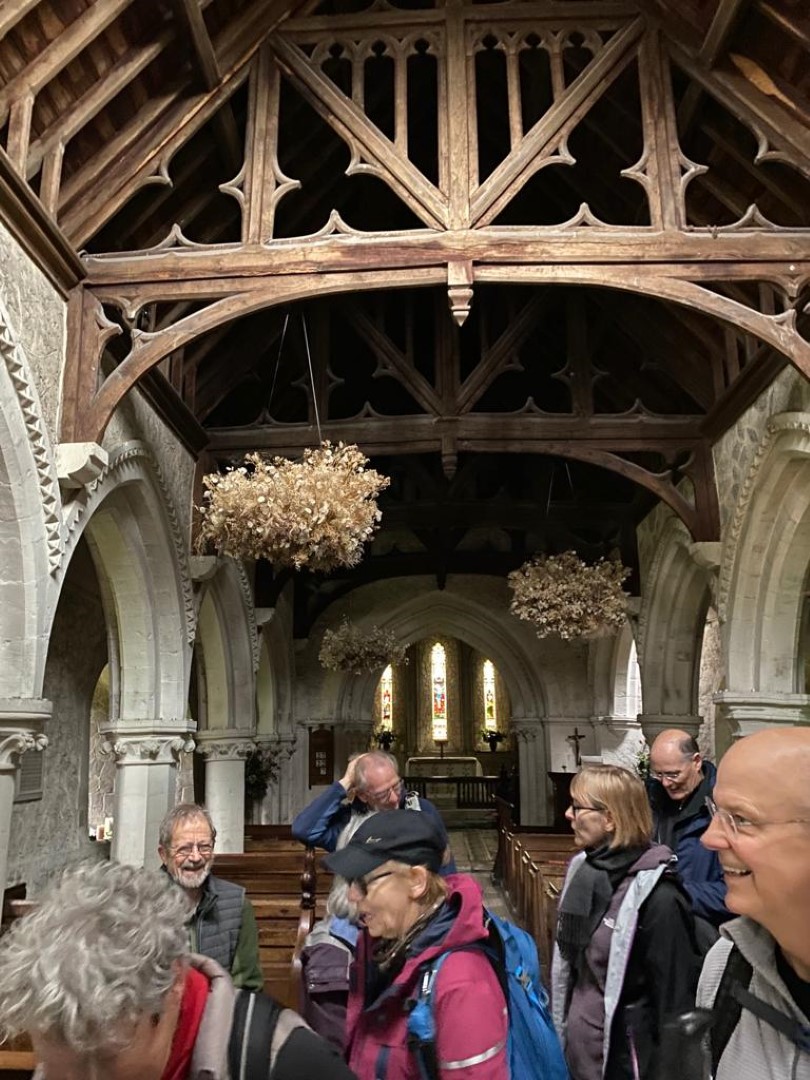
Even nicer inside - the leaning pillars are not just a trick of photography!
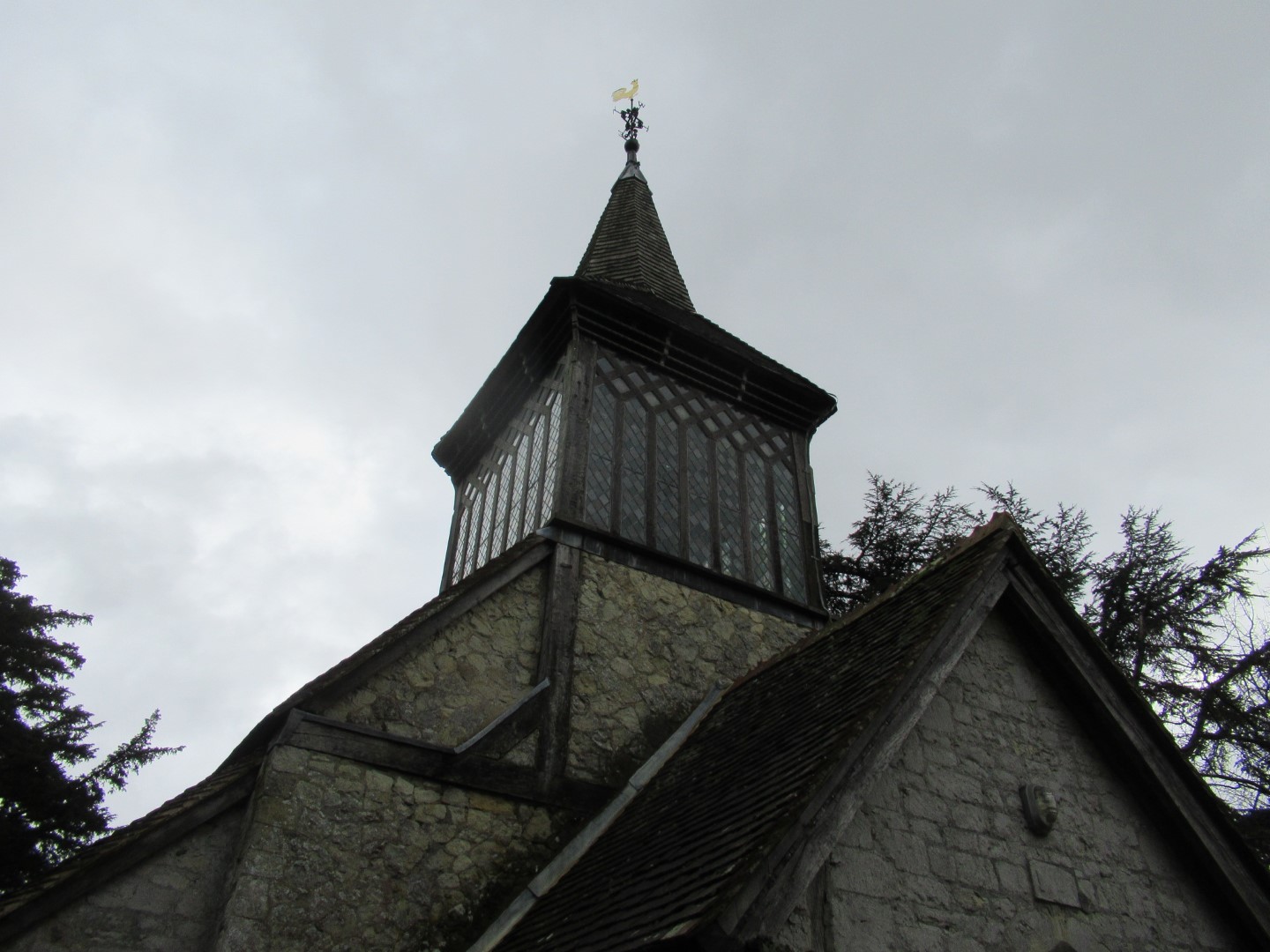
Magnificent bell tower, volunteer window cleaners always welcome..
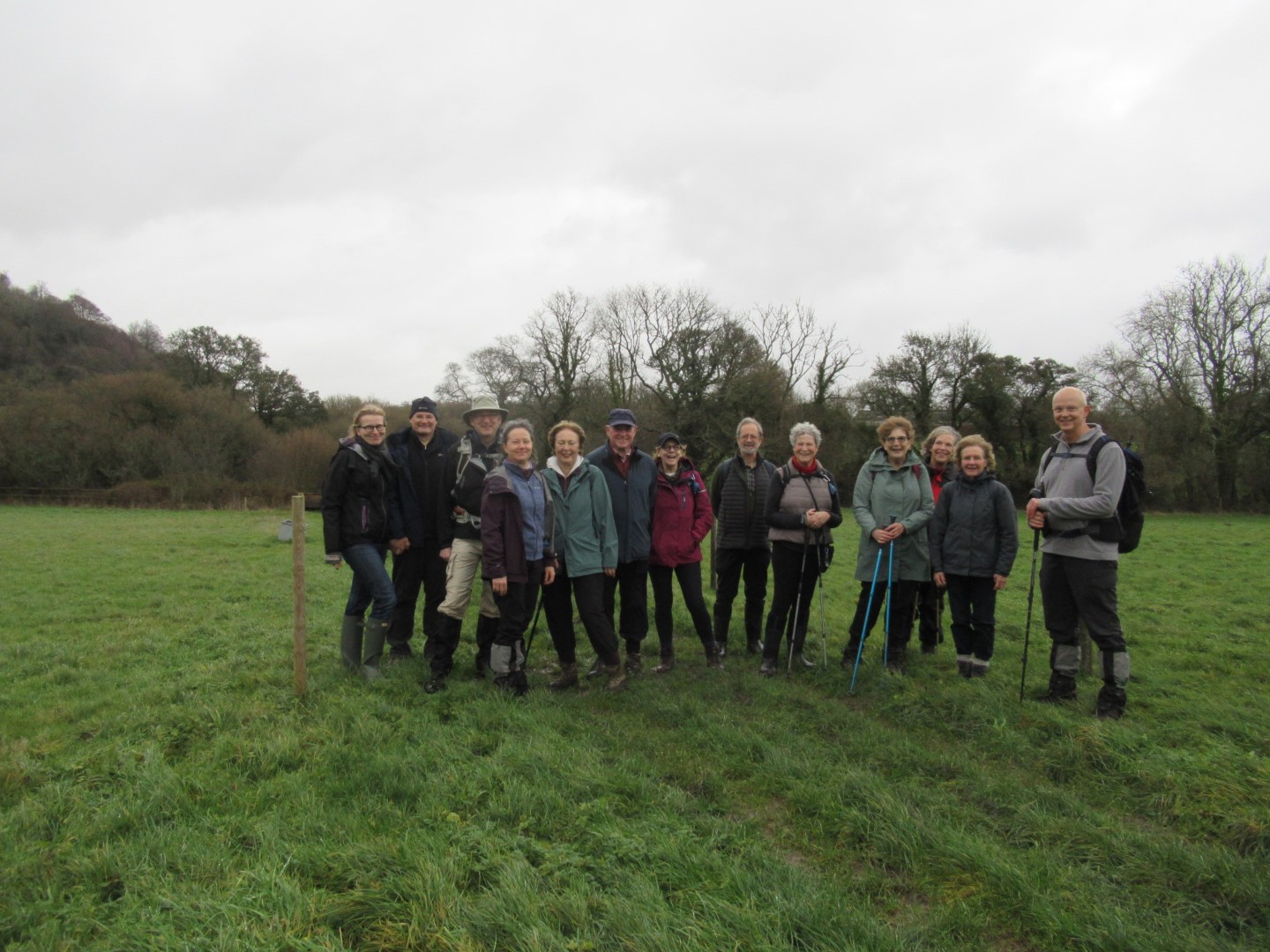
"Now, please all smile at the camera"
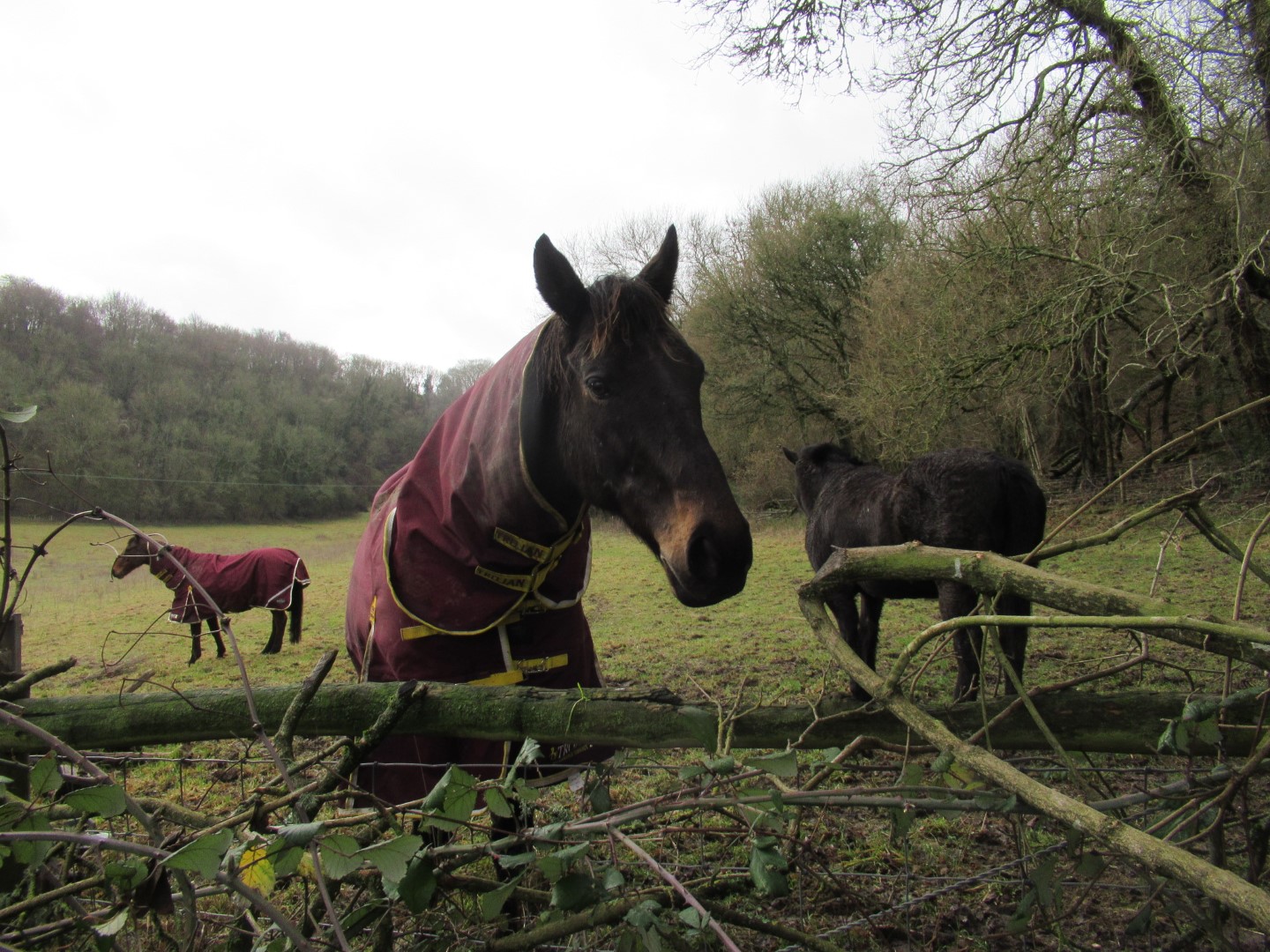
"Pssst - any good tips for the 3.30 at Epsom?"
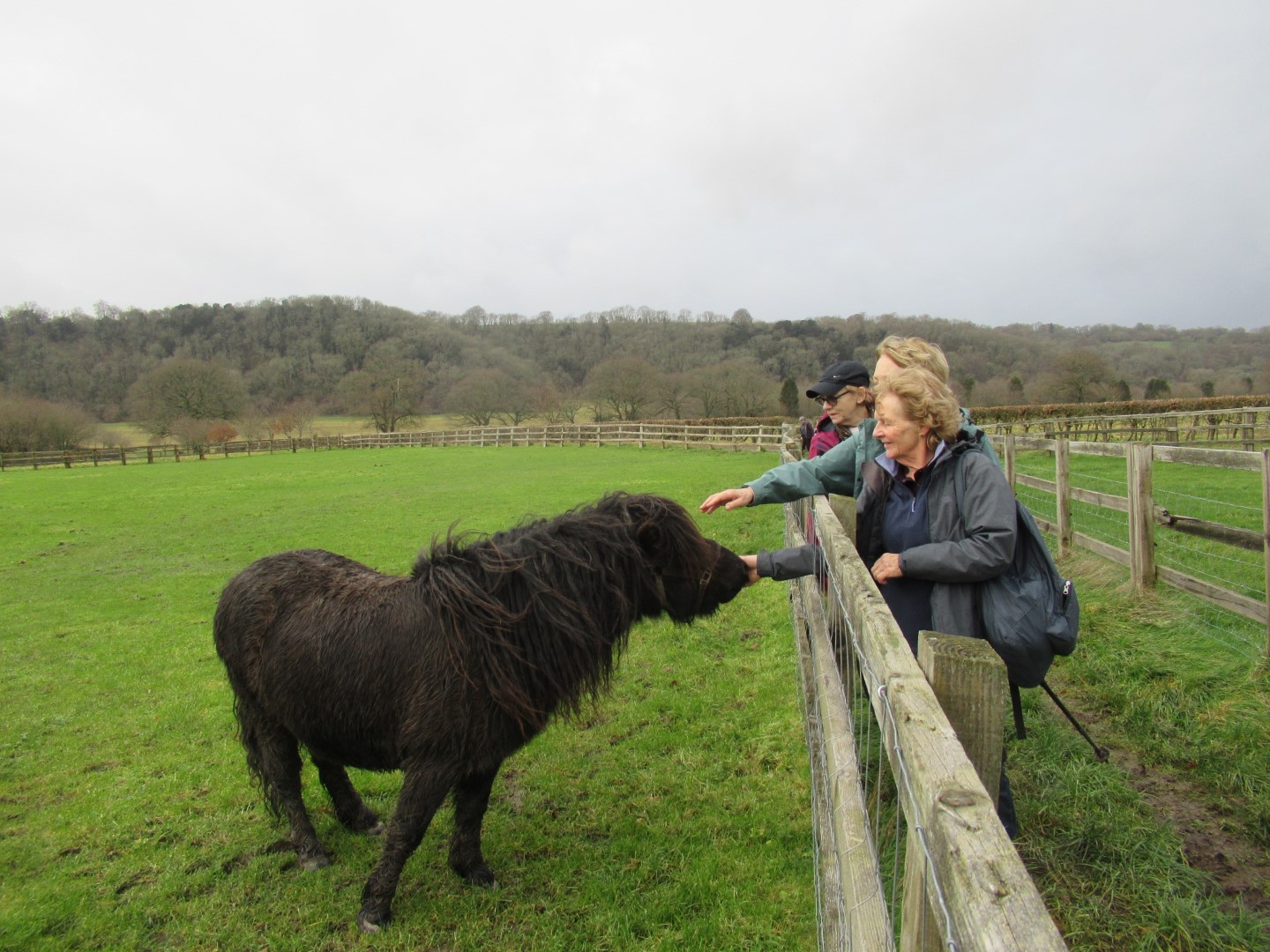
Everyone loves a well behaved Shetland pony
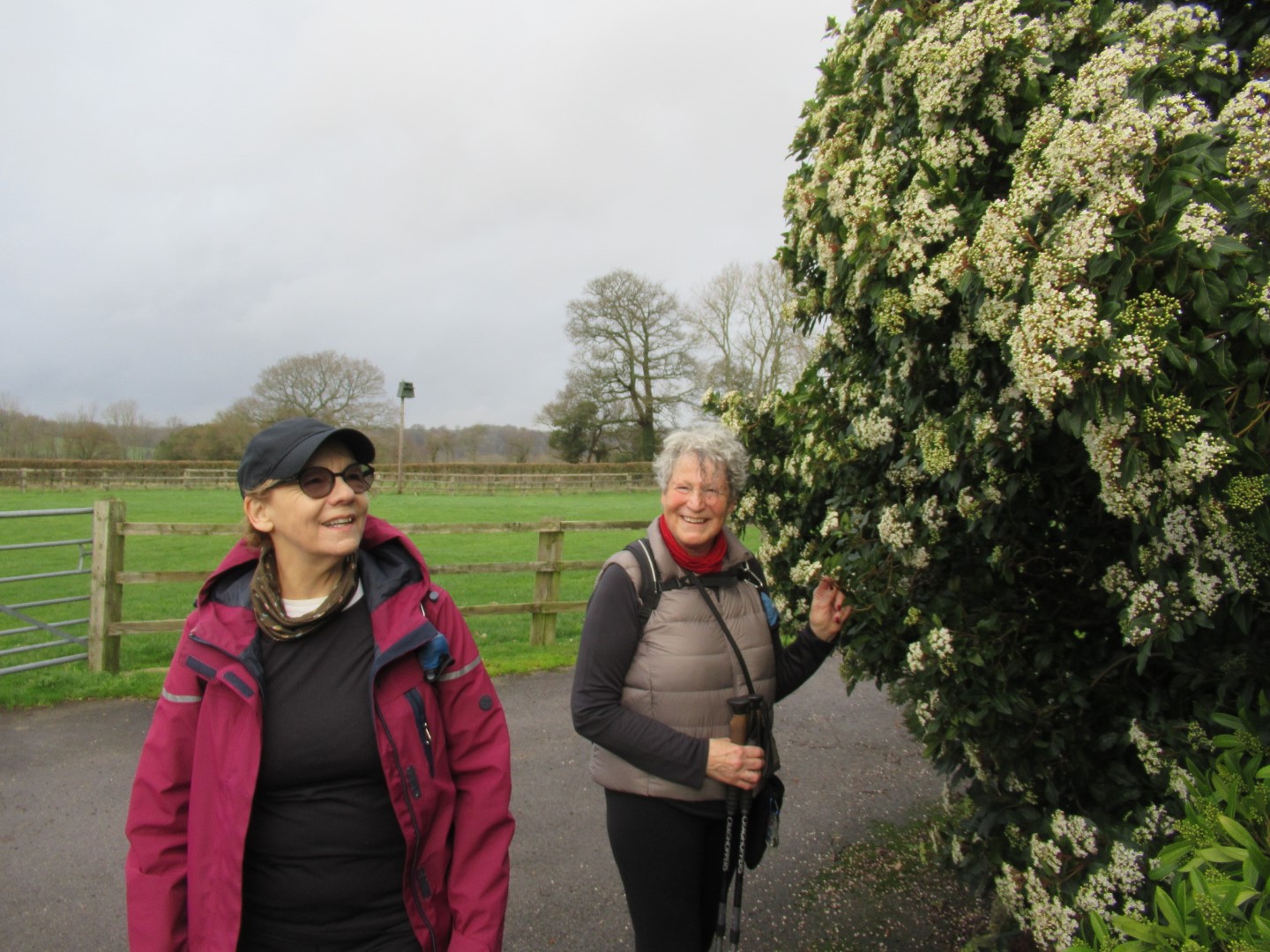
Even in winter, blossoms are happening
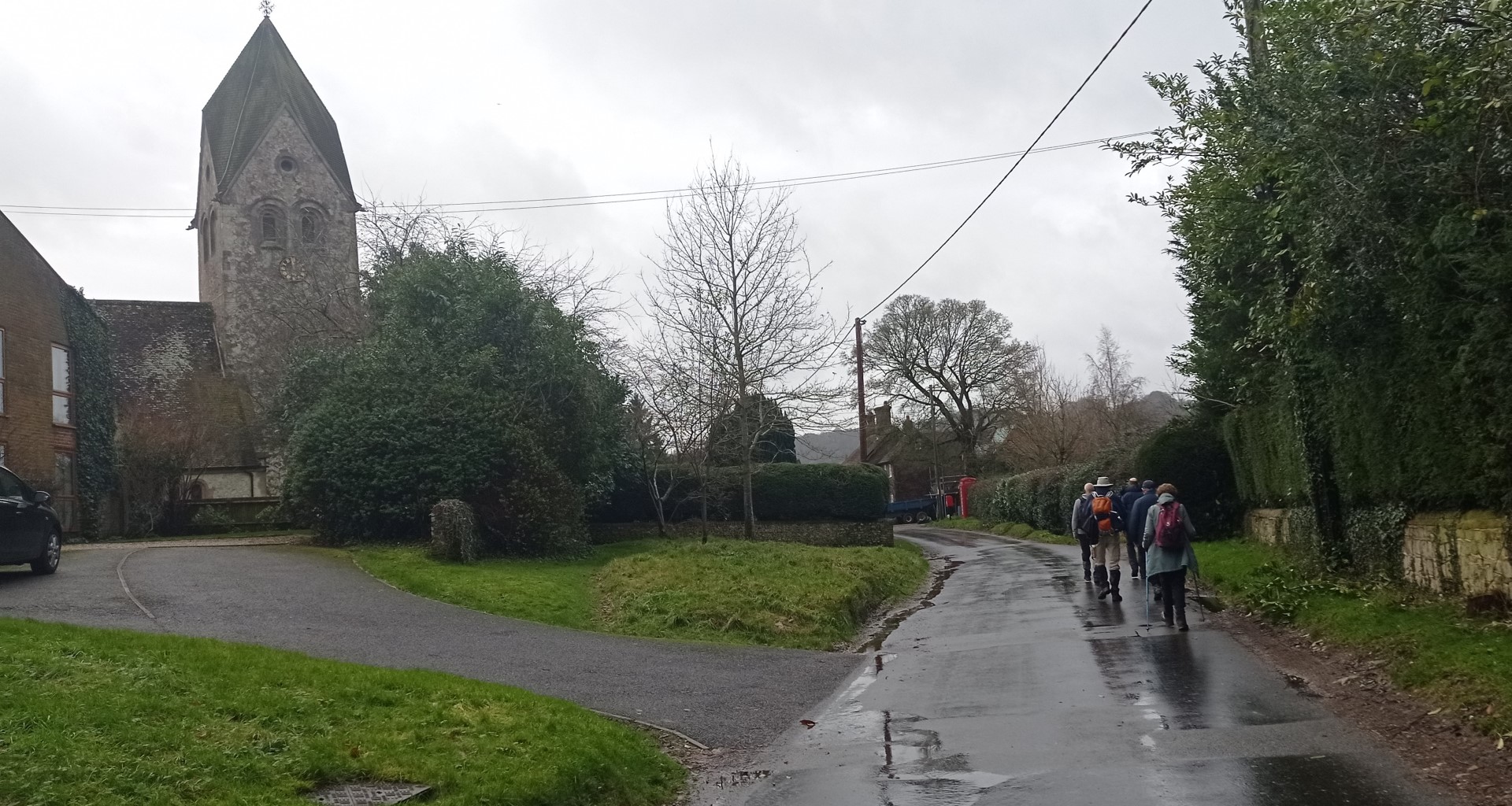
Hawkley Church with an unusual Rhenish helm spire, more common on the continent.
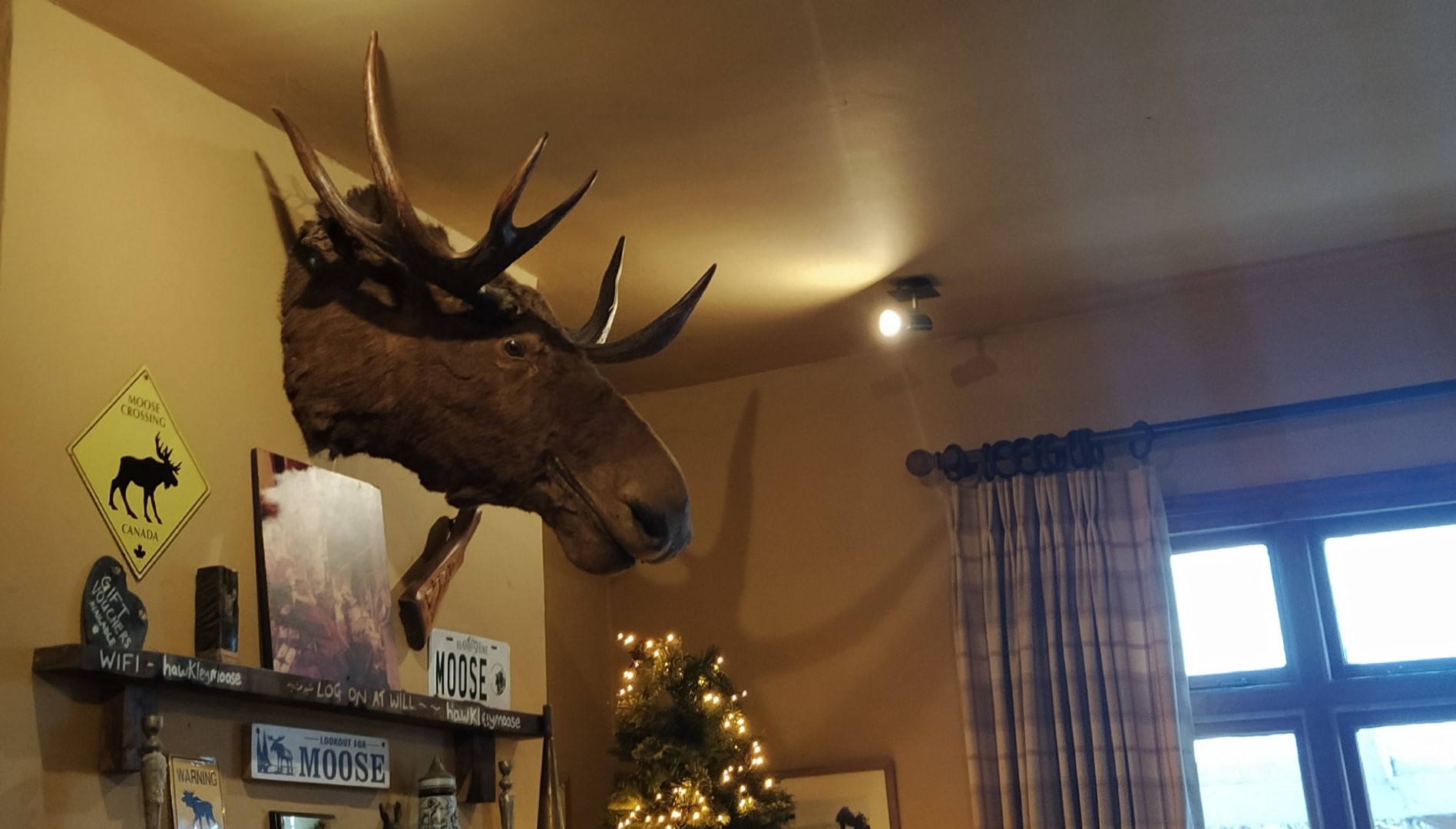
Moose looking down on hungry walkers
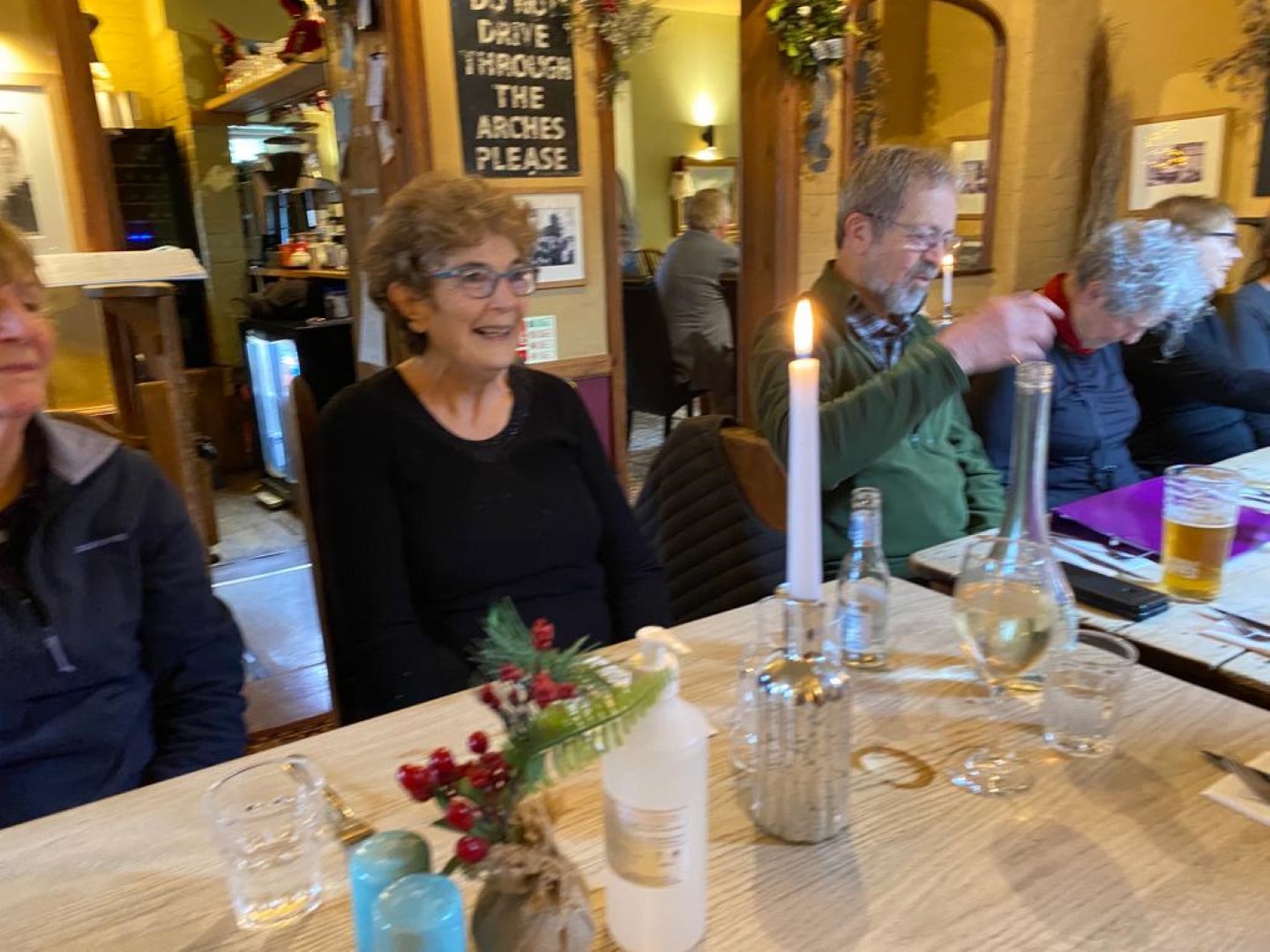
Food now on the way!
.png)
About 5.1/4 miles
West Lavington Walk on 21st December 2022
This was the last walk for the year and Pauline and Linda had a route planned. Isabel had organised the lunch in the Royal Oak marquee. Starting off the rain looked to be heading towards us from the Chichester direction so we were well prepared for a damp walk. We walked the Serpent trail up Dunford Hollow and past Dunford House and Walkers Farm before heading into Goldballs Plantation and The Roughs. Reaching the old Midhurst/Pulborough railway line, we found a good spot to stop for a snack. A sample of 40/40 alcohol went well with a variety of very special nibbles that appeared from various rucksacks and we celebrated the forthcoming holiday in style. We next entered Todham Rough to eventually reach West Lavington. After some road walking we turned up to go past the Kennels and then on towards the Wharf. A climb brought us onto the road in West Lavington and this was the last muddy path we saw as we then took the road back to The Royal Oak. The walkers were joined by several other members of the club for a splendid Christmas lunch.
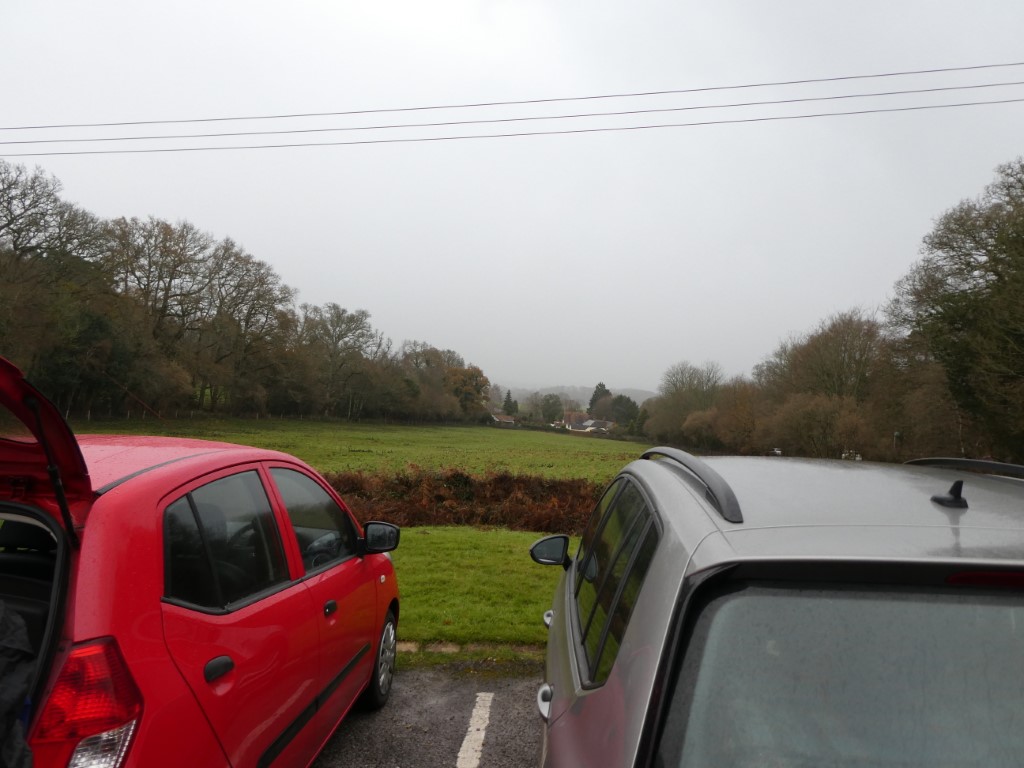
From this spot you can usually see the South Downs. Is that rain coming our way?
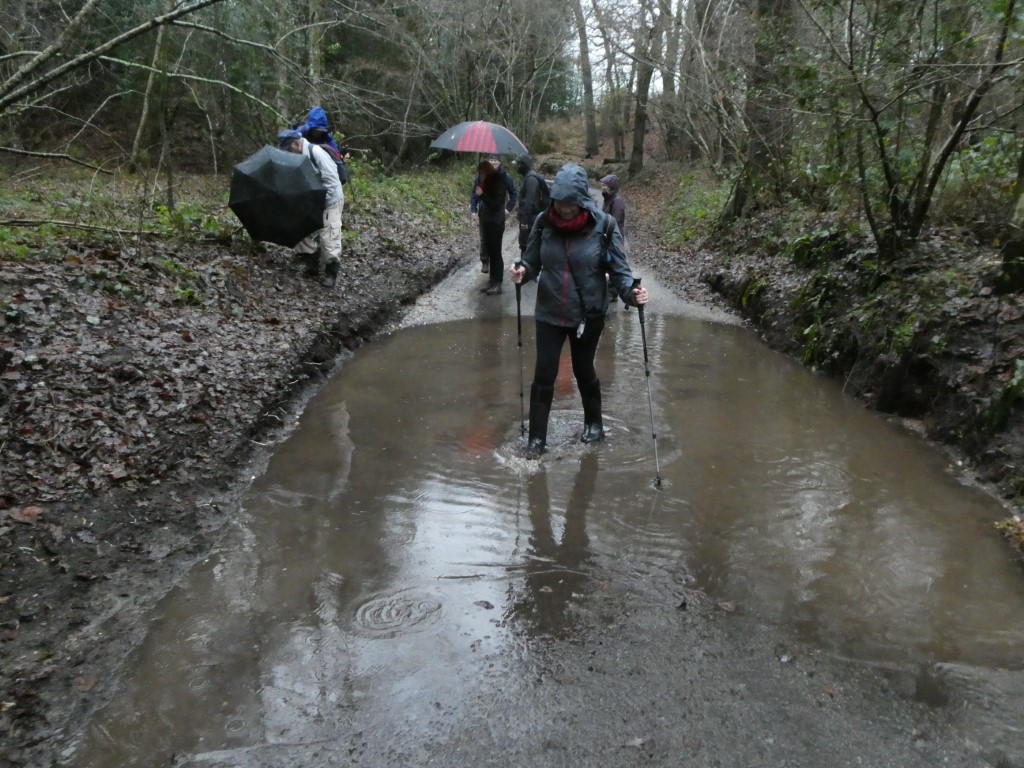
Well, maybe it will be a little damp
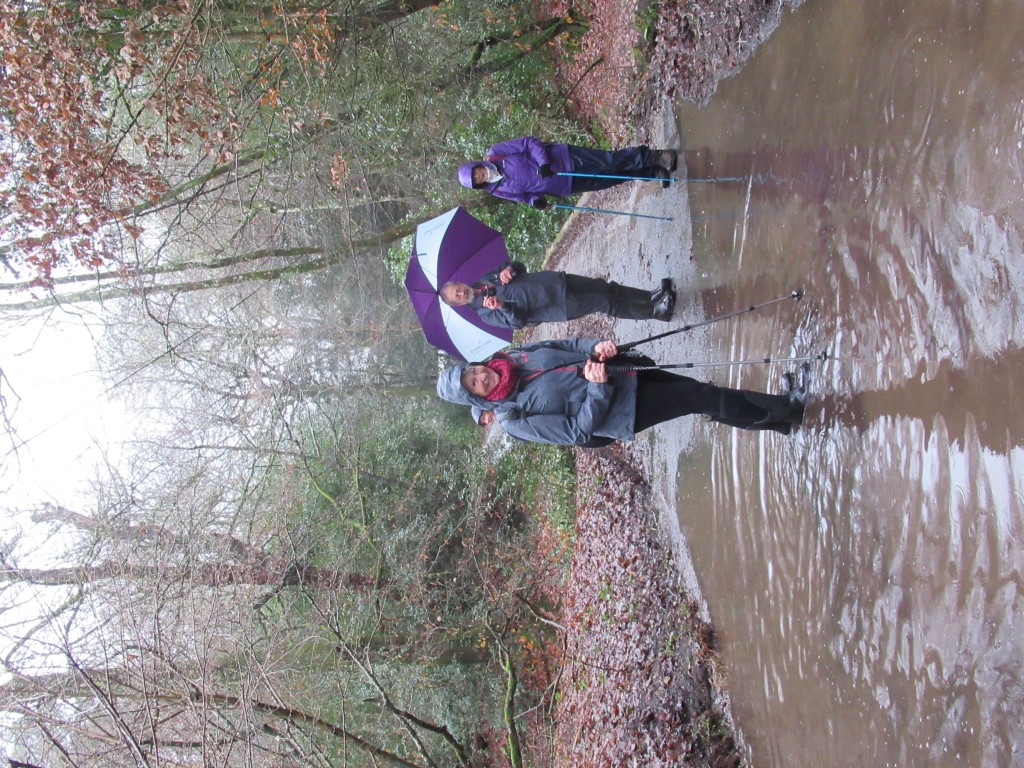
Welly boots can be really useful
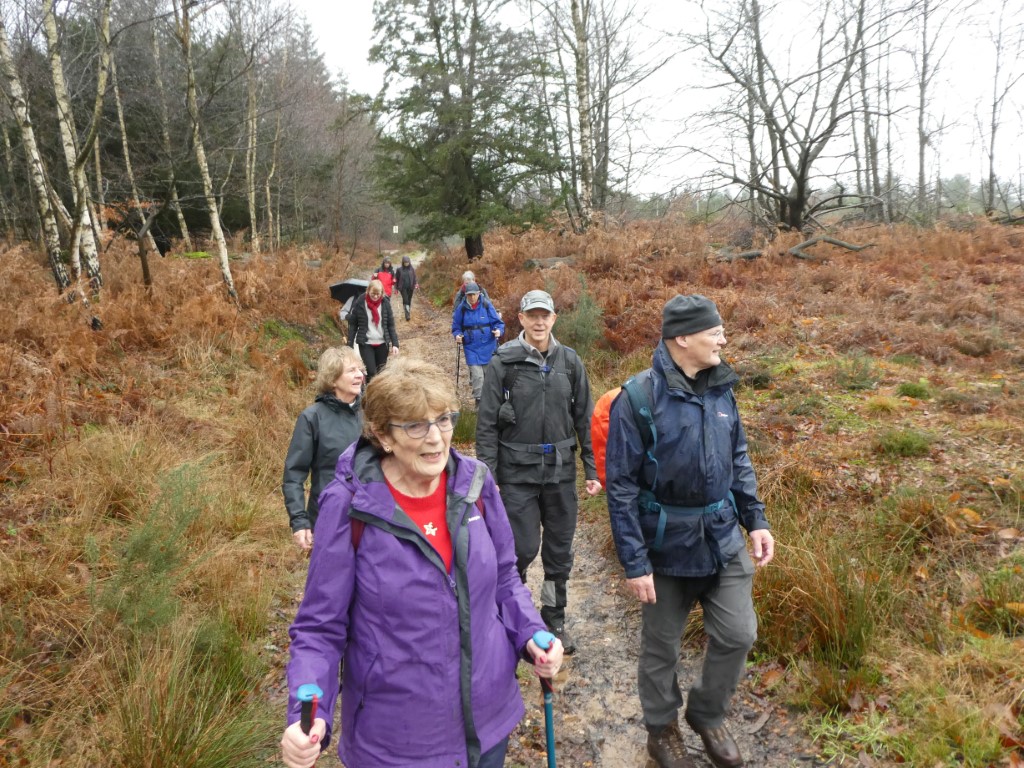
But it wasn't always raining
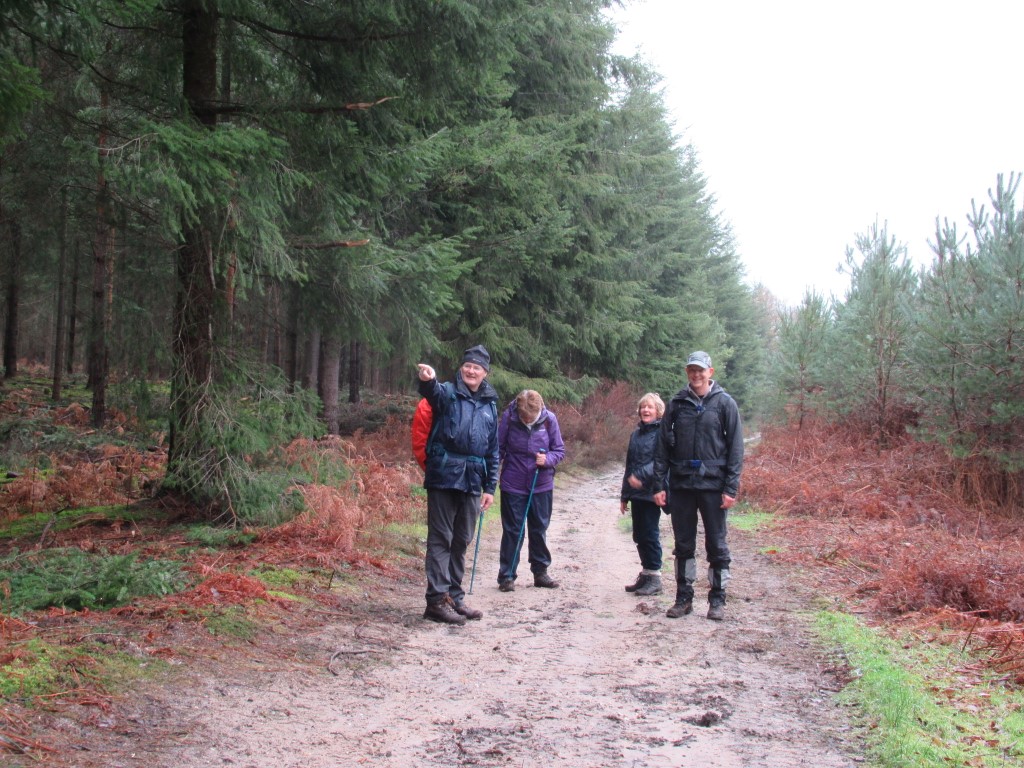
Oh no! People in the woods - who's hiding over there?
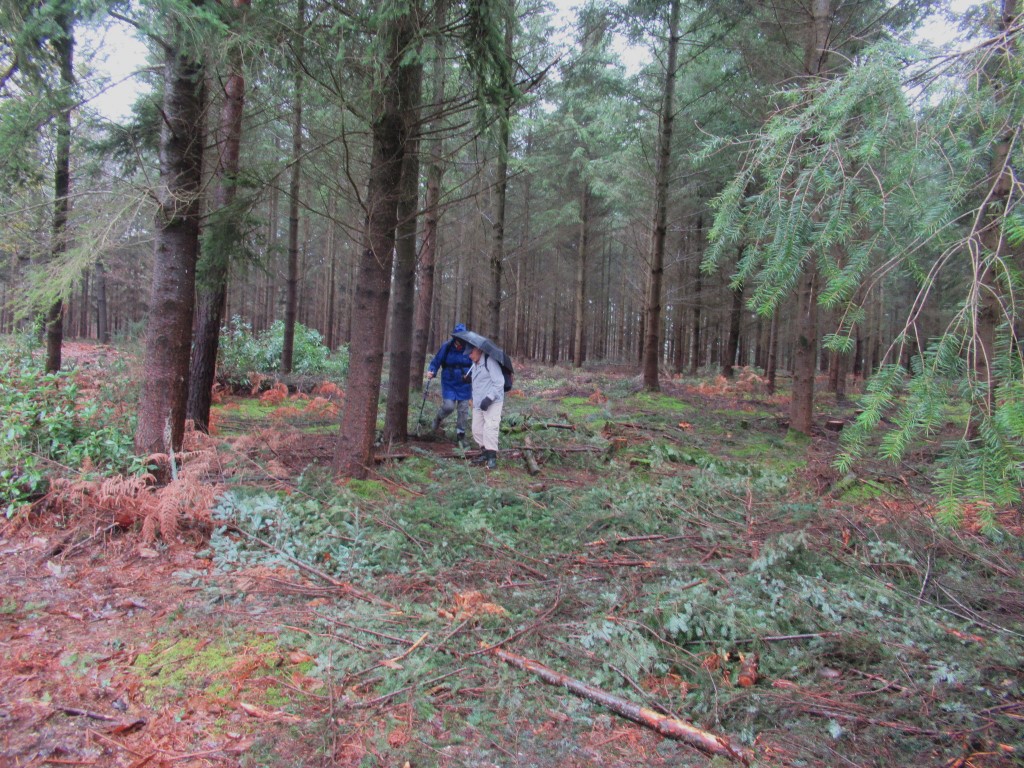
Ah it's OK, they're with us.
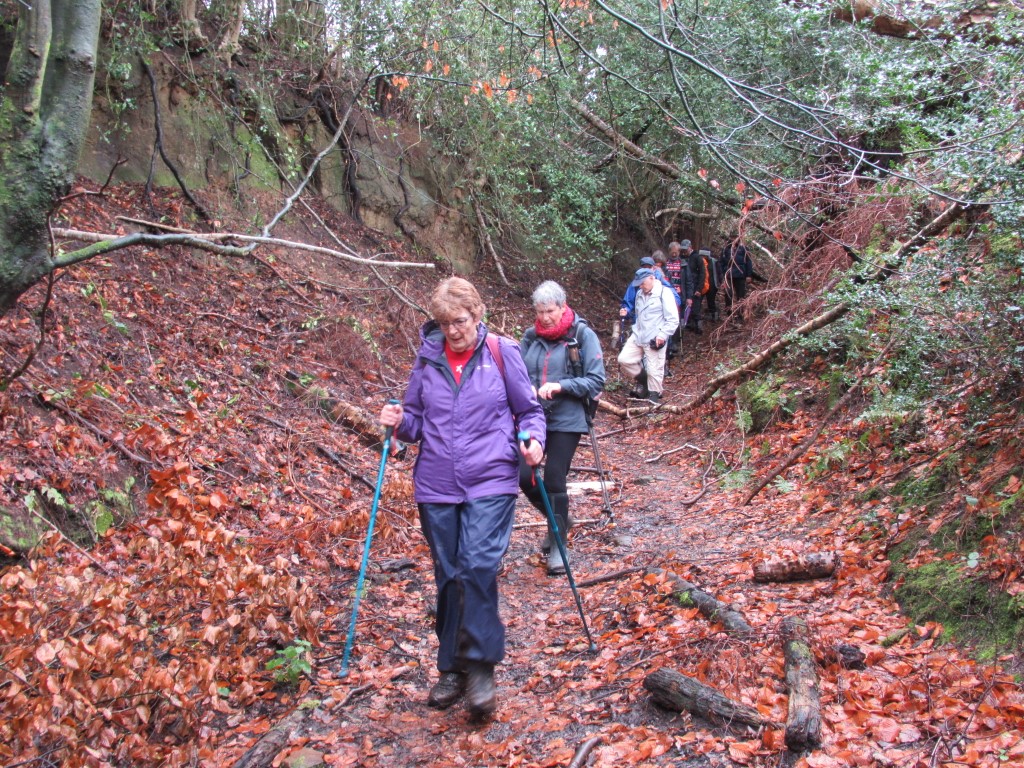
Tramping down a gully
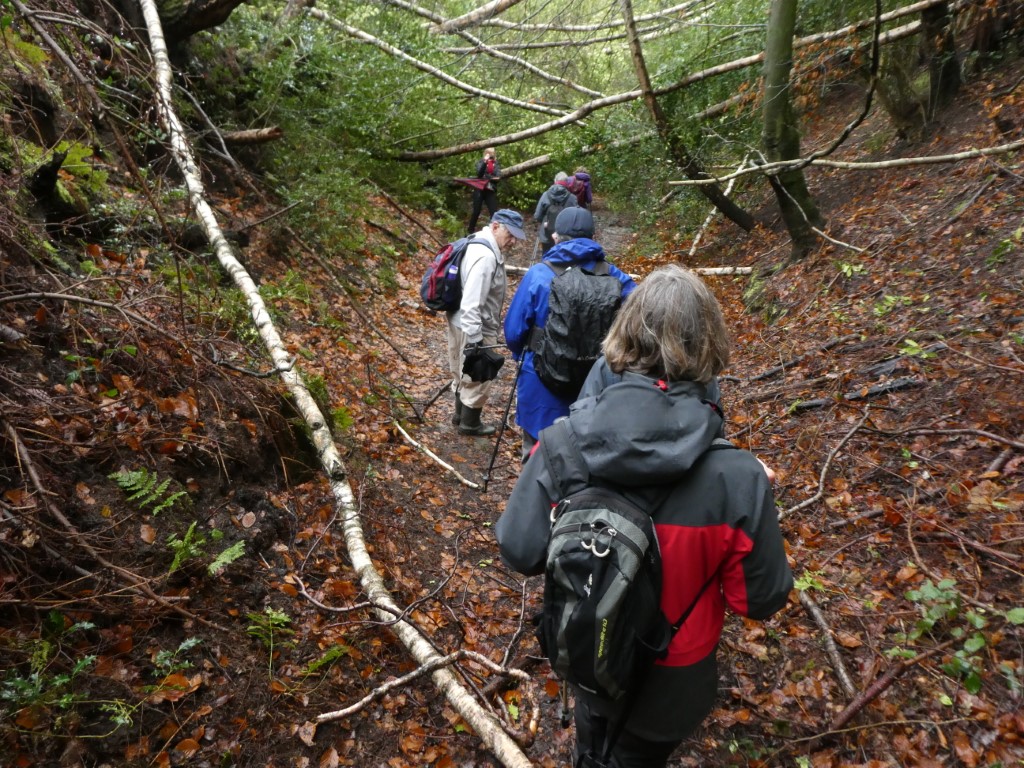
But at least there's no mud here.
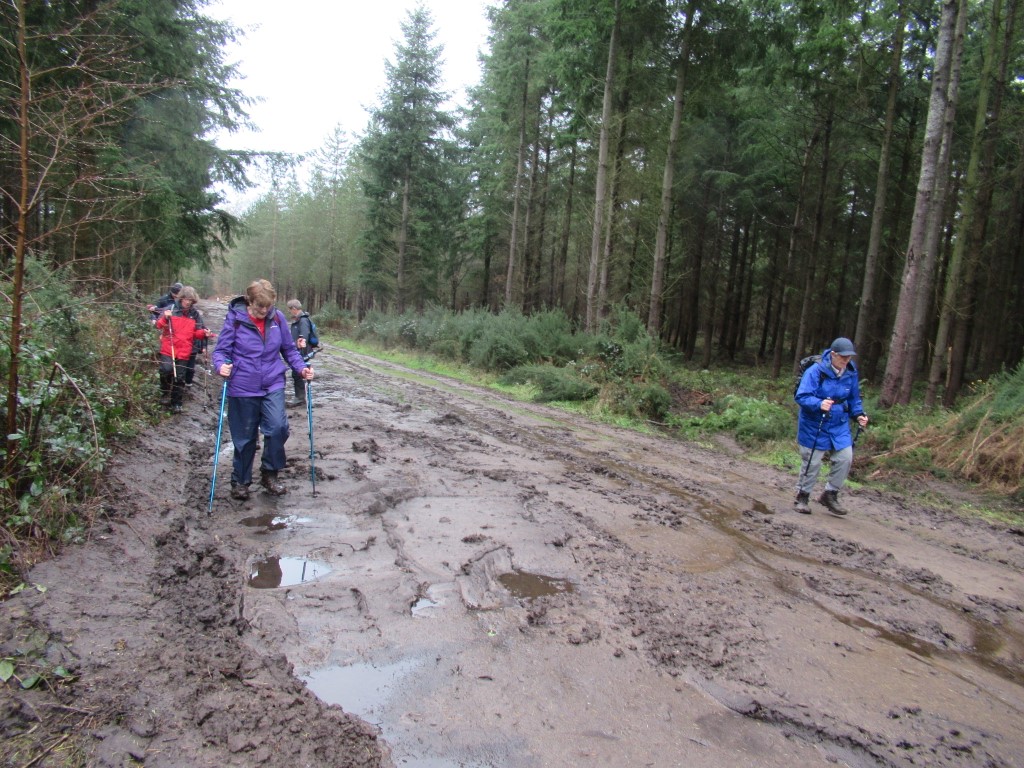
It wasn't really as bad as it looks!
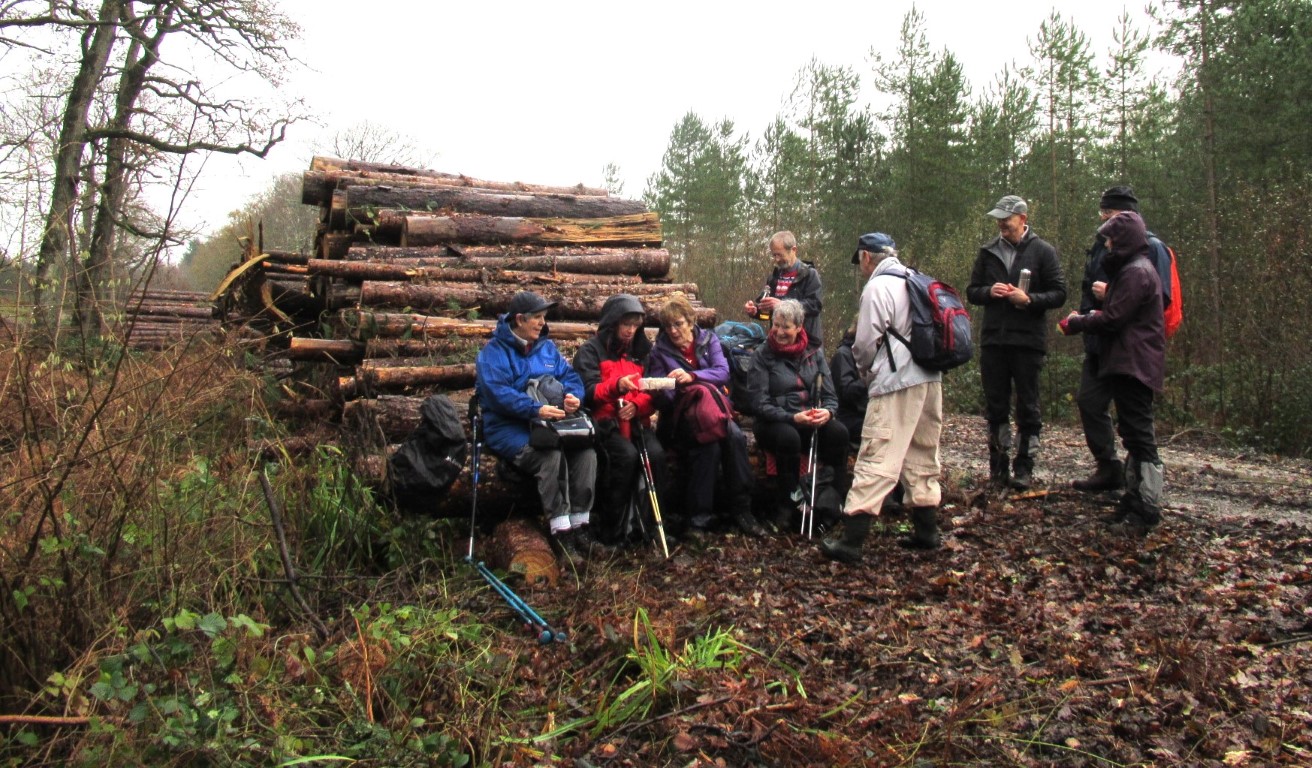
Time for a bite
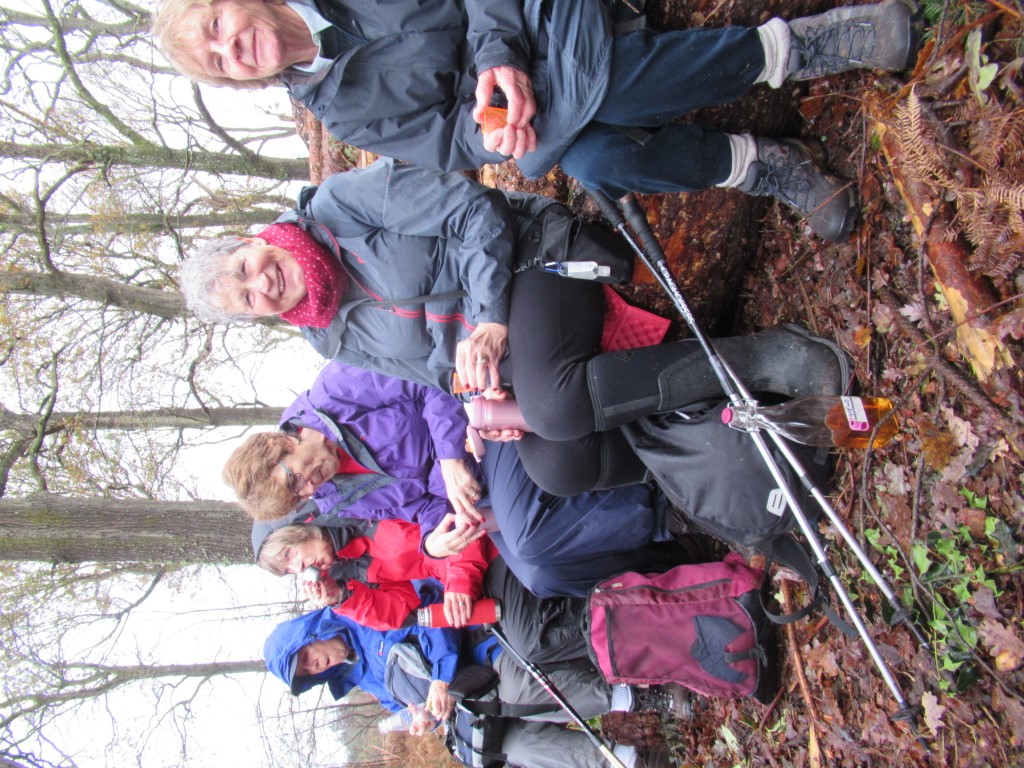
and a wee drink
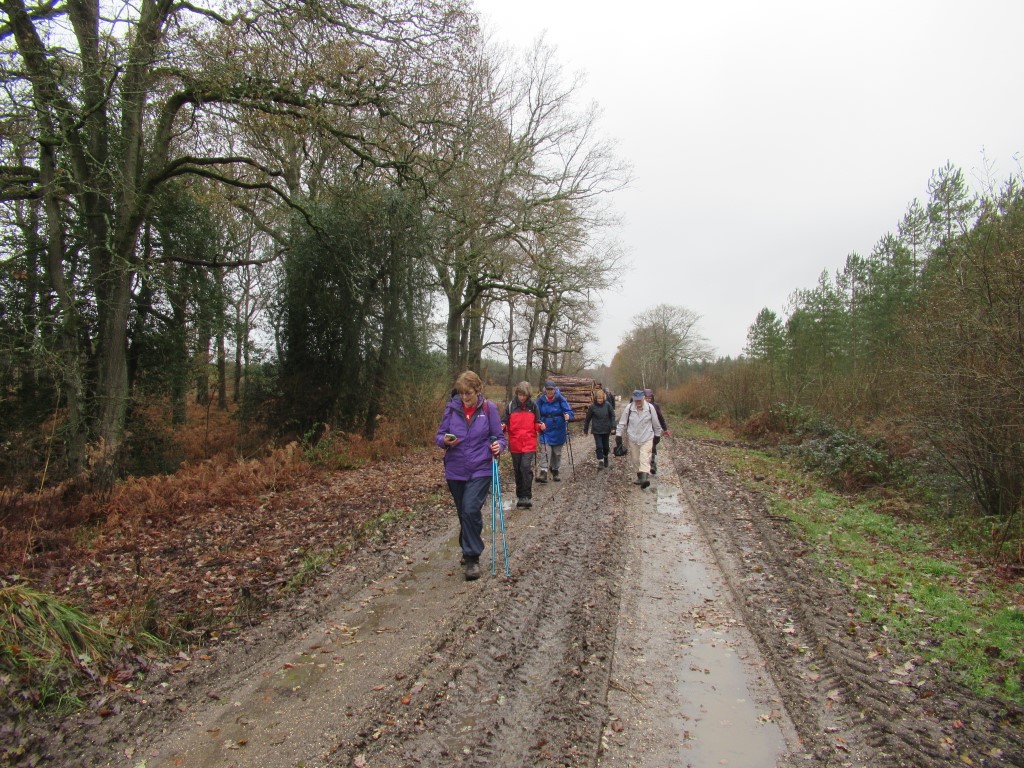
Break over, let's find a way to the pub
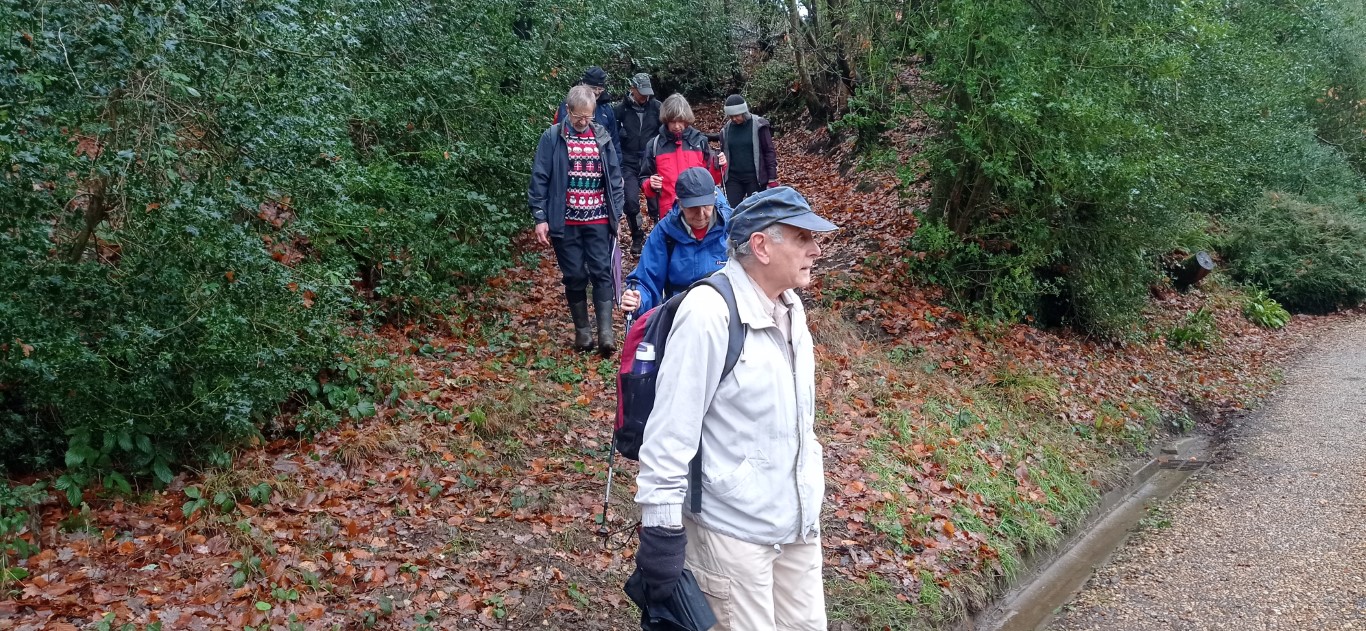
West Lavington, here we come
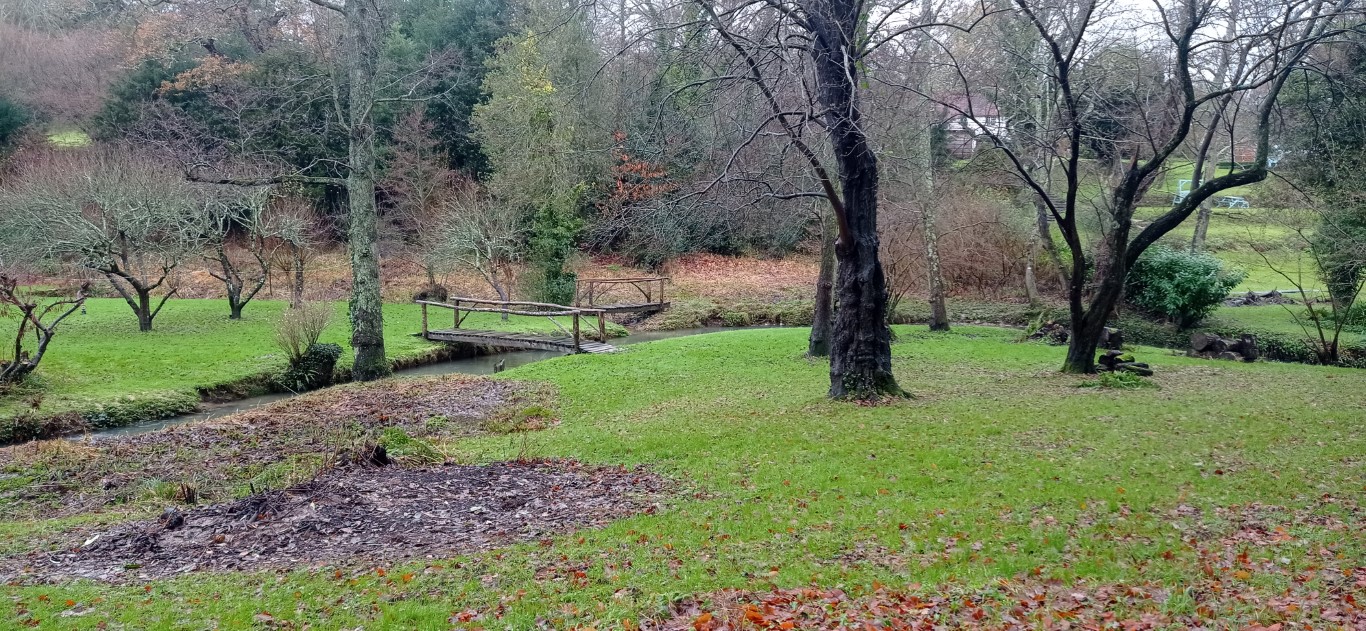
Bridge over untroubled water
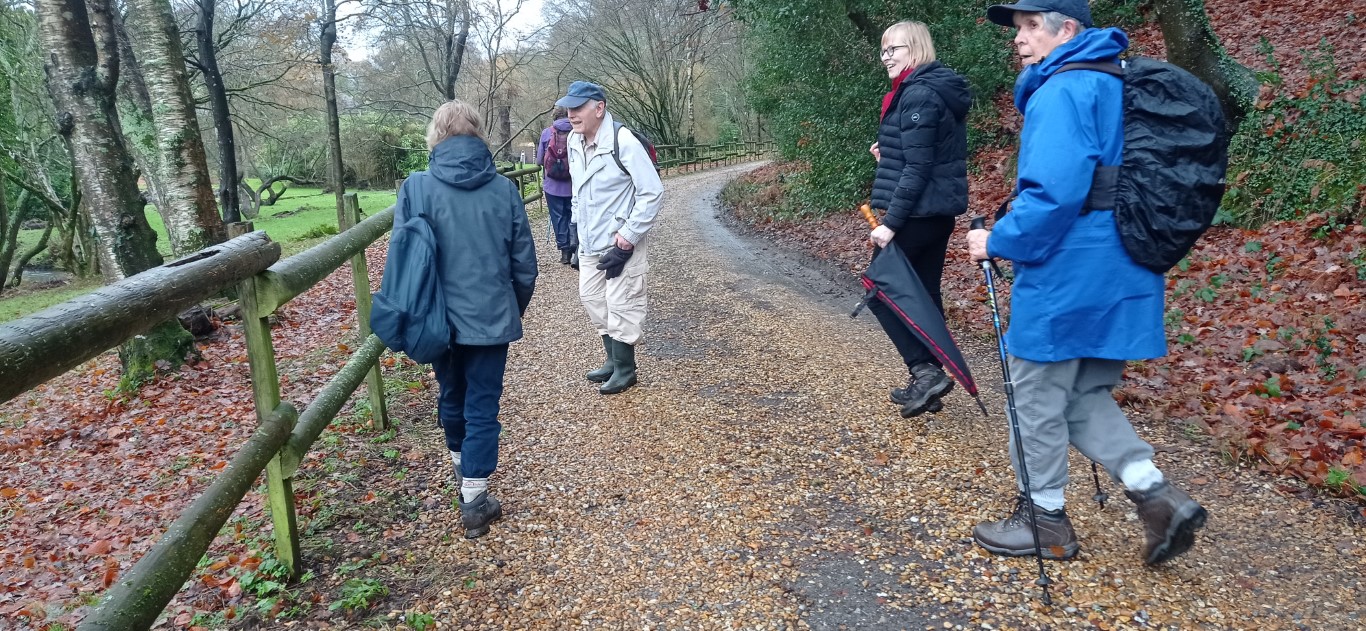
No mud here
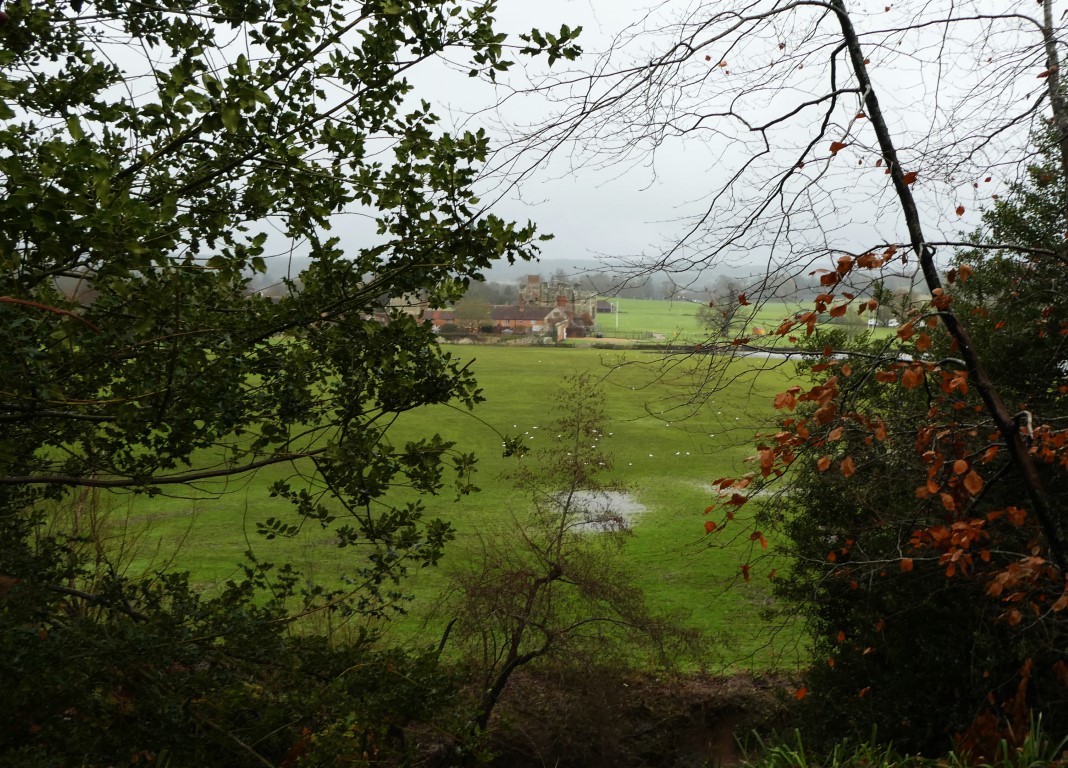
Cowdray House in the gloom
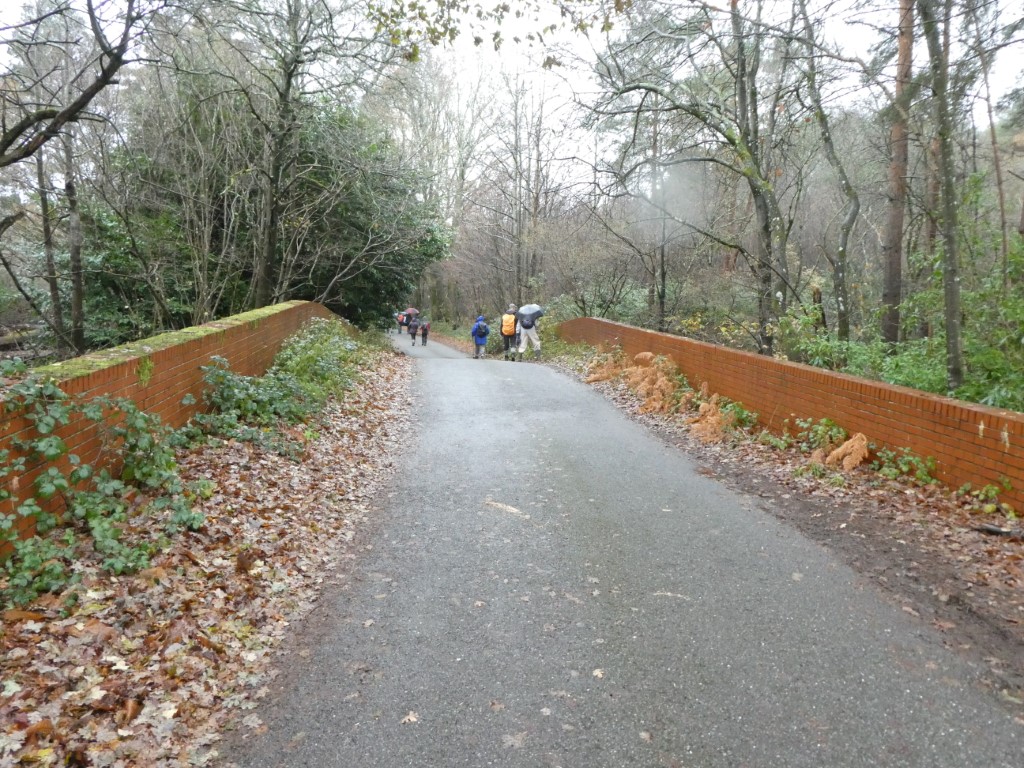
Bridge over the Midhurst to Pulborough railway line
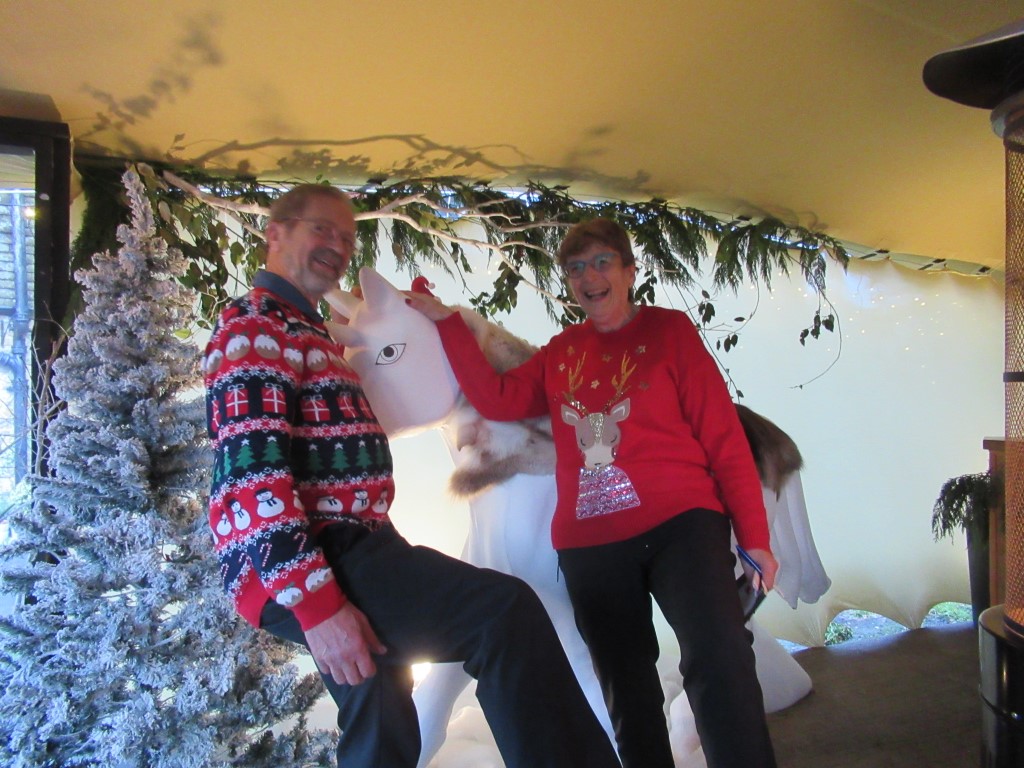
Ah, back in the Pub
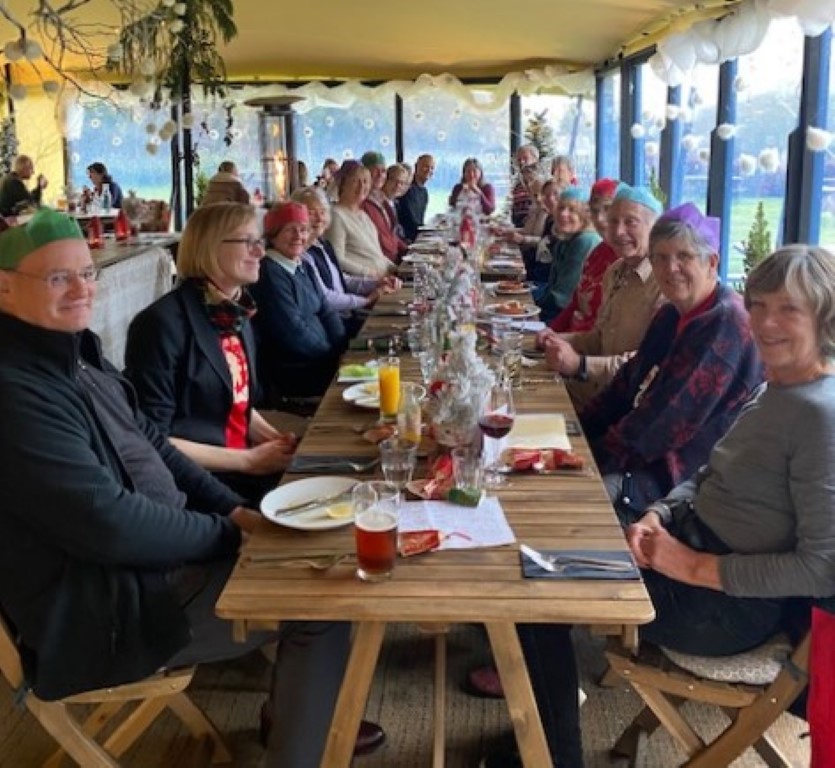
Happy Christmas!
.png)
About 5.2 miles.
Midhurst walk on 14th December 2022
Winter has at last arrived with frost everywhere and parts of the country covered in snow. This wasn't the case for us, but the temperature was around freezing all morning. Bernard led us from the Grange Centre in Midhurst up the Jubilee Path, on the New Road before finally turning off towards Midhurst Common, with the old Midhurst to Chichester railway sheds to our left. Passing under Sunset Hill, we briefly took the Serpent trail before crossing the A272 and taking the New Lipchis Way past Woolbeding House and the beautifully tended gardens. The walk follows the River Rother as far as the mill pond where we turned towards Midhurst town to find the Causeway leading to the ruins of Cowdray House. Building started from 1520 and the work was largely completed by about 1530. Famous visitors to this grand house were Henry VIII, Edward VI and Elizabeth I, amongst others. A fire in 1793 left the house the ruin we see today, although the decay has been controlled by restoration work in both the 20th and 21st centuries. We walked further along the Rother as far as The Wharf before heading back to the Grange car park. A good lunch was enjoyed in Red H, the restaurant now occupying the site of the old Three Horseshoes public house.
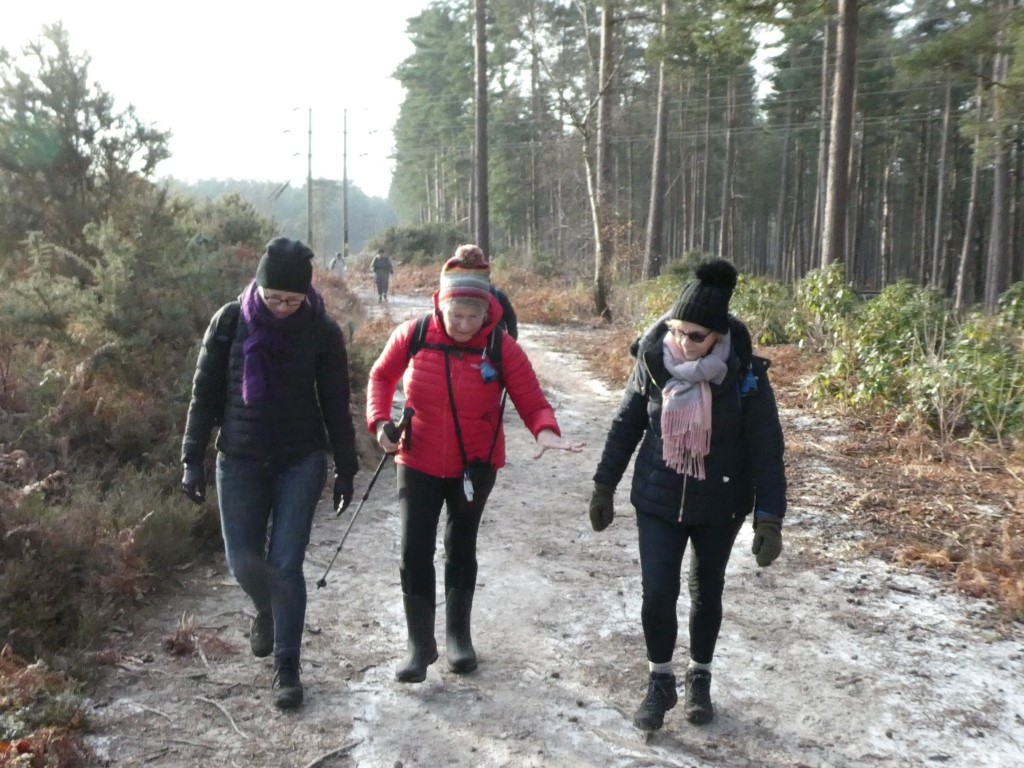
"Now, be very careful, there's some ice here"
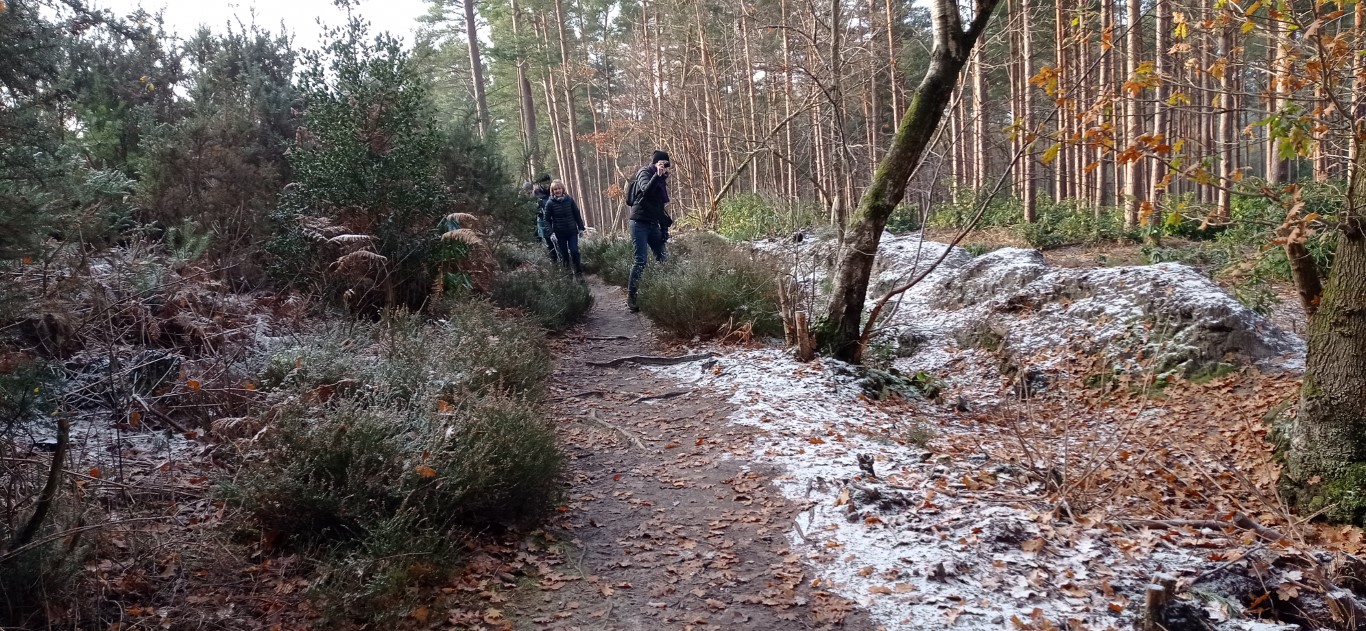
"and be careful of hiding photographers"
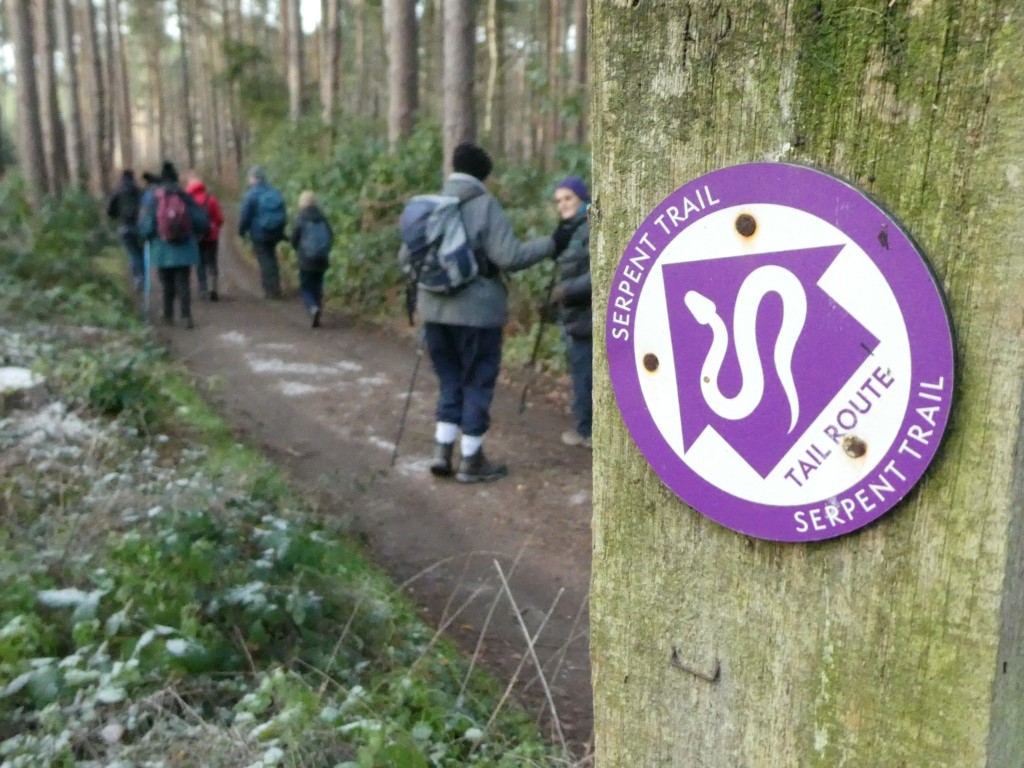
Midhurst Common, on the Serpent Trail
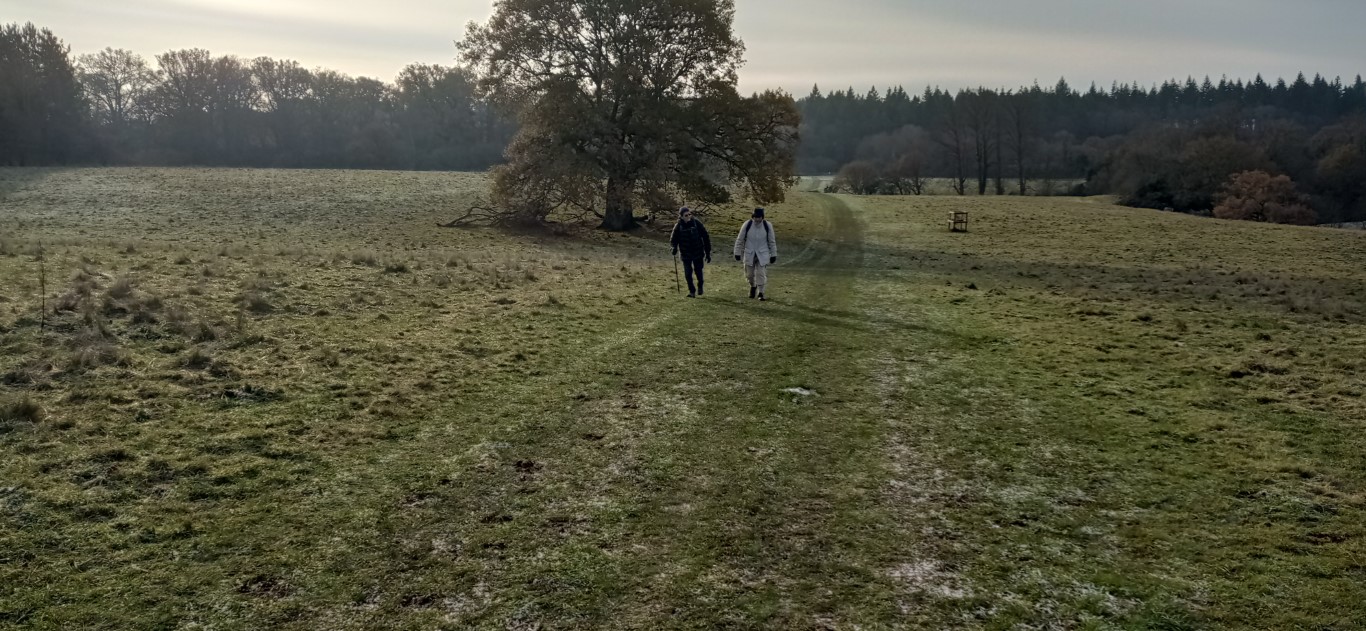
Approaching Whiphill Wood, on the River Walk also known as the New Lipchis Way
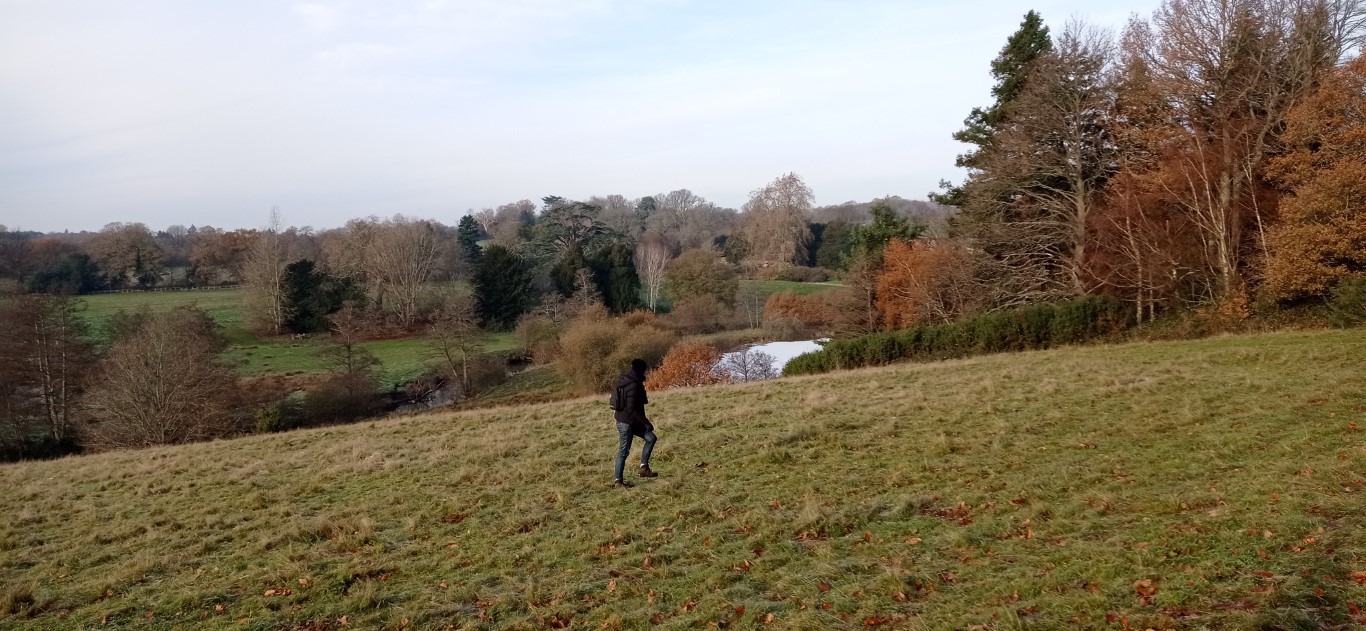
Autumn colours still in Whiphill Wood
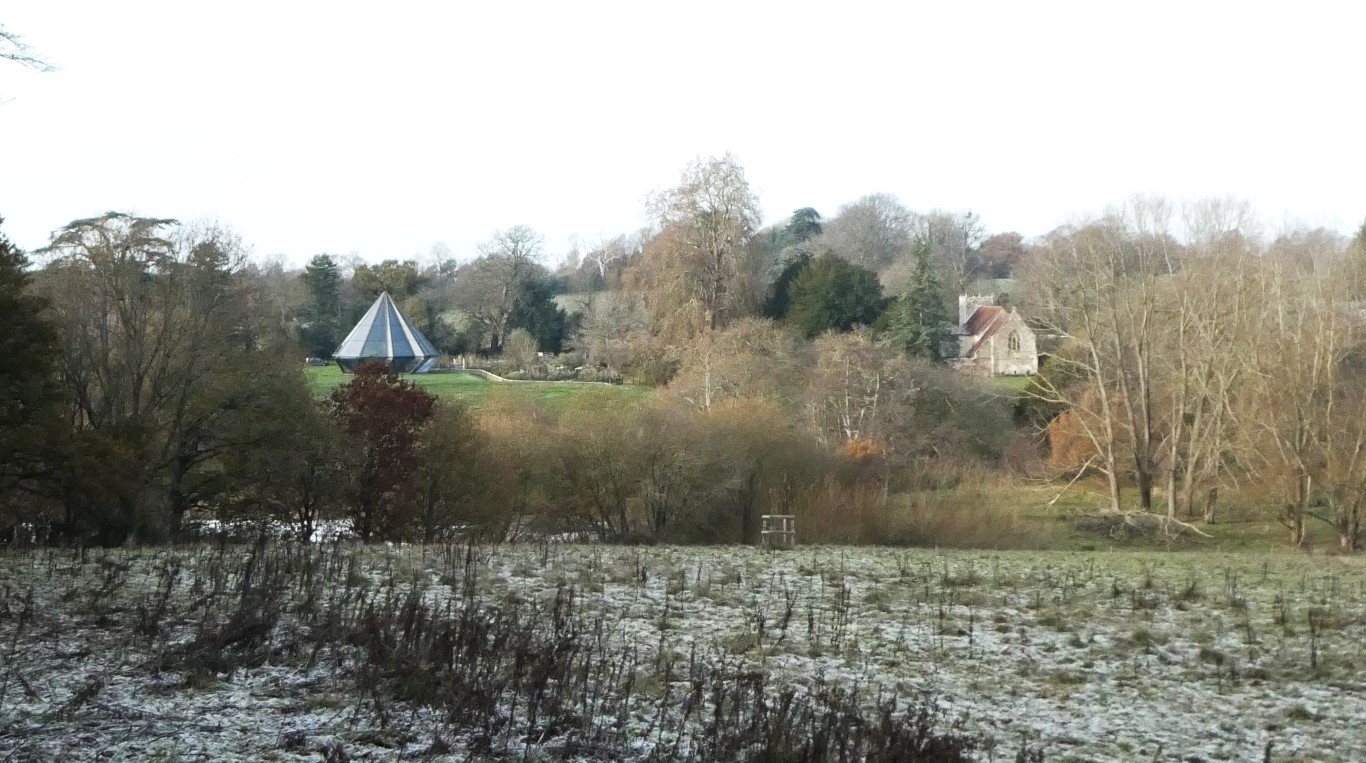
Woolbeding Glasshouse 21st Century, All Hallows 7th Century, probably then made of timber and thatch.
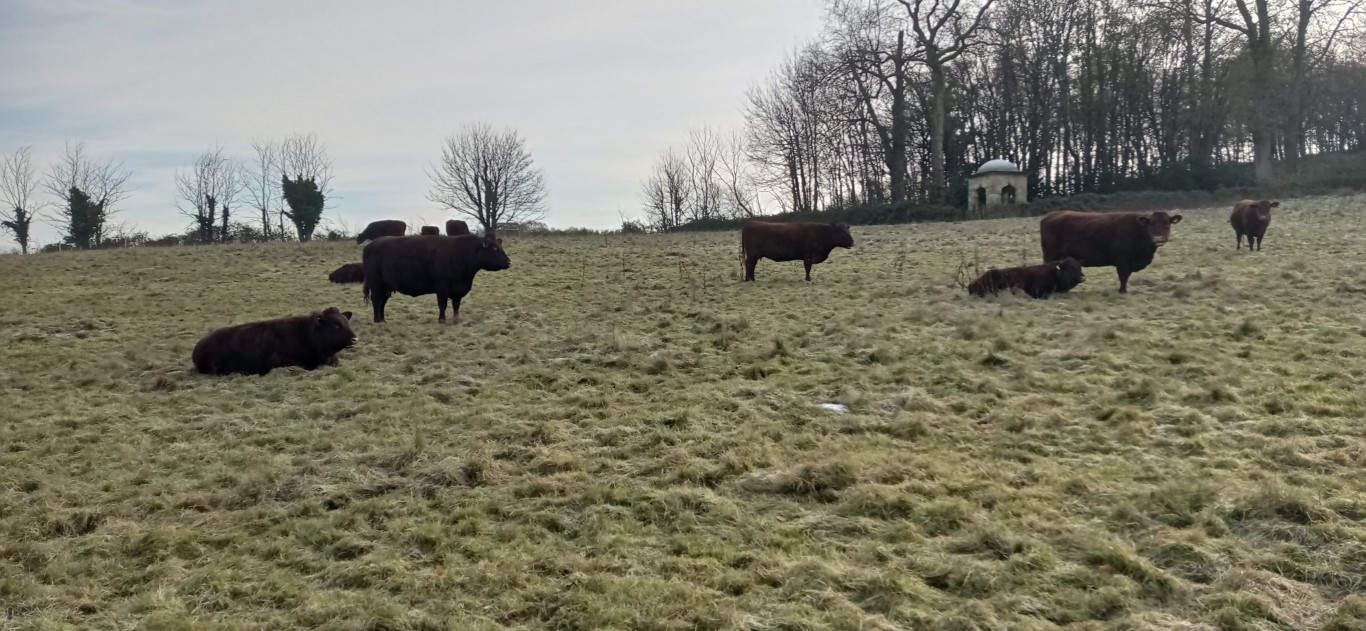
Cattle not especially interested in the folly on the hill
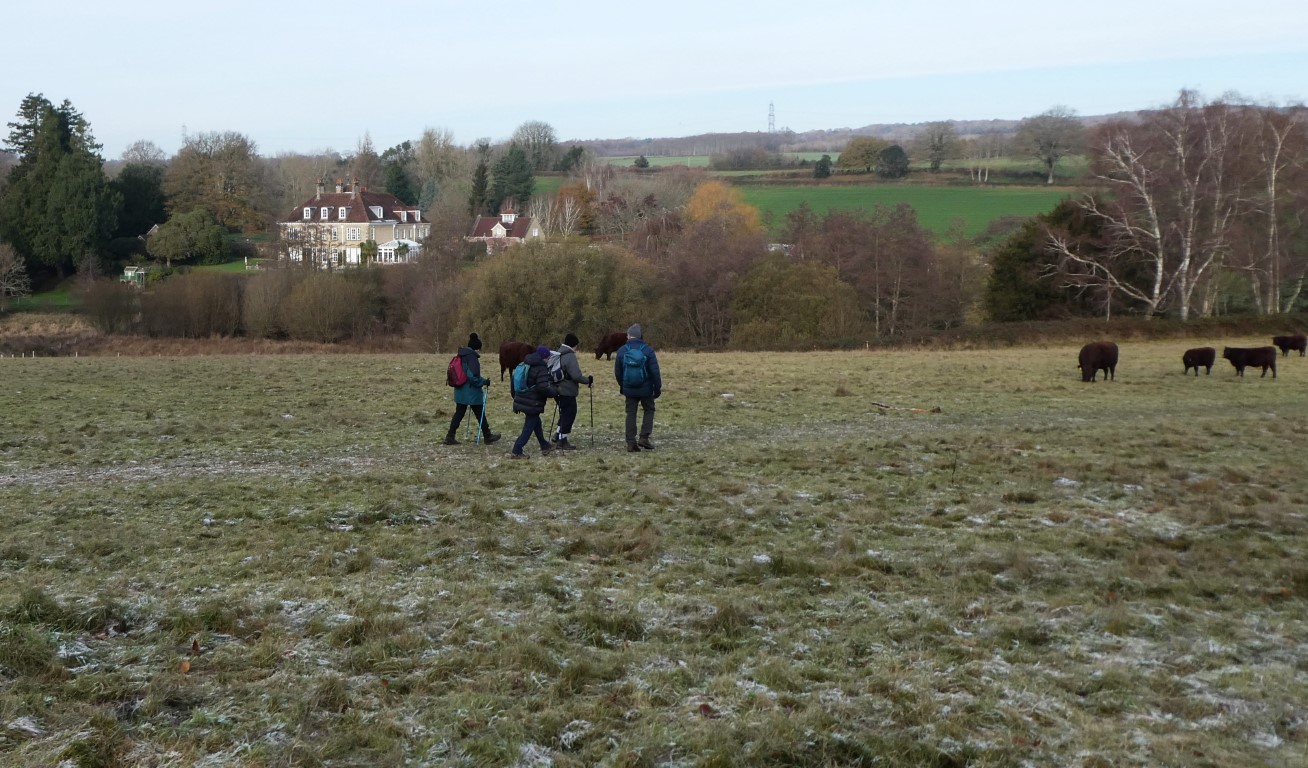
Walking through the valley described by Disraeli as "the greenest valley with the prettiest river in the world"
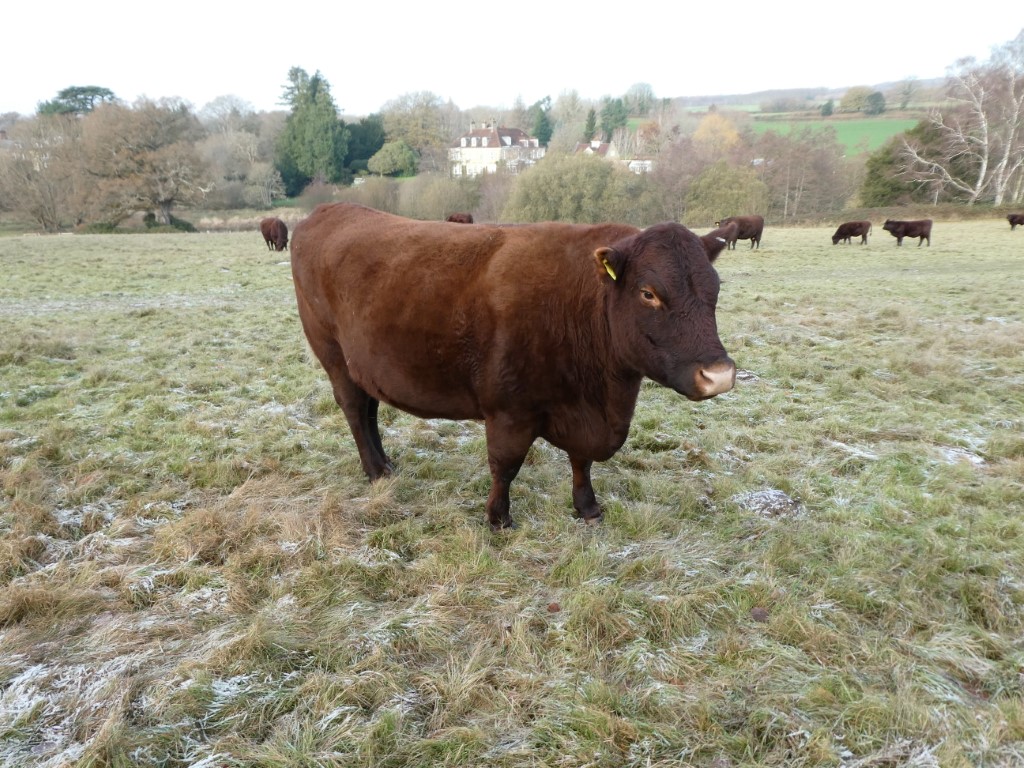
"and I'm the prettiest cow in the world"
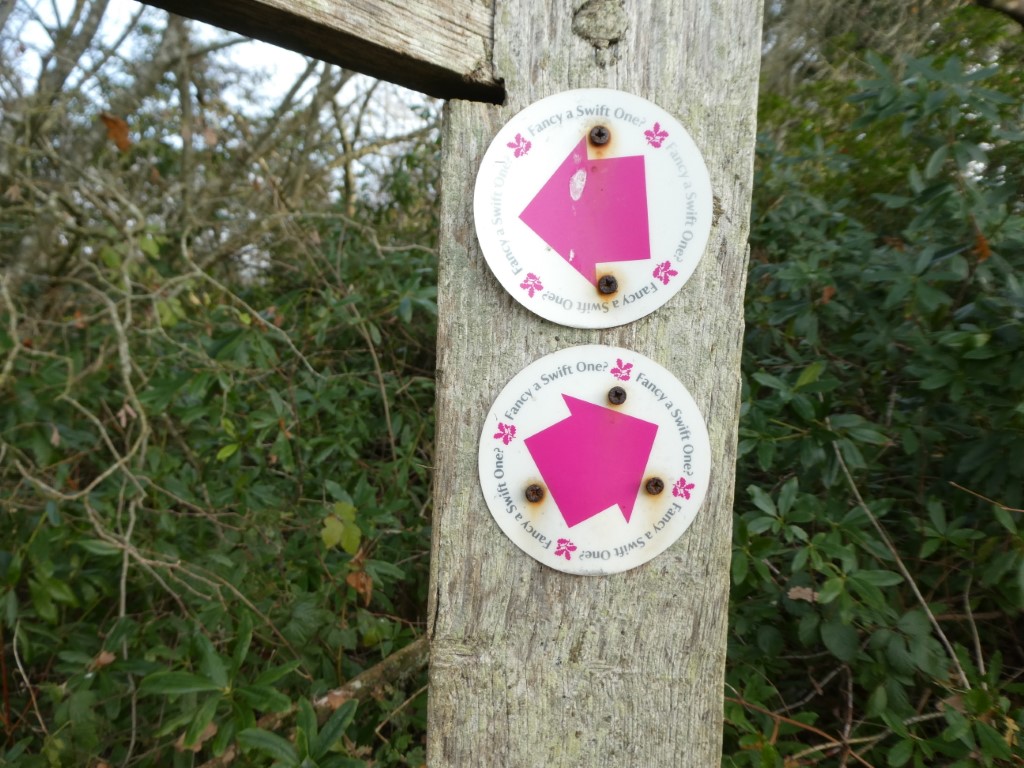
"Fancy a Swift One" is the name given to some National Trust walks throughout the country
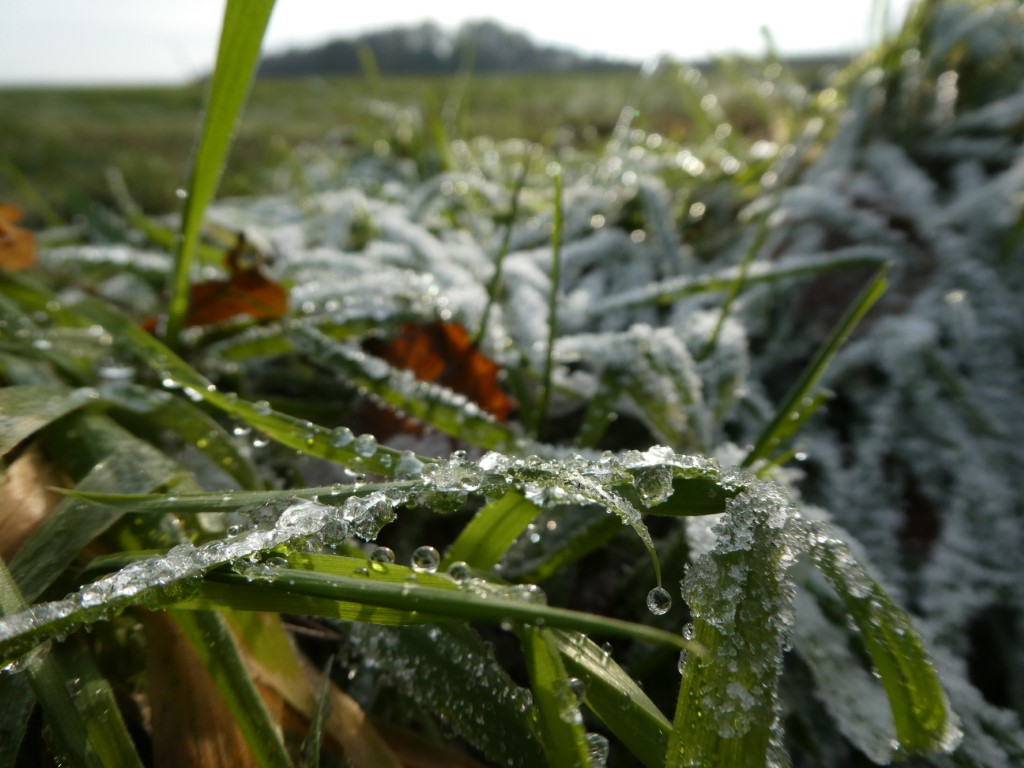
The sun was trying hard to melt the frost
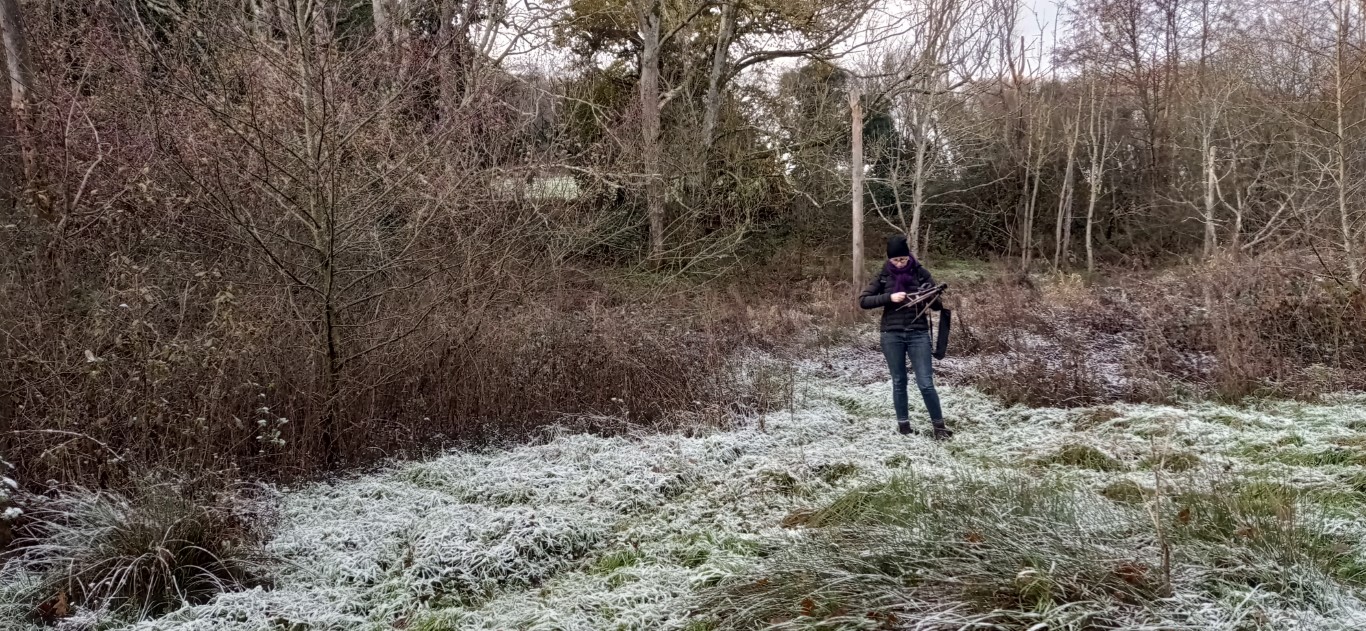
Photographer setting up
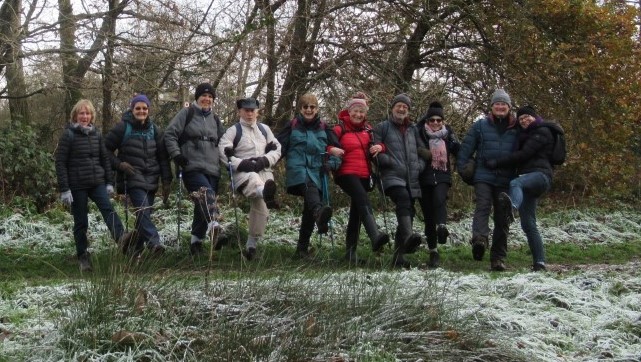
Result!
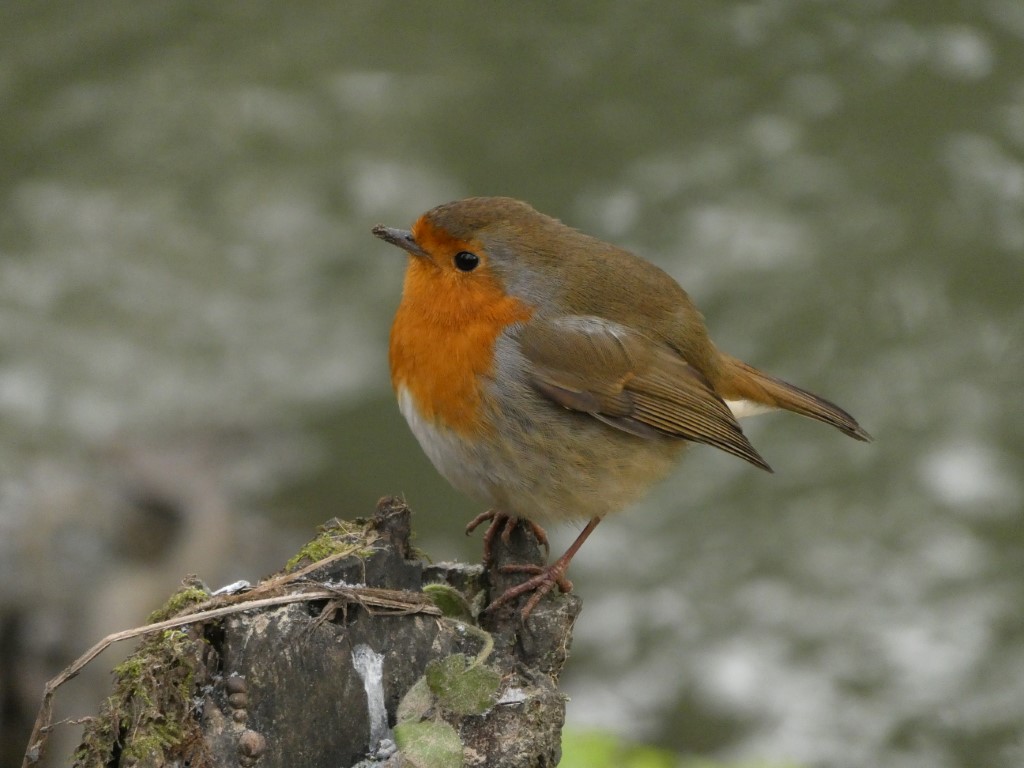
Robin wasn't impressed
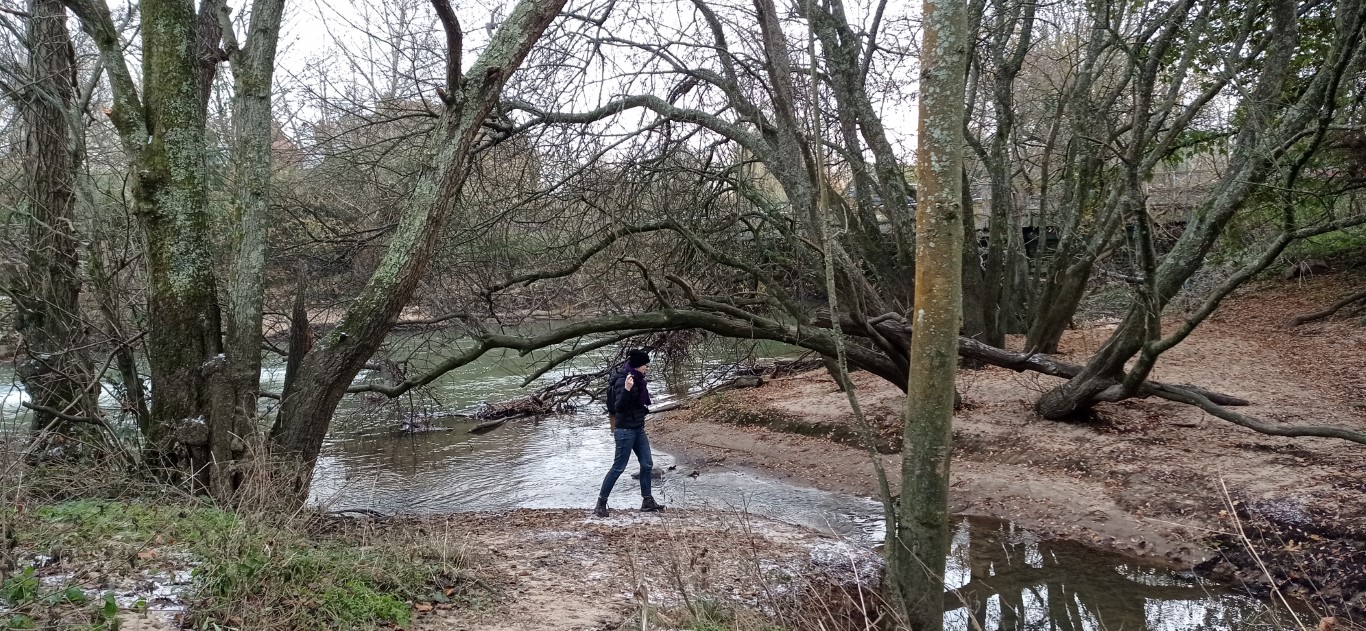
Mill pond and weirs on the Midhurst/Easebourne border.
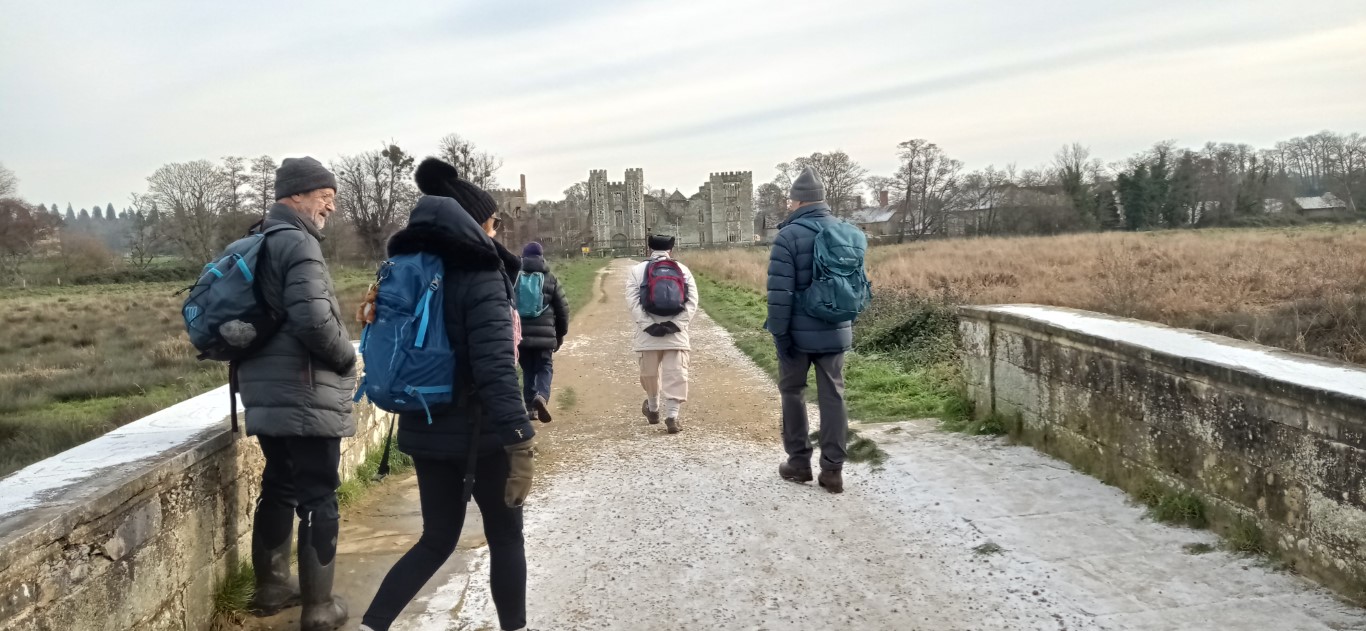
The Causeway to Cowdray House ruins
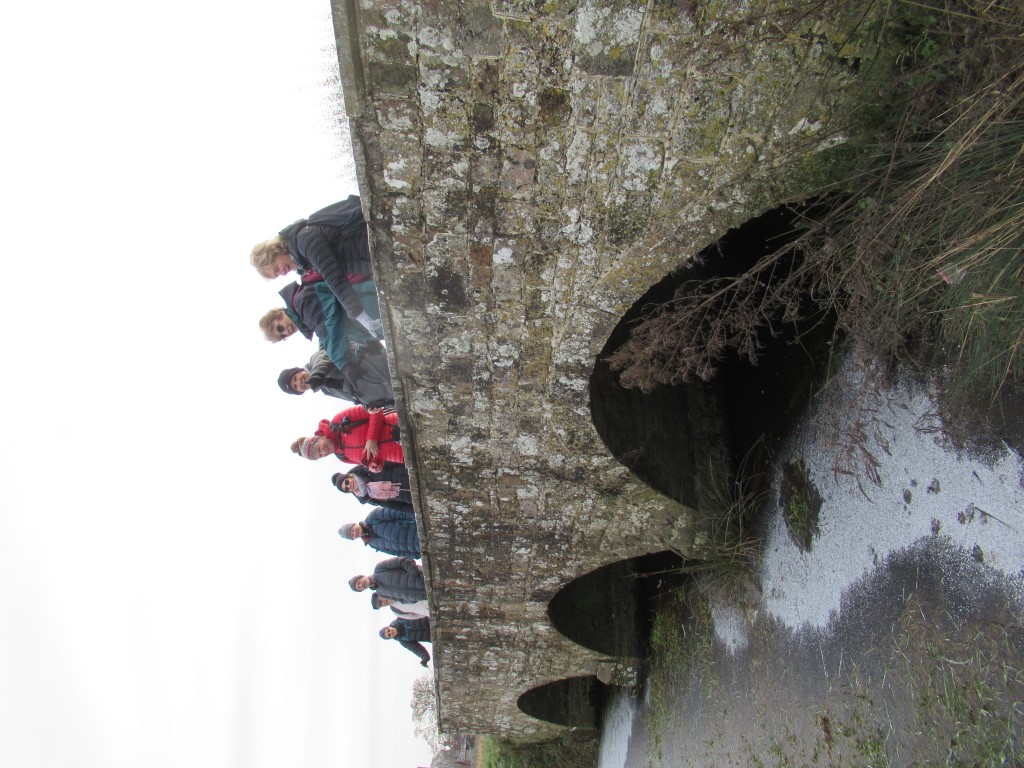
Oh no, more ice!
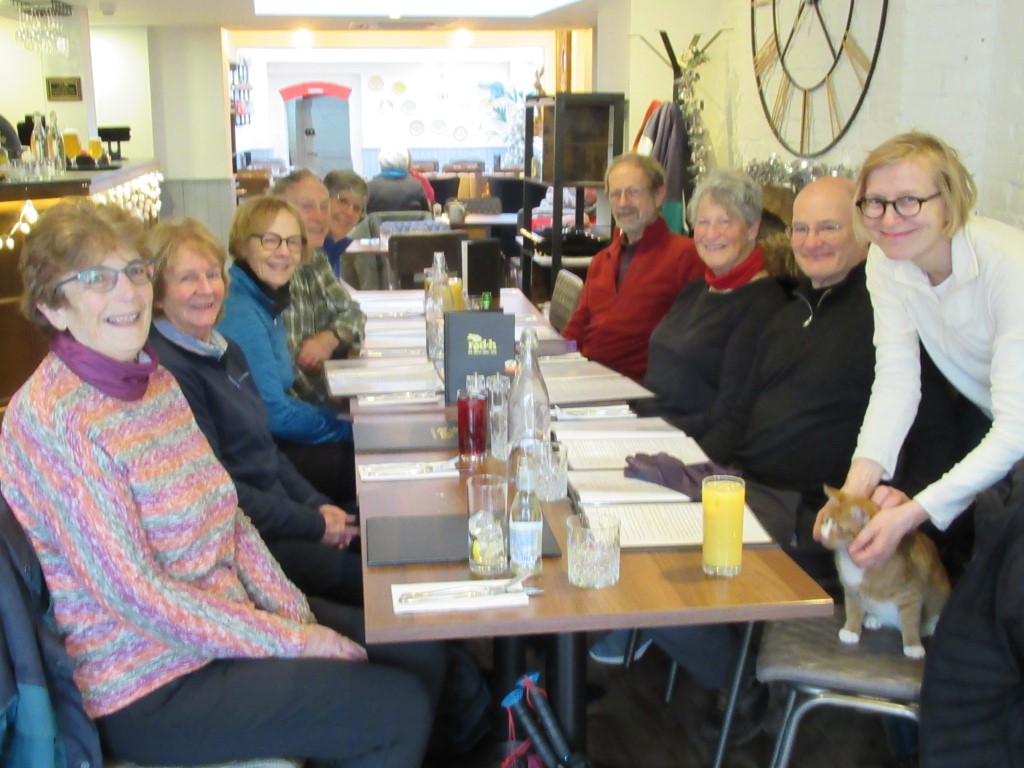
Walk over, warm at last!
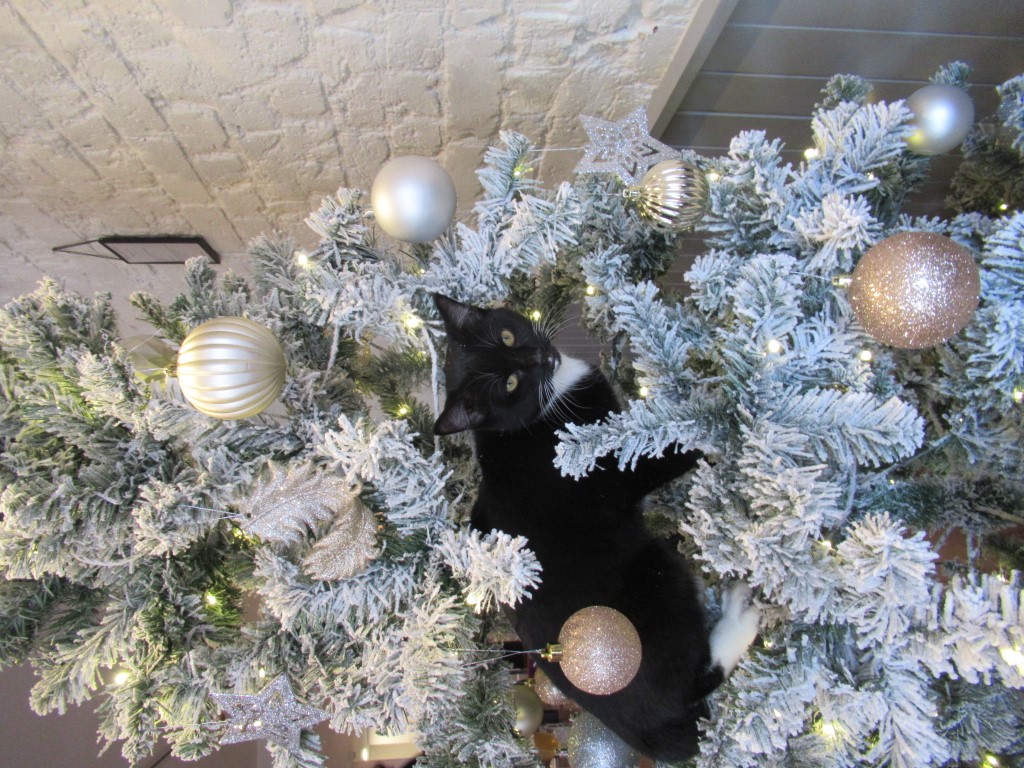
Thinks he's the cats whiskers
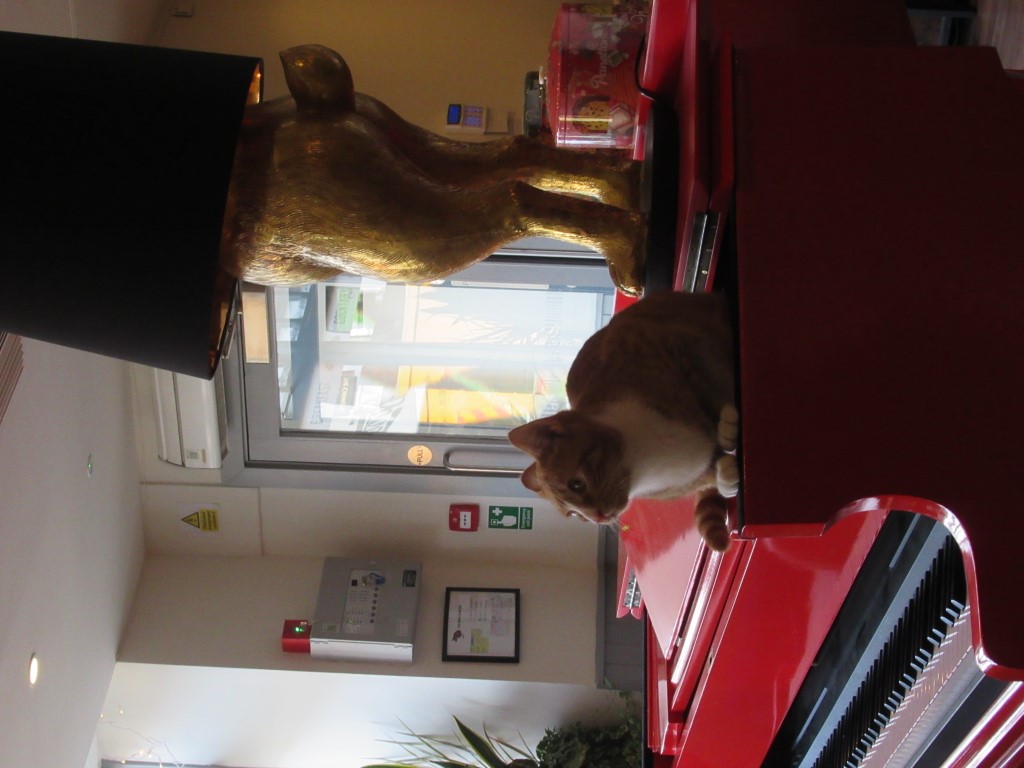
Cat Stevens?
.png)
About 4.1/2 miles.
Recent galleries
- Fittleworth walk on 18th February 2026
- Midhurst walk on 11th February 2026
- Milland walk on 4th February 2026
- Lynchmere Walk on 28th January 2026
- Walderton walk on 14th January 2026
History
2026
2025
- December (3)
- November (4)
- October (5)
- September (4)
- August (4)
- July (5)
- June (4)
- May (5)
- April (4)
- March (5)
- February (3)
- January (4)
2024
- December (3)
- November (5)
- October (4)
- September (4)
- August (4)
- July (4)
- June (5)
- May (5)
- April (5)
- March (5)
- February (5)
- January (4)
2023
- December (3)
- November (6)
- October (5)
- September (5)
- August (3)
- July (4)
- June (6)
- May (5)
- April (4)
- March (5)
- February (4)
- January (4)
2022
- December (4)
- November (5)
- October (5)
- September (3)
- August (4)
- July (6)
- June (11)
- May (4)
- April (5)
- March (4)
- February (5)
- January (4)
2021
2020
- December (4)
- November (1)
- October (5)
- September (4)
- August (3)
- July (3)
- March (2)
- February (5)
- January (3)
2019
- December (2)
- November (5)
- October (4)
- September (3)
- August (4)
- July (4)
- June (11)
- May (5)
- April (4)
- March (3)
- February (5)
- January (5)
2018
- December (2)
- November (4)
- October (4)
- September (5)
- August (4)
- July (3)
- June (5)
- May (8)
- April (4)
- March (4)
- February (5)
- January (3)
2017
- December (3)
- November (5)
- October (3)
- September (4)
- August (4)
- July (4)
- June (11)
- May (4)
- April (4)
- March (3)
- February (4)
- January (5)
2016
- December (3)
- November (4)
- October (5)
- September (4)
- August (3)
- July (6)
- June (11)
- May (4)
- April (5)
- March (3)
- February (10)
- January (2)
2015
2014
- June (2)
1997
- February (1)